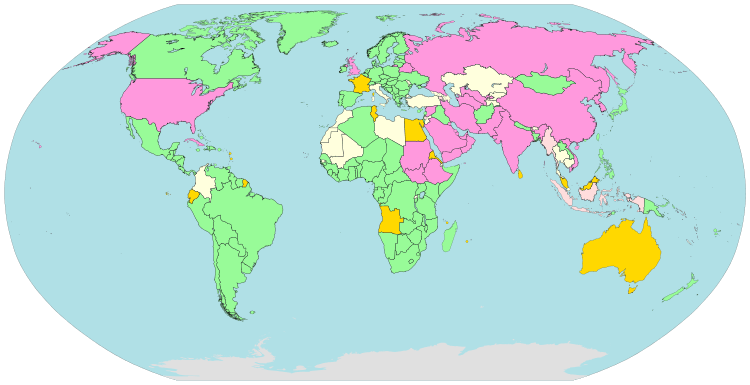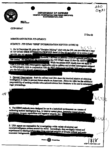Internet censorship and surveillance by country
This list of Internet censorship and surveillance by country provides information on the types and levels of Internet censorship and surveillance that is occurring in countries around the world.
Classifications
Detailed country by country information on Internet censorship and surveillance is provided in the Freedom on the Net reports from Freedom House, by the OpenNet Initiative, by Reporters Without Borders, and in the Country Reports on Human Rights Practices from the U.S. State Department Bureau of Democracy, Human Rights, and Labor. The ratings produced by several of these organizations are summarized below as well as in the Censorship by country article.
Freedom on the Net reports
Freedom House has produced five editions of its report Freedom on the Net. The first in 2009 surveyed 15 countries,[5] the second in 2011 surveyed 37 countries,[6] the third in 2012 surveyed 47 countries,[7] the fourth in 2013 surveyed 60 countries,[8] and the fifth in 2014 and sixth in 2015 each surveyed 65 countries.[9][10]
Freedom on the Net provides analytical reports and numerical ratings regarding the state of Internet freedom for countries worldwide.[9] The reports are based on surveys that ask a set of questions designed to measure each country’s level of Internet and digital media freedom, as well as the access and openness of other digital means of transmitting information, particularly mobile phones and text messaging services. Results are presented for three areas:
- Obstacles to Access: infrastructural and economic barriers to access; governmental efforts to block specific applications or technologies; legal and ownership control over internet and mobile phone access providers.
- Limits on Content: filtering and blocking of websites; other forms of censorship and self-censorship; manipulation of content; the diversity of online news media; and usage of digital media for social and political activism.
- Violations of User Rights: legal protections and restrictions on online activity; surveillance and limits on privacy; and repercussions for online activity, such as legal prosecution, imprisonment, physical attacks, or other forms of harassment.
The results from the three areas are combined into a total score for a country (from 0 for best to 100 for worst) and countries are rated as "free" (0 to 30), "partly free" (31 to 60), or "not free" (61 to 100) based on the totals.
Freedom on the Net Survey Results 2009[5] 2011[6] 2012[7] 2013[8] 2014[9] 2015[10] Countries 15 37 47 60 65 65 Free 4 (27%) 8 (22%) 14 (30%) 17 (29%) 19 (29%) 18 (28%) Partly free 7 (47%) 18 (49%) 20 (43%) 29 (48%) 31 (48%) 28 (43%) Not free 4 (27%) 11 (30%) 13 (28%) 14 (23%) 15 (23%) 19 (29%) Improved n/a 5 (33%) 11 (31%) 12 (26%) 12 (18%) 15 (23%) Declined n/a 9 (60%) 17 (47%) 28 (60%) 36 (55%) 32 (49%) No change n/a 1 (7%) 8 (22%) 7 (15%) 17 (26%) 18 (28%)
In addition the 2012 report identified seven countries that were at particular risk of suffering setbacks related to Internet freedom in late 2012 and in 2013: Azerbaijan, Libya, Malaysia, Pakistan, Rwanda, Russia, and Sri Lanka. At the time the Internet in most of these countries was a relatively open and unconstrained space for free expression, but the countries also typically featured a repressive environment for traditional media and had recently considered or introduced legislation that would negatively affect Internet freedom.[7]
OpenNet Initiative
In a series of reports issued between 2007 and 2013 the OpenNet Initiative (ONI) classified the magnitude of censorship or filtering occurring in a country in four areas of activity.[11]
The magnitude or level of censorship was classified as follows:
- Pervasive: A large portion of content in several categories is blocked.
- Substantial: A number of categories are subject to a medium level of filtering or many categories are subject to a low level of filtering.
- Selective: A small number of specific sites are blocked or filtering targets a small number of categories or issues.
- Suspected: It is suspected, but not confirmed, that Web sites are being blocked.
- No evidence: No evidence of blocked Web sites, although other forms of controls may exist.
The classifications were done for the following areas of activity:
- Political: Views and information in opposition to those of the current government or related to human rights, freedom of expression, minority rights, and religious movements.
- Social: Views and information perceived as offensive or as socially sensitive, often related to sexuality, gambling, or illegal drugs and alcohol.
- Conflict/security: Views and information related to armed conflicts, border disputes, separatist movements, and militant groups.
- Internet tools: e-mail, Internet hosting, search, translation, and Voice-over Internet Protocol (VoIP) services, and censorship or filtering circumvention methods.
Due to legal concerns the OpenNet Initiative does not check for filtering of child pornography and because their classifications focus on technical filtering, they do not include other types of censorship.
Through 2010 the OpenNet Initiative had documented Internet filtering by governments in over forty countries worldwide.[12] The level of filtering was classified in 26 countries in 2007 and in 25 countries in 2009. Of the 41 separate countries classified in these two years, seven were found to show no evidence of filtering (Egypt, France, Germany, India, Ukraine, the United Kingdom, and the United States), while one was found to engage in pervasive filtering in all areas (China), 13 were found to engage in pervasive filtering in one or more areas, and 34 were found to engage in some level of filtering in one or more areas. Of the 10 countries classified in both 2007 and 2009, one reduced its level of filtering (Pakistan), five increased their level of filtering (Azerbaijan, Belarus, Kazakhstan, South Korea, and Uzbekistan), and four maintained the same level of filtering (China, Iran, Myanmar, and Tajikistan).[13]
In December 2014 ONI announced that:[14]
- After a decade of collaboration in the study and documentation of Internet filtering and control mechanisms around the world, the OpenNet Initiative partners will no longer carry out research under the ONI banner. The ONI website, including all reports and data, will be maintained indefinitely to allow continued public access to their entire archive of published work and data.
ONI's summarized global Internet filtering data was last updated on 20 September 2013.
Reporters Without Borders
RWB Enemies of the Internet and Countries under Surveillance lists
In 2006, Reporters without Borders (Reporters sans frontières, RSF), a Paris-based international non-governmental organization that advocates freedom of the press, started publishing a list of "Enemies of the Internet".[15] The organization classifies a country as an enemy of the internet because "all of these countries mark themselves out not just for their capacity to censor news and information online but also for their almost systematic repression of Internet users."[16] In 2007 a second list of countries "Under Surveillance" (originally "Under Watch") was added.[17]
|
Current Enemies of the Internet:[3][2]
Past Enemies of the Internet: |
Current Countries Under Surveillance:[3]
Past Countries Under Surveillance:
|
When the "Enemies of the Internet" list was introduced in 2006, it listed 13 countries. From 2006 to 2012 the number of countries listed fell to 10 and then rose to 12. The list was not updated in 2013. In 2014 the list grew to 19 with an increased emphasis on surveillance in addition to censorship. The list was not updated in 2015.
When the "Countries under surveillance" list was introduced in 2008, it listed 10 countries. Between 2008 and 2012 the number of countries listed grew to 16 and then fell to 11. The list was not updated in 2013, 2014, or 2015.
RWB Special report on Internet Surveillance
On 12 March 2013 Reporters Without Borders published a Special report on Internet Surveillance.[18] The report includes two new lists:
- a list of "State Enemies of the Internet", countries whose governments are involved in active, intrusive surveillance of news providers, resulting in grave violations of freedom of information and human rights; and
- a list of "Corporate Enemies of the Internet", companies that sell products that are liable to be used by governments to violate human rights and freedom of information.
The five "State Enemies of the Internet" named in March 2013 are: Bahrain, China, Iran, Syria, and Vietnam.[18]
The five "Corporate Enemies of the Internet" named in March 2013 are: Amesys (France), Blue Coat Systems (U.S.), Gamma (UK and Germany), Hacking Team (Italy), and Trovicor (Germany).[18]
Country Reports on Human Rights Practices
Country Reports on Human Rights Practices is an annual series of reports on human rights conditions in countries throughout the world. Among other topics the reports include information on freedom of speech and the press including Internet freedom; freedom of assembly and association; and arbitrary interference with privacy, family, home, or correspondence.[19]
The reports are prepared by the Bureau of Democracy, Human Rights, and Labor within the United States Department of State. The reports cover internationally recognized individual, civil, political, and worker rights, as set forth in the Universal Declaration of Human Rights. The first report was issued in 1977 covering the year 1976.[20]
Alphabetical index to classifications
Country classifications
| Part of a series on |
| Mass surveillance |
|---|
| By location |
The level of Internet censorship and surveillance in a country is classified in one of the four categories: pervasive, substantial, selective, and little or no censorship or surveillance. The classifications are based on the classifications and ratings from the Freedom on the Net reports by Freedom House supplemented with information from the OpenNet Initiative (ONI), Reporters Without Borders (RWB), and the Country Reports on Human Rights Practices by the U.S. State Department Bureau of Democracy, Human Rights, and Labor.
Pervasive censorship or surveillance
A country is classified as engaged in pervasive censorship or surveillance when it often censors political, social, and other content, is engaged in mass surveillance of the Internet, and retaliates against citizens who circumvent censorship or surveillance with imprisonment or other sanctions. A country is included in the "pervasive" category when it:
- is rated as "not free" with a total score of 71 to 100 in the Freedom on the Net (FOTN) report from Freedom House,
- is rated "not free" in FOTN or is not rated in FOTN and
- is included on the "Internet enemies" list from Reporters Without Borders,[15] or
- when the OpenNet Initiative categorizes the level of Internet filtering as pervasive in any of the four areas (political, social, conflict/security, and Internet tools) for which they test.
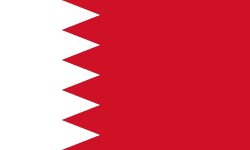 Bahrain
Bahrain
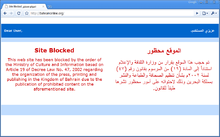
- Rated "not free" by Freedom House in Freedom on the Net in 2011 (score 62), 2012 (score 71), 2013 (score 72), 2014 (score 74), and 2015 (score 72).[21][22][23][24][25]
- Listed as pervasive in the political and social areas, as substantial in Internet tools, and as selective in conflict/security by ONI in August 2009.[11]
- Listed as an Enemy of the Internet by RWB in 2012.[3]
- Listed as a State Enemy of the Internet by RWB in 2013 for involvement in active, intrusive surveillance of news providers, resulting in grave violations of freedom of information and human rights.[18]
Bahrain enforces an effective news blackout using an array of repressive measures, including keeping the international media away, harassing human rights activists, arresting bloggers and other online activists (one of whom died in detention), prosecuting free speech activists, and disrupting communications, especially during major demonstrations.[3]
On 5 January 2009 the Ministry of Culture and Information issued an order (Resolution No 1 of 2009)[26] pursuant to the Telecommunications Law and Press and Publications Law of Bahrain that regulates the blocking and unblocking of websites. This resolution requires all ISPs – among other things – to procure and install a website blocking software solution chosen by the Ministry. The Telecommunications Regulatory Authority ("TRA") assisted the Ministry of Culture and Information in the execution of the said Resolution by coordinating the procurement of the unified website blocking software solution. This software solution is operated solely by the Ministry of Information and Culture and neither the TRA nor ISPs have any control over sites that are blocked or unblocked.
 Belarus
Belarus
- Rated "not free" by Freedom House in Freedom on the Net in 2011 (score 69), 2012 (score 69), 2013 (score 67), 2014 (score 62), and 2015 (score 64).[27][28][29][30][31]
- Listed as selective in the political, social, conflict/security and Internet tools areas by ONI in November 2010.[11]
- Listed as an Internet enemy by RWB in 2012.[3]
The Internet in Belarus, as a space used for circulating information and mobilizing protests, has been hard hit as the authorities increased the list of blocked websites and partially blocked the Internet during protests. As a way to limit coverage of demonstrations some Internet users and bloggers have been arrested and others have been invited to “preventive conversations” with the police. Law No. 317-3, which took effect on 6 January 2012, reinforced Internet surveillance and control measures.[3]
The Belarus government has moved to second- and third-generation controls to manage its national information space. Control over the Internet is centralized with the government-owned Beltelecom managing the country’s Internet gateway. Regulation is heavy with strong state involvement in the telecommunications and media market. Most users who post online media practice a degree of self-censorship prompted by fears of regulatory prosecution. The president has established a strong and elaborate information security policy and has declared his intention to exercise strict control over the Internet under the pretext of national security. The political climate is repressive and opposition leaders and independent journalists are frequently detained and prosecuted.[32]
 China
China
- Rated "not free" in Freedom on the Net by Freedom House in 2009 (score 79), 2011 (score 83), 2012 (score 85), 2013 (score 86), 2014 (score 87), and 2015 (score 88).[33][34][35][36][37][38]
- Listed as pervasive in the political and conflict/security areas and as substantial in social and Internet tools by ONI in June 2009 and August 2012.[11]
- Listed as an Enemy of the Internet by RWB since 2008.[3]
- Listed as a State Enemy of the Internet by RWB in 2013 for involvement in active, intrusive surveillance of news providers, resulting in grave violations of freedom of information and human rights.[18]
Internet censorship in China is among the most stringent in the world. The government blocks Web sites that discuss Tibetan independence and the Dalai Lama, Taiwan independence, police brutality, the Tiananmen Square protests of 1989, freedom of speech, pornography, some international news sources and propaganda outlets (such as the VOA), certain religious movements (such as Falun Gong), and many blogging websites.[39] At the end of 2007 51 cyber dissidents were reportedly imprisoned in China for their online postings.[40] According to Human Rights Watch, in China the government also continues to violate domestic and international legal guarantees of freedom of press and expression by restricting bloggers, journalists, and an estimated more than 500 million Internet users. The government requires Internet search firms and state media to censor issues deemed officially “sensitive", and blocks access to foreign websites including Facebook, Twitter, and YouTube. However, the rise of Chinese online social networks—in particularly Sina’s Weibo, which has 200 million users—has created a new platform for citizens to express opinions and to challenge official limitations on freedom of speech despite intense scrutiny by China’s censors.[41]
 Cuba
Cuba
- Rated "not free" in Freedom on the Net by Freedom House in 2009 (score 88), 2011 (score 87), 2012 (score 86), 2013 (score 86), 2014 (score 84), and 2015 (score 81).[42][43][44][45][46][47]
- Listed as an Internet enemy by RWB in 2011.[3]
- Not categorized by ONI due to lack of data.
Cuba has the lowest ratio of computers per inhabitant in Latin America, and the lowest internet access ratio of all the Western hemisphere.[48] Citizens have to use government controlled "access points", where their activity is monitored through IP blocking, keyword filtering and browsing history checking. The government cites its citizens' access to internet services are limited due to high costs and the American embargo, but there are reports concerning the will of the government to control access to uncensored information both from and to the outer world.[49] The Cuban government continues to imprison independent journalists for contributing reports through the Internet to web sites outside of Cuba.[50]
Even with the lack of precise figures due to the secretive nature of the regime, testimonials from independent bloggers, activists, and international watchers support the view that it is difficult for most people to access the web and that harsh punishments for individuals that do not follow government policies are the norm.[51][52] The Committee to Protect Journalists has pointed to Cuba as one of the ten most censored countries around the world.[53]
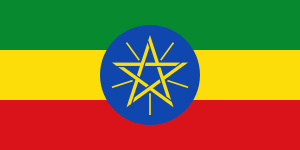 Ethiopia
Ethiopia
- Rated "not free" in Freedom on the Net by Freedom House in 2011 (score 69), 2012 (score 75), 2013 (score 79), 2014 (score 80), and 2015 (score 82).[54][55][56][57][58]
- Listed as pervasive in the political, as no evidence in social, and selective in the conflict/security and Internet tools areas by ONI in October 2012.[1]
Ethiopia remains a highly restrictive environment in which to express political dissent online. The government of Ethiopia has long filtered critical and oppositional political content. Anti-terrorism legislation is frequently used to target online speech, including in the recent conviction of a dozen individuals, many of whom were tried based on their online writings. OpenNet Initiative (ONI) testing conducted in Ethiopia in September 2012 found that online political and news content continues to be blocked, including the blogs and websites of a number of recently convicted individuals.[59]
Ethiopia has implemented a largely political filtering regime that blocks access to popular blogs and the Web sites of many news organizations, dissident political parties, and human rights groups. However, much of the media content that the government is attempting to censor can be found on sites that are not banned. The authors of the blocked blogs have in many cases continued to write for an international audience, apparently without sanction. However, Ethiopia is increasingly jailing journalists, and the government has shown a growing propensity toward repressive behavior both off- and online. Censorship is likely to become more extensive as Internet access expands across the country.[60]
 Iran
Iran
- Rated "not free" in the Freedom on the Net report from Freedom House in 2009 (76 score), 2011 (89 score), 2012 (90 score), 2013 (91 score), 2014 (89 score), and 2015 (87 score).[61][62][63][64][65][66]
- Listed as pervasive in the political, social, and Internet tools areas and as substantial in conflict/security by ONI in June 2009.[11]
- Listed as an Enemy of the Internet by RWB in 2011.[3]
- Listed as a State Enemy of the Internet by RWB in 2013 for involvement in active, intrusive surveillance of news providers, resulting in grave violations of freedom of information and human rights.[18]
The Islamic Republic of Iran continues to expand and consolidate its technical filtering system, which is among the most extensive in the world. A centralized system for Internet filtering has been implemented that augments the filtering conducted at the Internet service provider (ISP) level.[67] Filtering targets content critical of the government, religion, pornographic websites, political blogs, and women's rights websites, weblogs, and online magazines.[68][69] Bloggers in Iran have been imprisoned for their Internet activities.[70] The Iranian government temporarily blocked access, between 12 May 2006 and January 2009, to video-upload sites such as YouTube.com.[71] Flickr, which was blocked for almost the same amount of time was opened in February 2009. But after 2009 election protests YouTube, Flickr, Twitter, Facebook and many more websites were blocked indefinitely.[72]
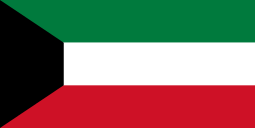 Kuwait
Kuwait
- Listed as pervasive in the social and Internet tools areas and as selective in political and conflict/security by ONI in June 2009.[11]
The primary target of Internet filtering is pornography and, to a lesser extent, gay and lesbian content.[73] The Kuwait Ministry of Communication regulates ISPs, making them block pornographic, anti-religion, anti-tradition, and anti-security websites.[74] Both private ISPs and the government take actions to filter the Internet.[75][76]
The Kuwait Institute for Scientific Research (KISR) operates the Domain Name System in Kuwait and does not register domain names which are "injurious to public order or to public sensibilities or otherwise do not comply with the laws of Kuwait".[77] VoIP is legal in Kuwait, and Zain, one of the mobile operators, started testing VoLTE in Kuwait.[78]
 North Korea
North Korea
North Korea is cut off from the Internet, much as it is from other areas with respect to the world. Only a few hundred thousand citizens in North Korea, representing about 4% of the total population, have access to the Internet, which is heavily censored by the national government.[80] According to the RWB, North Korea is a prime example where all mediums of communication are controlled by the government. According to the RWB, the Internet is used by the North Korean government primarily to spread propaganda. The North Korean network is monitored heavily. All websites are under government control, as is all other media in North Korea.[81]
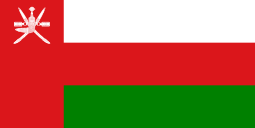 Oman
Oman
- Listed as pervasive in the social area, as substantial in Internet tools, selective in political, and as no evidence in conflict/security by ONI in August 2009.[11]
Oman engages in extensive filtering of pornographic Web sites, gay and lesbian content, content that is critical of Islam, content about illegal drugs, and anonymizer sites used to circumvent blocking. There is no evidence of technical filtering of political content, but laws and regulations restrict free expression online and encourage self-censorship.[82]
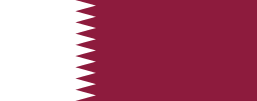 Qatar
Qatar
- Listed as pervasive in the social and Internet tools areas and selective in political and conflict/security by ONI in August 2009.[11]
Qatar is the second most connected country in the Arab region, but Internet users have heavily censored access to the Internet. Qatar filters pornography, political criticism of Gulf countries, gay and lesbian content, sexual health resources, dating and escort services, and privacy and circumvention tools. Political filtering is highly selective, but journalists self-censor on sensitive issues such as government policies, Islam, and the ruling family.[83]
 Saudi Arabia
Saudi Arabia

- Rated "not free" by Freedom House in Freedom on the Net in 2011 (score 70), 2012 (score 71), 2013 (score 70), 2014 (score 72), and 2015 (score 73).[84][85][86][87][88]
- Listed as pervasive in the social and Internet tools areas, as substantial in political, and as selective in conflict/security by ONI in August 2009.[11]
- Listed as an Internet enemy by RWB in 2011.[3]
Saudi Arabia directs all international Internet traffic through a proxy run by the CITC. Content filtering is implemented there using software by Secure Computing.[89] Additionally, a number of sites are blocked according to two lists maintained by the Internet Services Unit (ISU):[90] one containing "immoral" (mostly pornographic) sites, the other based on directions from a security committee run by the Ministry of Interior (including sites critical of the Saudi government). Citizens are encouraged to actively report "immoral" sites for blocking, using a provided Web form. Many Wikipedia articles in different languages have been included in the censorship of "immoral" content in Saudi Arabia. The legal basis for content-filtering is the resolution by Council of Ministers dated 12 February 2001.[91] According to a study carried out in 2004 by the OpenNet Initiative: "The most aggressive censorship focused on pornography, drug use, gambling, religious conversion of Muslims, and filtering circumvention tools."[89]
 Syria
Syria
- Rated "not free" in Freedom on the Net by Freedom House in 2012 (score 83), 2013 (score 85), 2014 (score 88), and 2015 (score 87).[92][93][94][95]
- Listed as pervasive in the political and Internet tools areas, and as selective in social and conflict/security by ONI in August 2009.[11]
- Listed as an Enemy of the Internet by RWB in 2011.[3]
- Listed as a State Enemy of the Internet by RWB in 2013 for involvement in active, intrusive surveillance of news providers, resulting in grave violations of freedom of information and human rights.[18]
Syria has banned websites for political reasons and arrested people accessing them. In addition to filtering a wide range of Web content, the Syrian government monitors Internet use very closely and has detained citizens "for expressing their opinions or reporting information online." Vague and broadly worded laws invite government abuse and have prompted Internet users to engage in self-censoring and self-monitoring to avoid the state's ambiguous grounds for arrest.[68][96]
During the Syrian civil war Internet connectivity between Syria and the outside world shut down in late November 2011[97] and again in early May 2013.[98]
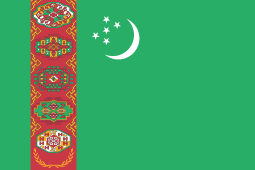 Turkmenistan
Turkmenistan
- Listed as pervasive in the political area and as selective in social, conflict/security, and Internet tools by ONI in December 2010.[11]
- Listed as an Internet enemy by RWB in 2011.[3]
Internet usage in Turkmenistan is under tight control of the government. Turkmen got their news through satellite television until 2008 when the government decided to get rid of satellites, leaving Internet as the only medium where information could be gathered. The Internet is monitored thoroughly by the government and websites run by human rights organizations and news agencies are blocked. Attempts to get around this censorship can lead to grave consequences.[99]
 United Arab Emirates
United Arab Emirates
- Rated "not free" by Freedom House in Freedom on the Net in 2013 (score 66), 2014 (score 67), and 2015 (score 68).[100][101][102]
- Listed as pervasive in the social and Internet tools areas, as substantial in political, and as selective in conflict/security by ONI in August 2009.[11]
- Listed as Under Surveillance by RWB in 2011.[3]
The United Arab Emirates forcibly censors the Internet using Secure Computing's solution. The nation's ISPs Etisalat and du (telco) ban pornography, politically sensitive material, all Israeli domains,[103] and anything against the perceived moral values of the UAE. All or most VoIP services are blocked. The Emirates Discussion Forum (Arabic: منتدى الحوار الإماراتي), or simply uaehewar.net, has been subjected to multiple censorship actions by UAE authorities.[104]
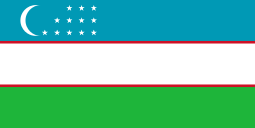 Uzbekistan
Uzbekistan
- Rated "not free" in Freedom on the Net from Freedom House in 2012 (score 77), 2013 (score 78), 2014 (score 79), and 2015 (score 78).[105][106][107][108]
- Uzbekistan has been listed as an Internet enemy by Reporters Without Borders since the list was created in 2006.[3]
- The OpenNet Initiative found evidence that Internet filtering was pervasive in the political area and selective in the social, conflict/security, and Internet tools areas during testing that was reported in 2008 and 2010.[1][11]
Uzbekistan maintains the most extensive and pervasive filtering system among the CIS countries. It prevents access to websites regarding banned Islamic movements, independent media, NGOs, material critical of the government's human rights violations, discussion of the events in Egypt, Tunisia, and Bahrain, and news about demonstrations and protest movements.[68] Contributors to online discussion of the events in Egypt, Tunisia, and Bahrain have been arrested.[109] Some Internet cafes in the capital have posted warnings that users will be fined for viewing pornographic websites or website containing banned political material.[110] The main VoIP protocols SIP and IAX used to be blocked for individual users; however, as of July 2010, blocks were no longer in place. Facebook was blocked for few days in 2010.[111]
 Vietnam
Vietnam
- Rated "not free" by Freedom House in Freedom on the Net in 2011 (score 73), 2012 (score 73), 2013 (score 75), 2014 (score 76), and 2015 (score 76).[112][113][114][115][116]
- Classified by ONI as pervasive in the political, as substantial in the Internet tools, and as selective in the social and conflict/security areas in 2011.[1][11]
- Listed as an Enemy of the Internet by RWB in 2011.[3]
- Listed as a State Enemy of the Internet by RWB in 2013 for involvement in active, intrusive surveillance of news providers, resulting in grave violations of freedom of information and human rights.[18]
The main networks in Vietnam prevent access to websites critical of the Vietnamese government, expatriate political parties, and international human rights organizations, among others.[68] Online police reportedly monitor Internet cafes and cyber dissidents have been imprisoned for advocating democracy.[117]
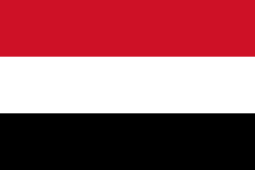 Yemen
Yemen
- Listed as pervasive in the social area, as substantial in political and Internet tools, and as selective in the conflict/security area by ONI in October 2012.[1]
- Listed as Under Surveillance by RWB in 2008 and 2009, but not in 2010 or 2011.[3]
Yemen censors pornography, nudity, gay and lesbian content, escort and dating services, sites displaying provocative attire, Web sites which present critical reviews of Islam and/or attempt to convert Muslims to other religions, or content related to alcohol, gambling, and drugs.[118]
Yemen’s Ministry of Information declared in April 2008 that the penal code will be used to prosecute writers who publish Internet content that "incites hatred" or "harms national interests".[119] Yemen's two ISPs, YemenNet and TeleYemen, block access to gambling, adult, sex education, and some religious content.[68] The ISP TeleYemen (aka Y.Net) prohibits "sending any message which is offensive on moral, religious, communal, or political grounds" and will report "any use or attempted use of the Y.Net service which contravenes any applicable Law of the Republic of Yemen". TeleYemen reserves the right to control access to data stored in its system “in any manner deemed appropriate by TeleYemen.”[120]
In Yemen closed rooms or curtains that might obstruct views of the monitors are not allowed in Internet cafés, computer screens in Internet cafés must be visible to the floor supervisor, police have ordered some Internet cafés to close at midnight, and demanded that users show their identification cards to the café operator.[121]
Substantial censorship or surveillance
Countries included in this classification are engaged in substantial Internet censorship and surveillance. This includes countries where a number of categories are subject to a medium level of filtering or many categories are subject to a low level of filtering. A country is included in the "substantial" category when it:
- is not included in the "pervasive" category, and
- is rated as "not free" in the Freedom on the Net (FOTN) report from Freedom House, or
- is rated "partly free" or is not rated in FOTN, and
- is included on the "Internet enemies" list from Reporters Without Borders,[15] or
- when the OpenNet Initiative categorizes the level of Internet filtering as pervasive or substantial in any of the four areas (political, social, conflict/security, and Internet tools) for which they test.
 Burma
Burma
- Rated "not free" by Freedom House in Freedom on the Net in 2011 (score 88), 2012 (score 75), and 2013 (score 62), as "partly free" in 2014 (score 60), and "not free" in 2015 (score 63).[122][123][124][125][126]
- Listed as selective in the political and Internet tools areas, as substantial in social, and as no evidence of filtering in conflict/security by ONI in August 2012.[1][127]
- Listed as an Internet enemy by RWB from 2006 to 2013.[3]
Beginning in September 2012, after years spent as one of the world’s most strictly controlled information environments, the government of Burma (Myanmar) began to open up access to previously censored online content. Independent and foreign news sites, oppositional political content, and sites with content relating to human rights and political reform—all previously blocked—became accessible. In August 2012, the Burmese Press Scrutiny and Registration Department announced that all pre-publication censorship of the press was to be discontinued, such that articles dealing with religion and politics would no longer require review by the government before publication.[128]
Restrictions on content deemed harmful to state security remain in place. Pornography is still widely blocked, as is content relating to alcohol and drugs, gambling websites, online dating sites, sex education, gay and lesbian content, and web censorship circumvention tools. In 2012 almost all of the previously blocked websites of opposition political parties, critical political content, and independent news sites were accessible, with only 5 of 541 tested URLs categorized as political content blocked.[128]
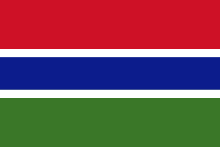 Gambia
Gambia
- Rated "not free" by Freedom House in Freedom on the Net in 2014 (score 65) and 2015 (score 65).[129][130]
- Not individually classified by ONI,[11] but classified as selective based on the limited descriptions in the ONI profile for the sub-Saharan Africa region.[131]
There are no government restrictions on access to the Internet or reports that the government monitors e-mail or Internet chat rooms without appropriate legal authority. Individuals and groups can generally engage in the peaceful expression of views via the Internet, including by e-mail. However, Internet users reported they could not access the Web sites of foreign online newspapers Freedom, The Gambia Echo, Hellogambia, and Jollofnews, which criticized the government.[132]
The constitution and law provide for freedom of speech and press; however, the government restricted these rights. According to the Observatory for the Protection of Human Rights Defenders, "the environment for independent and opposition media remained hostile, with numerous obstacles to freedom of expression, including administrative hurdles, arbitrary arrest and detention, intimidation and judicial harassment against journalists, and the closure of media outlets, leading to self-censorship." Individuals who publicly or privately criticized the government or the president risked government reprisal. In March 2011 President Jammeh warned independent journalists that he would “not compromise or sacrifice the peace, security, stability, dignity, and the well-being of Gambians for the sake of freedom of expression.” Accusing some journalists of being the “mouthpiece of opposition parties", he vowed to prosecute any journalist who offended him. The National Intelligence Agency (NIA) was involved in arbitrary closure of media outlets and the extrajudicial detention of journalists.[132]
In 2007 a Gambian journalist living in the US was convicted of sedition for an article published online; she was fined USD12,000;[133] in 2006 the Gambian police ordered all subscribers to an online independent newspaper to report to the police or face arrest.[134]
The constitution and law prohibit arbitrary interference with privacy, family, home, or correspondence, but the government does not respect these prohibitions. Observers believe the government monitors citizens engaged in activities that it deems objectionable.[132]
 Indonesia
Indonesia
- Indonesia was rated "partly free" in Freedom on the Net in 2011 (score 46), 2012 (score 42), 2013 (score 41), 2014 (score 42), and 2015 (score 42).[135][136][137][138][139]
- Listed as substantial in the social area, as selective in the political and Internet tools areas, and as no evidence of filtering in the conflict/security area by ONI in 2011 based on testing done during 2009 and 2010. Testing also showed that Internet filtering in Indonesia is unsystematic and inconsistent, illustrated by the differences found in the level of filtering between ISPs.[140]
Although the government of Indonesia holds a positive view about the Internet as a means for economic development, it has become increasingly concerned over the effect of access to information and has demonstrated an interest in increasing its control over offensive online content, particularly pornographic and anti-Islamic online content. The government regulates such content through legal and regulatory frameworks and through partnerships with ISPs and Internet cafés.[140]
 Pakistan
Pakistan
- Rated "partly free" by Freedom House in Freedom on the Net in 2011 (score 55) and as "not free" in 2012 (score 63), 2013 (score 67), 2014 (score 69), and 2015 (score 69).[141][142][143][144][145]
- Listed as substantial in the conflict/security and as selective in the political, social, and Internet tools areas by ONI in 2011.[1][11]
- Listed as an Internet Enemy by RWB in 2014.[2]
Pakistanis currently have free access to a wide range of Internet content, including most sexual, political, social, and religious sites on the Internet. Internet filtering remains both inconsistent and intermittent. Although the majority of filtering in Pakistan is intermittent—such as the occasional block on a major Web site like Blogspot or YouTube—the Pakistan Telecommunication Authority (PTA) continues to block sites containing content it considers to be blasphemous, anti-Islamic, or threatening to internal security. Pakistan has blocked access to websites critical of the government.[146]
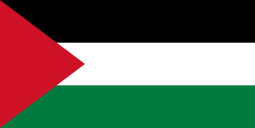 Palestinian territories
Palestinian territories
- Listed as substantial in the social area and as no evidence in political, conflict/security, and Internet tools by ONI in August 2009.[11]
Access to Internet in the Palestinian territories remains relatively open, although social filtering of sexually explicit content has been implemented in Palestine. Internet in the West Bank remains almost entirely unfiltered, save for a single news Web site that was banned for roughly six months starting in late 2008. Media freedom is constrained in Palestine and the West Bank by the political upheaval and internal conflict as well as by the Israeli forces.[147]
 Russia
Russia
- Rated "partly free" by Freedom House in Freedom on the Net in 2009 (score 49), 2011 (score 52), 2012 (score 52), 2013 (score 54), and 2014 (score 60) and as "not free" in 2015 (score 62).[148][149][150][151][152][153]
- Listed as selective in the political and social areas and as no evidence in conflict/security and Internet tools by ONI in December 2010.[11]
- Listed as under surveillance by RWB from 2010 to 2013.[3]
- Listed as an Internet Enemy by RWB in 2014.[2]
- The absence of overt state-mandated Internet filtering in Russia before 2012 had led some observers to conclude that the Russian Internet represents an open and uncontested space. In fact, the Russian government actively competes in Russian cyberspace employing second- and third-generation strategies as a means to shape the national information space and promote pro-government political messages and strategies. This approach is consistent with the government’s strategic view of cyberspace that is articulated in strategies such as the doctrine of information security. The DoS attacks against Estonia (May 2007) and Georgia (August 2008) may be an indication of the government’s active interest in mobilizing and shaping activities in Russian cyberspace.[154]
In July 2012, the Russian State Duma passed the Bill 89417-6 which created a blacklist of Internet sites containing alleged child pornography, drug-related material, extremist material, and other content illegal in Russia.[155][156] The Russian Internet blacklist was officially launched in November 2012, despite criticism by major websites and NGOs.[157]
 South Korea
South Korea
- Rated "partly free" in Freedom on the Net by Freedom House in 2011 (score 32), 2012 (score 34), 2013 (score 32), 2014 (score 33), and 2015 (score 34).[158][159][160][161][162]
- Listed as pervasive in the conflict/security area, as selective in social, and as no evidence in political and Internet tools by ONI in 2011.[1][11]
- Listed as Under Surveillance by RWB in 2011.[3]
South Korea is a world leader in Internet and broadband penetration, but its citizens do not have access to a free and unfiltered Internet. South Korea’s government maintains a wide-ranging approach toward the regulation of specific online content and imposes a substantial level of censorship on elections-related discourse and on a large number of Web sites that the government deems subversive or socially harmful.[163] The policies are particularly strong toward suppressing anonymity in the Korean internet.
In 2007, numerous bloggers were censored and their posts deleted by police for expressing criticism of, or even support for, presidential candidates. This even led to some bloggers being arrested by the police.[164]
South Korea uses IP address blocking to ban web sites considered sympathetic to North Korea.[68][165] Illegal websites, such as those offering unrated games, file sharing, pornography, and gambling, are also blocked. Any attempts to bypass this is enforced with the "three-strikes" program.
 Sudan
Sudan
- Rated "not free" by Freedom House in Freedom on the Net in 2013 (score 63), 2014 (score 65), and 2015 (score 65).[166][167][168]
- Listed as substantial in the social and Internet tools areas and as selective in political, and as no evidence in conflict/security by ONI in August 2009.[11]
- Listed as an Internet Enemy by RWB in 2014.[2]
Sudan openly acknowledges filtering content that transgresses public morality and ethics or threatens order. The state's regulatory authority has established a special unit to monitor and implement filtration; this primarily targets pornography and, to a lesser extent, gay and lesbian content, dating sites, provocative attire, and many anonymizer and proxy Web sites.[169]
 Thailand
Thailand
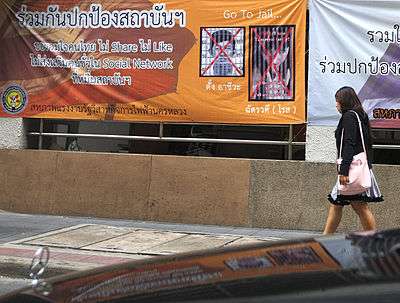
- Rated "not free" in Freedom on the Net by Freedom House in 2011-2012 (scores 61 and 61) and 2014-2015 (scores 62 and 63).[170][171][172][173] Freedom House listed Thailand as "partly free" in 2013 (score 60), due partially to improvements in access to the Internet.[174]
- Listed as selective in political, social, and Internet tools and as no evidence in conflict/security by ONI in 2011.[1][11]
- Listed as Under Surveillance by RWB in 2011.[3]
Prior to the September 2006 military coup d'état most Internet censorship in Thailand was focused on blocking pornographic websites. The following years have seen a constant stream of sometimes violent protests, regional unrest,[175] emergency decrees,[176] a new cybercrimes law,[177] and an updated Internal Security Act.[178] And year by year Internet censorship has grown, with its focus shifting to lèse majesté, national security, and political issues. Estimates put the number of websites blocked at over 110,000 and growing in 2010.[179]
Reasons for blocking:
Prior to
2006[180]
2010[181]
Reason11% 77% lèse majesté content (content that defames, insults, threatens, or is unflattering to the King, includes national security and some political issues) 60% 22% pornographic content 2% <1% content related to gambling 27% <1% copyright infringement, illegal products and services, illegal drugs, sales of sex equipment, prostitution, …
According to the Associated Press, the Computer Crime Act has contributed to a sharp increase in the number of lèse majesté cases tried each year in Thailand.[182] While between 1990 and 2005, roughly five cases were tried in Thai courts each year, since that time about 400 cases have come to trial—a 1,500 percent increase.[182]
Selective censorship or surveillance
Countries included in this classification were found to practice selective Internet censorship and surveillance. This includes countries where a small number of specific sites are blocked or censorship targets a small number of categories or issues. A country is included in the "selective" category when it:
- is not included in the "pervasive" or "substantial" categories, and
- is rated as "partly free" in the Freedom on the Net (FOTN) report from Freedom House, or
- is included on the "Internet enemies" list from Reporters Without Borders,[15] or
- is not rated in FOTN and the OpenNet Initiative categorizes the level of Internet filtering as selective in any of the four areas (political, social, conflict/security, and Internet tools) for which they test.
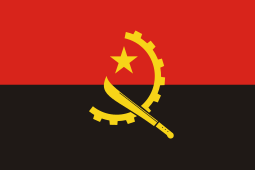 Angola
Angola
- Rated "partly free" by Freedom House in Freedom on the Net in 2013 (score 34), 2014 (score 38), and 2015 (score 39).[183][184][185]
- Angola is not individually classified by ONI[1] and does not appear on the RWB lists.[3]
There are no government restrictions on access to the Internet or credible reports that the government monitors e-mail or chat rooms without judicial oversight.[186] And aside from child pornography and copyrighted material, the government does not block or filter Internet content and there are no restrictions on the type of information that can be exchanged. Social media and communications apps such as YouTube, Facebook, Twitter, and international blog-hosting services are all freely available.[183]
Censorship of traditional news and information sources is common, leading to worries that similar efforts to control online information will eventually emerge. Defamation, libel, and insulting the country or president in "public meetings or by disseminating words, images, writings, or sound" are crimes punishable by imprisonment. A proposed "Law to Combat Crime in the Area of Information Technologies and Communication" was introduced by the National Assembly in March 2011. Often referred to as the cybercrime bill, the law was ultimately withdrawn in May 2011 as a result of international pressure and vocal objections from civil society. However, the government publicly stated that similar clauses regarding cybercrimes will be incorporated into an ongoing revision of the penal code, leaving open the possibility of Internet-specific restrictions becoming law in the future.[183]
An April 2013 news report claimed that state security services were planning to implement electronic monitoring that could track email and other digital communications.[187] In March 2014, corroborating information from military sources was found, affirming that a German company had assisted the Angolan military intelligence in installing a monitoring system at the BATOPE base around September 2013. There was also evidence of a major ISP hosting a spyware system.[184]
 Azerbaijan
Azerbaijan
- Rated "partly free" by Freedom House in Freedom on the Net in 2011 (score 48), 2012 (score 50), 2013 (score 52), 2014 (score 55), and 2015 (score 56).[188][189][190][191][192]
- Listed as selective in the political and social areas and as no evidence in conflict/security and Internet tools by ONI in November 2009.[11]
The Internet in Azerbaijan remains largely free from direct censorship, although there is evidence of second- and third-generation controls.[193]
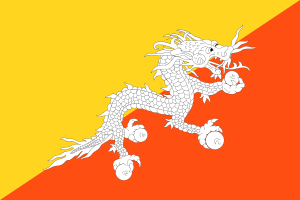 Bhutan
Bhutan
Individuals and groups are generally permitted to engage in peaceful expression of views via the Internet. Government officials state that the government does not block access, restrict content, or censor Web sites. However, Freedom House reports the government occasionally blocks access to Web sites containing pornography or information deemed offensive to the state; but that such blocked information typically does not extend to political content. In its Freedom of the Press 2012 report, Freedom House described high levels of self-censorship among media practitioners, despite few reports of official intimidation or threats.[194]
The constitution provides for freedom of speech including for members of the press, and the government generally respects these rights in practice. Citizens can publicly and privately criticize the government without reprisal. The constitution states that persons "shall not be subjected to arbitrary or unlawful interference with his or her privacy, family, home, or correspondence, nor to unlawful attacks on the person’s honor and reputation", and the government generally respects these prohibitions.[194]
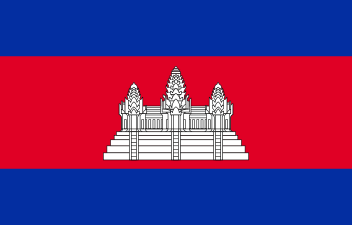 Cambodia
Cambodia
- Rated "partly free" in Freedom on the Net by Freedom House in 2013 (score 47), 2014 (score 47), and 2015 (score 48).[195][196][197]
Compared to traditional media in Cambodia, new media, including online news, social networks and personal blogs, enjoy more freedom and independence from government censorship and restrictions. However, the government does proactively block blogs and websites, either on moral grounds, or for hosting content deemed critical of the government. The government restricts access to sexually explicit content, but does not systematically censor online political discourse. Since 2011 three blogs hosted overseas have been blocked for perceived antigovernment content. In 2012, government ministries threatened to shutter internet cafes too near schools—citing moral concerns—and instituted surveillance of cafe premises and cell phone subscribers as a security measure.[198]
There are no government restrictions on access to the Internet or credible reports that the government monitors e-mail or Internet chat rooms without appropriate legal authority. During 2012 NGOs expressed concern about potential online restrictions. In February and November, the government published two circulars, which, if implemented fully, would require Internet cafes to install surveillance cameras and restrict operations within major urban centers. Activists also reported concern about a draft “cybercrimes” law, noting that it could be used to restrict online freedoms. The government maintained it would only regulate criminal activity.[199]
 Ecuador
Ecuador
- Rated "partly free" in Freedom on the Net by Freedom House in 2013 (score 37), 2014 (score 37), and 2015 (score 37).[200][201][202]
- Ecuador is not individually classified by ONI[1] and does not appear on the RWB lists.[3]
There is no widespread blocking or filtering of websites in Ecuador and access to blogs and social media platforms such as Facebook, Twitter, and YouTube is generally free and open.[203] There were no government restrictions on access to the Internet or credible reports that the government monitored e-mail or Internet chat rooms. However, on 11 July 2012 the government passed a new telecommunications regulation, requiring that Internet service providers fulfill all information requests from the superintendent of telecommunications, allowing access to client addresses and information without a judicial order.[204]
Standard defamation laws apply to content posted online. Attempts to censor statements made in times of heightened political sensitivity have been reported, as have alleged instances of censorship via the overly broad application of copyright to content critical of the government.[203]
Self-censorship of comments critical of the government is encouraged. In January 2013, for example, President Correa called for the National Secretary of Intelligence (SENAIN) to investigate two Twitter users who had published disparaging comments about him, an announcement which sent a warning to others not to post comments critical of the president. At the president’s request, two news sites La Hora and El Comercio suspended the reader comments sections of their websites. While there are no official constraints on organizing protests over the Internet, warnings from the president stating that the act of protesting will be interpreted as "an attempt to destabilize the government" have undoubtedly discouraged some from organizing and participating in protests.[203]
Ecuador’s new "Organic Law on Communications" was passed in June 2013. The law recognizes a right to communication. Media companies are required to collect and store user information. “Media lynching”, which appears to extend to any accusation of corruption or investigation of a public official—even those that are supported with evidence, is prohibited. Websites bear “ultimate responsibility” for all content they host, including content authored by third parties. The law creates a new media regulator to prohibit the dissemination of “unbalanced” information and bans non-degreed journalists from publishing, effectively outlawing much investigative reporting and citizen journalism.[203]
 Egypt
Egypt
- Rated "partly free" in Freedom on the Net by Freedom House in 2009 (score 51), 2011 (score 54), 2012 (score 59), 2013 (score 60), and 2014 (score 60); and "not free" in 2015 (score 61).[205][206][207][208][209][210]
- In August 2009 ONI found no evidence of Internet filtering in any of the four areas (political, social, conflict/security, and Internet tools).[11]
- Listed as an Internet Enemy by RWB from 2006 to 2010.
- Listed as Under Surveillance by RWB from 2011 to the present.[3]
The Internet in Egypt was not directly censored under President Hosni Mubarak, but his regime kept watch on the most critical bloggers and regularly arrested them. At the height of the uprising against the dictatorship, in late January 2011, the authorities first filtered pictures of the repression and then cut off Internet access entirely in a bid to stop the revolt spreading. The success of the 2011 Egyptian revolution offers a chance to establish greater freedom of expression in Egypt, especially online. In response to these dramatic events and opportunities, in March 2011, Reporters Without Borders moved Egypt from its "Internet enemies" list to its list of countries "under surveillance".[211]
In March 2012 Reporters Without Borders reported:[212]
The first anniversary of Egypt’s revolution was celebrated in a climate of uncertainty and tension between a contested military power, a protest movement attempting to get its second wind, and triumphant Islamists. Bloggers and netizens critical of the army have been harassed, threatened, and sometimes arrested.
The Supreme Council of the Armed Forces (SCAF), which has been leading the country since February 2011, has not only perpetuated Hosni Mubarak’s ways of controlling information, but has strengthened them.
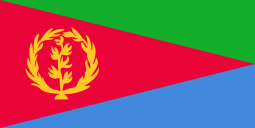 Eritrea
Eritrea
- Listed as Under Surveillance by RWB in 2008, 2009, and again from 2011 to the present.[3]
Eritrea has not set up a widespread automatic Internet filtering system, but it does not hesitate to order blocking of several diaspora websites critical of the regime. Access to these sites is blocked by two of the Internet service providers, Erson and Ewan, as are pornographic websites and YouTube. Self-censorship is said to be widespread.[213]
 Georgia
Georgia
- Rated "partly free" by Freedom House in Freedom on the Net in 2009 (score 43) and 2011 (score 35) and "free" in 2012 (score 30), 2013 (score 26), 2014 (score 26), and 2015 (score 24).[214][215][216][217][218][219]
- Listed as selective in the political and conflict/security areas and as no evidence in social and Internet tools by ONI in November 2010.[11]
Access to Internet content in Georgia is largely unrestricted as the legal constitutional framework, developed after the 2003 Rose Revolution, established a series of provisions that should, in theory, curtail any attempts by the state to censor the Internet. At the same time, these legal instruments have not been sufficient to prevent limited filtering on corporate and educational networks. Georgia’s dependence on international connectivity makes it vulnerable to upstream filtering, evident in the March 2008 blocking of YouTube by Turk Telecom.[220]
Georgia blocked all websites with addresses ending in .ru (top-level domain for Russian Federation) during the Russo-Georgian War in 2008.[221]
 India
India
- Rated "partly free" in Freedom on the Net by Freedom House in 2009 (score 34), 2011 (score 36), 2012 (score 39), 2013 (score 47), 2014 (score 42), and 2015 (score 40).[222][223][224][225][226][227]
- Listed as selective in all areas by ONI in 2011.[4][228]
- Listed as Under Surveillance by RWB in 2012 and 2013 and as an Internet Enemy in 2014.[2][3]
Since the Mumbai bombings of 2008, the Indian authorities have stepped up Internet surveillance and pressure on technical service providers, while publicly rejecting accusations of censorship.[3]
ONI describes India as:[228]
- A stable democracy with a strong tradition of press freedom, [that] nevertheless continues its regime of Internet filtering. However, India’s selective censorship of blogs and other content, often under the guise of security, has also been met with significant opposition.
- Indian ISPs continue to selectively filter Web sites identified by authorities. However, government attempts at filtering have not been entirely effective because blocked content has quickly migrated to other Web sites and users have found ways to circumvent filtering. The government has also been criticized for a poor understanding of the technical feasibility of censorship and for haphazardly choosing which Web sites to block.
 Jordan
Jordan
- Rated "partly free" by Freedom House in Freedom on the Net in 2011 (score 42), 2012 (score 45), 2013 (score 46), 2014 (score 48), and 2015 (score 50).[229][230][231][232][233]
- Listed as selective in the political area and as no evidence in social, conflict/security, and Internet tools by ONI in August 2009.[11]
Censorship in Jordan is relatively light, with filtering selectively applied to only a small number of sites. However, media laws and regulations encourage some measure of self-censorship in cyberspace, and citizens have reportedly been questioned and arrested for Web content they have authored. Censorship in Jordan is mainly focused on political issues that might be seen as a threat to national security due to the nation's close proximity to regional hotspots like Israel, Iraq, Lebanon, and the Palestinian territories.[234]
In 2013 the Press and Publications Department initiated a ban on Jordanian news websites which had not registered and been licensed by government agency. The order issued to Telecommunication Regulatory Commission contained a list of over 300 websites to be blocked. The new law, which enforced registration of websites, would also hold online news sites accountable for the comments left by their readers. They would also be required to archive all comments for at least six months.[235]
 Kazakhstan
Kazakhstan
- Rated "partly free" by Freedom House in Freedom on the Net in 2011 (score 55), 2012 (score 58), 2013 (score 59), 2014 (score 48), and 2015 (score 61).[236][237][238][239][240]
- Listed as selective in the political and social areas and as no evidence in conflict/security and Internet tools by ONI in December 2010.[11]
- Listed as Under Surveillance by RWB in 2012.[3]
In 2011 the government responded to an oil worker's strike, a major riot, a wave of bombings, and the president’s ailing health by imposing new, repressive Internet regulations, greater control of information, especially online information, blocking of news websites, and cutting communications with the city of Zhanaozen during the riot.[3]
Kazakhstan uses its significant regulatory authority to ensure that all Internet traffic passes through infrastructure controlled by the dominant telecommunications provider KazakhTelecom. Selective content filtering is widely used, and second- and third-generation control strategies are evident. Independent media and bloggers reportedly practice self-censorship for fear of government reprisal. The technical sophistication of the Kazakhstan Internet environment is evolving and the government’s tendency toward stricter online controls warrant closer examination and monitoring.[241]
 Kyrgyzstan
Kyrgyzstan
- Rated "partly free" by Freedom House in Freedom on the Net 2012 (score 35), 2013 (score 35), 2014 (score 34), and 2015 (score 35).[242][243][244][245]
- Listed as selective in the political and social areas and as no evidence in conflict/security and Internet tools by ONI in December 2010.[11]
Access to the Internet in Kyrgyzstan has deteriorated as heightened political tensions have led to more frequent instances of second- and third-generation controls. The government has become more sensitive to the Internet’s influence on domestic politics and enacted laws that increase its authority to regulate the sector.[246]
Liberalization of the telecommunications market in Kyrgyzstan has made the Internet affordable for the majority of the population. However, Kyrgyzstan is an effectively cyberlocked country dependent on purchasing bandwidth from Kazakhstan and Russia. The increasingly authoritarian regime in Kazakhstan is shifting toward more restrictive Internet controls, which is leading to instances of ‘‘upstream filtering’’ affecting ISPs in Kyrgyzstan.[246]
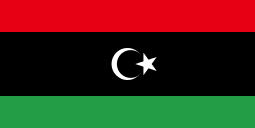 Libya
Libya
- Rated "partly free" in Freedom on the Net by Freedom House in 2012 (score 43), 2013 (score 45), 2014 (score 48), and 2015 (score 54).[247][248][249][250]
- Listed as selective in the political area and as no evidence in social, conflict/security, and Internet tools by ONI in August 2009.[11]
- Identified by Freedom House as one of seven countries seen as particularly vulnerable to deterioration in their online freedoms during 2012 and 2013.[251]
The overthrow of the Gaddafi regime in August 2011 ended an era of censorship. The Constitutional Declaration under the interim governments provides for freedom of opinion, expression, and the press. There are no government restrictions on access to the Internet, but there are credible reports that the government monitors e-mail or Internet communication. Social media applications, such as YouTube, Facebook, and Twitter, were freely accessible. Internet content is not filtered, but service is often unreliable or nonexistent outside major cities.[252]
Before his removal and death, Col. Gaddafi had tried to impose a news blackout by cutting access to the Internet.[3] Prior to this, Internet filtering under the Gaddafi regime had become more selective, focusing on a few political opposition Web sites. This relatively lenient filtering policy coincided with what was arguably a trend toward greater openness and increasing freedom of the press. However, the legal and political climate continued to encourage self-censorship in online media.[253]
In 2006 Reporters Without Borders removed Libya from their list of Internet enemies after a fact-finding visit found no evidence of Internet censorship.[15] ONI’s 2007–2008 technical test results contradicted that conclusion, however.[253] And in 2012 RWB removed Libya from its list of countries under surveillance.[3]
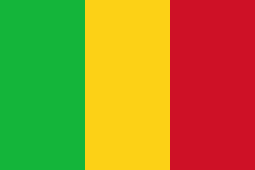 Mali
Mali
There are no government restrictions on access to the Internet except for pornography or material deemed objectionable to Islamic values. There were no credible reports that the government monitored e-mail or Internet chat rooms without judicial oversight. Individuals and groups engage in the expression of views via the Internet, including by e‑mail.[254]
The Ministry of Islamic Affairs continues to block Web sites considered anti-Islamic or pornographic. In November 2011 the Telecommunications Authority blocked and banned a local blog, Hilath.com, at the request of the Islamic Ministry because of its anti-Islamic content. The blog was known for promoting religious tolerance, as well as for discussing the blogger’s homosexuality. NGO sources stated that in general the media practiced self-censorship on issues related to Islam due to fears of being labeled "anti-Islamic" and subsequently harassed. This self-censorship also applied to reporting on problems in and criticisms of the judiciary.[254]
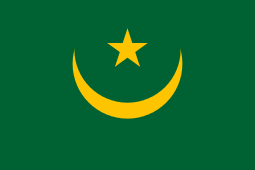 Mauritania
Mauritania
- Classified by ONI as selective in the political and as no evidence in the social, security/conflict, and Internet tools areas in 2009.[1] There is no individual ONI country profile for Mauritania, but it is included in the ONI regional overview for the Middle East and North Africa.[255]
There were no government restrictions on access to the Internet or reports that the government monitored email or Internet chat rooms in 2010. Individuals and groups could engage in the peaceful expression of views via the Internet, including by e-mail. There is a law prohibiting child pornography with penalties of two months to one year imprisonment and a 160,000 to 300,000 ouguiya ($550 to $1,034) fine.[256]
Between 16 March and 19 March 2009 and again on 25 June 2009 the news Web site Taqadoumy was blocked.[255][257] On 26 February 2010, Hanevy Ould Dehah, director of Taqadoumy, received a presidential pardon after being detained since December 2009 despite having served his sentence for crimes against Islam and paying all imposed fines and legal fees. Dehah, who was originally arrested in June 2009 on charges of defamation of presidential candidate Ibrahima Sarr for publishing an article stating that Sarr bought a house with campaign money from General Aziz. Dehah, was sentenced in August 2009 to six months in prison and fined 30,000 ouguiya ($111) for committing acts contrary to Islam and decency. The sentencing judge accused Dehah of creating a space allowing individuals to express anti-Islamic and indecent views, based on a female reader's comments made on the Taqadoumy site calling for increased sexual freedom.[256]
 Malaysia
Malaysia
- Rated "partly free" by Freedom House in Freedom on the Net in 2009 (score 41), 2011 (score 41), 2012 (score 43), 2013 (score 44), 2014 (score 42), and 2015 (score 43).[258][259][260][261][262][263]
- Listed as no evidence in the political, social, conflict/security, and Internet tools areas by ONI in May 2007.[11]
- Listed as under surveillance by RWB in 2008, 2009, and from 2011 to the present.[3]
There have been mixed messages and confusion regarding Internet censorship in Malaysia. Internet content is officially uncensored, and civil liberties assured, though on numerous occasions the government has been accused of filtering politically sensitive sites. Any act that curbs internet freedom is theoretically contrary to the Multimedia Act signed by the government of Malaysia in the 1990s. However, pervasive state controls on traditional media spill over to the Internet at times, leading to self-censorship and reports that the state investigates and harasses bloggers and cyber-dissidents.[264]
In April 2011, prime minister Najib Razak repeated promises that Malaysia will never censor the Internet.[265]
On June 11, however, the Malaysian Communications and Multimedia Commission (MCMC) ordered ISPs to block 10 websites for violating the Copyright Act.[266] This led to the creation of a new Facebook page, "1M Malaysians Don't Want SKMM Block File Sharing Website".[267]
In May 2013, leading up to the 13th Malaysian General Election, there were reports of access to YouTube videos critical of the Barisan National Government and to pages of Pakatan Rakyat political leaders in Facebook being blocked. Analysis of the network traffic showed that ISPs were scanning the headers and actively blocking requests for the videos and Facebook pages.[268] [269]
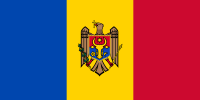 Moldova
Moldova
- Listed as selective in the political area and as no evidence in social, conflict/security, and Internet tools by ONI in December 2010.[11]
While State authorities have interfered with mobile and Internet connections in an attempt to silence protestors and influence the results of elections, Internet users in Moldova enjoy largely unfettered access despite the government’s restrictive and increasingly authoritarian tendencies. Evidence of second- and third-generation controls is mounting. Although filtering does not occur at the backbone level, the majority of filtering and surveillance takes place at the sites where most Moldovans access the Internet: Internet cafés and workplaces. Moldovan security forces have developed the capacity to monitor the Internet, and national legislation concerning ‘‘illegal activities’’ is strict.[270]
 Morocco
Morocco
- Rated "partly free" by Freedom House in Freedom on the Net in 2013 (score 42), 2014 (score 44), and 2015 (score 43).[271][272][273]
- Listed as selective in the social, conflict/security, and Internet tools areas and as no evidence in political by ONI in August 2009.[11]
Internet access in Morocco is, for the most part, open and unrestricted. Morocco’s Internet filtration regime is relatively light and focuses on a few blog sites, a few highly visible anonymizers, and for a brief period in May 2007, the video sharing Web site YouTube.[274] ONI testing revealed that Morocco no longer filters a majority of sites in favor of independence of the Western Sahara, which were previously blocked. The filtration regime is not comprehensive, that is to say, similar content can be found on other Web sites that are not blocked. On the other hand, Morocco has started to prosecute Internet users and bloggers for their online activities and writings.[275]
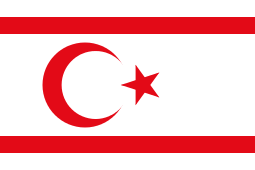 Northern Cyprus
Northern Cyprus
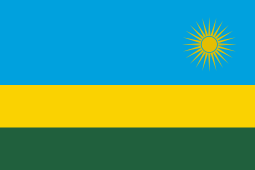 Rwanda
Rwanda
- Rated "partly free" by Freedom House in Freedom on the Net in 2011 (score 50), 2012 (score 51), 2013 (score 48), 2014 (score 50), and 2015 (score 50).[276][277][278][279][280]
- Not individually classified by ONI.
- Identified in Freedom on the Net 2012 as one of seven countries that were at particular risk of suffering setbacks related to Internet freedom in late 2012 and in 2013. The Internet in these countries was described at the time as being a relatively open and unconstrained space for free expression, but the countries also typically featured a repressive environment for traditional media and had recently considered or introduced legislation that would negatively affect Internet freedom.[7]
The law does not provide for government restrictions on access to the Internet, but there are reports that the government blocks access to Web sites within the country that are critical of the government. In 2012 and 2013, some independent online news outlets and opposition blogs were intermittently inaccessible. Some opposition sites continue to be blocked on some ISPs in early 2013, including Umusingi and Inyenyeri News, which were first blocked in 2011.[281]
The constitution provides for freedom of speech and press "in conditions prescribed by the law." The government at times restricts these rights. Laws prohibit promoting divisionism, genocide ideology, and genocide denial, "spreading rumors aimed at inciting the population to rise against the regime", expressing contempt for the Head of State, other high-level public officials, administrative authorities or other public servants, and slander of foreign and international officials and dignitaries. These acts or expression of these viewpoints sometimes results in arrest, harassment, or intimidation. Numerous journalists practice self-censorship.[281]
The constitution and law prohibit arbitrary interference with privacy, family, home, or correspondence; however, there are numerous reports the government monitors homes, telephone calls, e-mail, Internet chat rooms, other private communications, movements, and personal and institutional data. In some cases monitoring has led to detention and interrogation by State security forces (SSF).[281]
 Singapore
Singapore
- Rated "partly free" by Freedom House in Freedom on the Net in 2014 (score 40) and 2015 (score 41).[282][283]
- Listed as selective in the social area and as no evidence in political, conflict/security, and Internet tools by ONI in May 2007.[11]
The Republic of Singapore engages in the Internet filtering, blocking only the original set of 100 mass-impactable websites. However, the state employs a combination of licensing controls and legal pressures to regulate Internet access and to limit the presence of objectionable content and conduct online.[284]
In 2005 and 2006 three people were arrested and charged with sedition for posting racist comments on the Internet, of which two have been sentenced to imprisonment.[285]
The Media Development Authority maintains a confidential list of blocked websites that are inaccessible within the country.[286] The Media Development Authority exerts control over all the ISPs to ensure it is not accessible unless there is an extension called "Go Away MDA".[287]
On 8 October 2012, the NTUC executive director, Amy Cheong was fired after posting racist comments on the Internet.[288]
In July 2014, the government made plans to block The Pirate Bay and 45 file sharing websites, after the Copyright Act 2014 was amended.[289]
 Sri Lanka
Sri Lanka
- Rated "partly free" by Freedom House in Freedom on the Net in 2012 (score 55), 2013 (score 58), 2014 (score 58), and 2015 (score 47).[290][291][292][293]
- Classified by ONI as no evidence of filtering in 2009.[1] There is no individual ONI country profile for Sri Lanka, but it is included in the regional overview for Asia.[294]
- Listed as Under Surveillance by RWB in 2008, 2009, and from 2011 to the present.[3]
Several political and news websites, including tamilnet.com and lankanewsweb.com have been blocked within the country.[295] The Sri Lanka courts have ordered hundreds of adult sites blocked to "protect women and children".[296][297]
In October and November 2011 the Sri Lankan Telecommunication Regulatory Commission blocked the five websites, www.lankaenews.com, srilankamirror.com, srilankaguardian.com, paparacigossip9.com, and www.lankawaynews.com, for what the government alleges as publishing reports that amount to "character assassination and violating individual privacy" and damaging the character of President Mahinda Rajapaksa, ministers and senior government officials. The five sites have published material critical of the government and alleged corruption and malfeasance by politicians.[298]
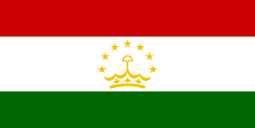 Tajikistan
Tajikistan
- Listed as selective in the political area and as no evidence as in social, conflict/security, and Internet tools by ONI in December 2010.[11]
Internet penetration remains low in Tajikistan because of widespread poverty and the relatively high cost of Internet access. Internet access remains largely unrestricted, but emerging second-generation controls have threatened to erode these freedoms just as Internet penetration is starting to affect political life in the country. In the run-up to the 2006 presidential elections, ISPs were asked to voluntarily censor access to an opposition Web site, and other second-generation controls have begun to emerge.[299]
 Tunisia
Tunisia
- Rated "not free" by Freedom House in Freedom on the Net in 2009 (score 76) and 2011 (score 81) and as "partly free" in 2012 (score 46), 2013 (score 41), 2014 (score 39), and 2015 (score 38).[300][301][302][303][304][305]
- Listed as no evidence in the political, social, conflict/security, and Internet tools areas by ONI in 2012.[1]
- Listed as Under Surveillance by RWB from 2011 to the present.[3]
Internet censorship in Tunisia significantly decreased in January 2011, following the ouster of President Zine El Abidine Ben Ali, as the new acting government:[306][307]
- proclaimed complete freedom of information and expression as a fundamental principle,
- abolished the information ministry, and
- removed filters on social networking sites such as Facebook and YouTube.
Some Internet censorship reemerged when in May 2011:
- the Permanent Military Tribunal of Tunis ordered four Facebook pages blocked for attempting "to damage the reputation of the military institution and, its leaders, by the publishing of video clips and, the circulation of comments and, articles that aim to destabilize the trust of citizens in the national army, and spread disorder and chaos in the country",[308][309] and
- a court ordered the Tunisian Internet Agency (ATI) to block porn sites on the grounds that they posed a threat to minors and Muslim values.[310]
Prior to January 2011 the Ben Ali regime had blocked thousands of websites (such as pornography, mail, search engine cached pages, online documents conversion and translation services) and peer-to-peer and FTP transfer using a transparent proxy and port blocking. Cyber dissidents including pro-democracy lawyer Mohammed Abbou were jailed by the Tunisian government for their online activities.[311]
 Turkey
Turkey
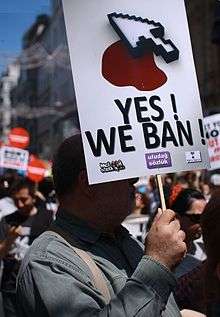
- Rated "partly free" in Freedom on the Net by Freedom House in 2009 and 2011-2015 (scores 42, 45, 46, 49, 55, and 58).[312][313][314][315][316][317]
- Listed as selective in the political, social, and Internet tools areas and as no evidence of filtering in the conflict/security area by ONI in December 2010.[11]
- Listed as under surveillance by RWB since 2010.[3]
The Turkish government has implemented legal and institutional reforms driven by the country’s ambitions to become a European Union member state, while at the same time demonstrating its high sensitivity to defamation and other ‘‘inappropriate’’ online content, which has resulted in the closure of a number of local and international Web sites. In October 2010, a ban on YouTube was lifted, but a range of IP addresses used by Google remained blocked, thus access to Google Apps hosted sites, including all Google App Engine powered sites and some of the Google services, remained blocked. All Internet traffic passes through Turk Telecom’s infrastructure, allowing centralized control over online content and facilitating the implementation of shutdown decisions.[318]
Many minor and major websites in Turkey are subject to censorship. Web sites are blocked for intellectual property infringement, particularly file-sharing and streaming sites; for providing access to material that shows or promotes the sexual exploitation and abuse of children, obscenity, prostitution, or gambling; for insults to Mustafa Kemal Ataturk, the founding father of modern Turkey; for reporting news on southeastern Turkey and Kurdish issues; or which defame individuals. In addition to widespread filtering, state authorities are proactive in requesting the deletion or removal of content online.[319] As of June 2010 more than 8000 major and minor websites were banned, most of them pornographic and mp3 sharing sites.[320] By 2013 the number of blocked sites had grown to slightly under 30,000.[319] Among the web sites banned are the prominent sites YouPorn, Megaupload, Tagged, Slide, and ShoutCast. However, blocked sites are often available using proxies or by changing DNS servers. The Internet Movie Database escaped being blocked due to a misspelling of its domain name, resulting in a futile ban on www.imbd.com.[321]
Under new regulations announced on 22 February 2011 and scheduled to go into effect on 22 August 2011, the Information Technologies Board (BTK), an offshoot of the prime minister’s office, will require that all computers select one of four levels of content filtering (family, children, domestic, or standard) in order to gain access to the Internet.[322]
In its 2013 Freedom on the Net report, Freedom House says:[319]
- that government censorship of the Internet is relatively common and has increased steadily over recent years;
- that authorities added several thousand websites to its blocking list, increasing the total to almost 30,000;
- that the European Court of Human Rights found Turkey in violation of Article 10 of the European Convention on Human Rights for blocking access to the hosting platform Google Sites; and
- several users received fines, prison time, or suspended sentences for comments made on social media sites.
In 2013 social media sites were banned in Turkey after the Taksim Gezi Park protests. Both Twitter and YouTube were closed by a decision of the Turkish court. And a new law, passed by Turkish Parliament, granted immunity to Turkey’s Telecommunications Directorate (TİB) personnel. The TİB was also given the authority to block access to specific websites without the need for a court order.[323]
On 20 March 2014, access to Twitter was blocked when a court ordered that "protection measures" be applied to the service. This followed earlier remarks by Prime Minister Tayyip Erdogan who vowed to "wipe out Twitter" following damaging allegations of corruption in his inner circle.[324][325]
On 10 October 2015, following the first of two bombings in Ankara, censorship monitoring organization Turkey Blocks corroborated user reports that Turkey intentionally restricted access to Twitter in an apparent attempt to control the flow of information relating to the attack.[326]
In October 2016, Turkish authorities intermittently blocked all Internet access in the east and southeast of the country after detaining the elected co-mayors of the city of Diyarbakır.[327]
On 4 November 2016, Turkish authorities blocked access to Facebook, Twitter, Youtube and Whatsapp in the country, following the detention of 11 Free Democratic Party (HDP) members of parliament. Internet restrictions are increasingly being used to suppress coverage of political incidents, a form of censorship deployed at short notice to prevent civil unrest.[328]
 United Kingdom
United Kingdom
- Rated "free" by Freedom House in Freedom on the Net in 2009 (score 23), 2011 (score 24), 2012 (score 23), 2013 (score 23), 2014 (score 24), and 2015 (score 24).[329][330][331][332][333][334]
- Listed as an Internet Enemy by RWB in 2014.[2]
- Listed as no evidence in all four areas (political, social, conflict/security, and Internet tools) by ONI in December 2010.[11]
The United Kingdom has a notable libertarian tradition, manifested by, among other things, solid guarantees of freedom of expression, freedom of information, and protection of privacy. Freedom of expression and protection of privacy over the Internet is guaranteed by law. Nonetheless, over the last few years there has been a shift toward increased surveillance and police measures. Combating terrorism and preventing child abuse have been widely used as a justification by state agencies and private commercial actors (e.g., Internet service providers) for the implementation of interception and direct filtering measures. Nevertheless, in 2010 the OpenNet Initiative found no evidence of technical filtering in the political, social, conflict/security, or Internet tools areas. However, the U.K. openly blocks child pornography Web sites, for which ONI does not test.[335]
British Telecommunications' ISP passes internet traffic through a service called Cleanfeed which uses data provided by the Internet Watch Foundation to identify pages believed to contain indecent photographs of children.[336][337] When such a page is found, the system creates a 'URL not found page' error rather than deliver the actual page or a warning page. Other ISPs use different systems such as WebMinder.
In July and again in October 2011, the UK High Court ruled that British Telecom must block access to a website (newzbin.com) which "provides links to pirated movies".[338][339] In September 2011, in response to the court ruling and with encouragement from government, leading UK ISPs are reported to have privately agreed in principle to quickly restrict access to websites when presented with court orders.[340] In May 2012 the High Court ordered UK ISPs to block The Pirate Bay to prevent further copyright infringing movie and music downloads from the website.[341][342]
On July 22, 2013, Prime Minister David Cameron announced that by default pornography and other abusive material (such as suicide, alcohol and violence-related content) to most households in the UK would be filtered from the Internet by the end of 2013 unless a household chooses to receive it.[343]
The UK has also announced plans requiring pornography sites worldwide to add age verification to prevent children from viewing them. UK based websites which fail to comply will be fined, while overseas sites will be blocked.[344][345]
 United States
United States
- Rated "free" by Freedom House in Freedom on the Net in 2011 (score 13), 2012 (score 12), 2013 (score 17), 2014 (score 19), and 2015 (score 19).[346][347][348][349][350]
- Listed as an Internet Enemy by RWB in 2014.[2]
- Classified by ONI as no evidence of filtering in 2009.[1] There is no individual ONI country profile for the United States, but it is included in the regional overview for the United States and Canada.[351]
Most online expressions are protected by the First Amendment to the United States Constitution, but laws concerning libel, intellectual property, and child pornography still determine if certain content can be legally published online. Internet access by individuals in the US is not subject to technical censorship, but can be penalized by law for violating the rights of others. As in other countries, the potential for legal liability for civil violations, including defamation and copyright, constrains the publishers of Internet content in the United States. This can have a "chilling effect" and lead to self-censorship of lawful online content and conduct. Content-control software is sometimes used by businesses, libraries, schools, and government offices to limit access to specific types of content.[351]
In 2014, the United States was added to Reporters Without Borders's (RWB's) list of "Enemies of the Internet", a category of countries with the highest level of Internet censorship and surveillance. RWB stated that the U.S. "… has undermined confidence in the Internet and its own standards of security" and that "U.S. surveillance practices and decryption activities are a direct threat to investigative journalists, especially those who work with sensitive sources for whom confidentiality is paramount and who are already under pressure."[2]
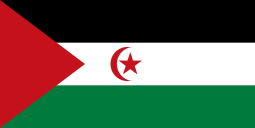 Western Sahara
Western Sahara
Morocco claims the Western Sahara territory and administers Moroccan law through Moroccan institutions in the estimated 85 percent of the territory it controls. The Popular Front for the Liberation of Saguia el Hamra and Rio de Oro (Polisario), an organization that has sought independence for the former Spanish territory since 1973, disputes Morocco’s claim to sovereignty over the territory.[352][353]
There is no indication that Internet access in the territory differs from that in internationally recognized Morocco.[352]
Morocco considers the part of the territory that it administers to be an integral component of the kingdom with the same laws and structures regarding civil liberties, political and economic rights. Moroccan law prohibits citizens from criticizing Islam or the institution of the monarchy or to oppose the government’s official position regarding territorial integrity and Western Sahara. Saharan media outlets and bloggers practice self-censorship on these issues, and there are no reports of government action against them for what they write. Human rights and Sahrawi bloggers affiliated with leftist political groups assume that authorities closely monitor their activities and feel the need to hide their identities.[352]
Little or no censorship or surveillance
This classification includes countries that are not listed as "Enemies of the Internet" or "Under Surveillance" by Reporters Without Borders, and for which no evidence of Internet filtering was found by the OpenNet Initiative, although other controls such as voluntary filtering, self-censorship, and other types of public or private action to limit child pornography, hate speech, defamation, or theft of intellectual property often exist.
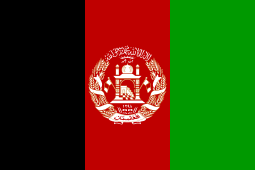 Afghanistan
Afghanistan
- Listed as no evidence in all four areas (political, social, conflict/security, and Internet tools) by ONI in May 2007.[11]
Only about 1/10 of 1 percent of Afghans are online, thus limiting the Internet as a means of expression. Freedom of expression is inviolable under the Afghanistan Constitution, and every Afghan has the right to print or publish topics without prior submission to state authorities. However, the limits of the law are clear: under the Constitution no law can be contrary to the beliefs and provisions of the sacred religion of Islam. The December 2005 Media Law includes bans on four broad content categories: the publication of news contrary to Islam and other religions; slanderous or insulting materials concerning individuals; matters contrary to the Afghan Constitution or criminal law; and the exposure of the identities of victims of violence. Proposed additions to the law would ban content jeopardizing stability, national security, and territorial integrity of Afghanistan; false information that might disrupt public opinion; promotion of any religion other than Islam; and "material which might damage physical well-being, psychological and moral security of people, especially children and the youth.[354]
The Electronic Frontier Foundation reported that the Afghan Ministry of Communications mandated in June 2010 that all Internet Service Providers (ISPs) in Afghanistan filter Facebook, Gmail, Twitter, YouTube and websites related to alcohol, gambling and sex. They are also trying or blocking websites which are “immoral” and against the traditions of the Afghan people.[355] However, executives at Afghan ISPs said this was the result of a mistaken announcement by Ariana Network Service, one of the country's largest ISPs. An executive there said that while the government intends to censor pornographic content and gambling sites, social networking sites and email services are not slated for filtering. As of July 2010, enforcement of Afghanistan's restrictions on "immoral" content was limited, with internet executives saying the government didn't have the technical capacity to filter internet traffic.[356]
 Albania
Albania
There are no government restrictions on access to the Internet or reports that the government monitors e-mail or Internet chat rooms without appropriate legal authority. The constitution provides for freedom of speech and press, and the government generally respects these rights in practice. The constitution and law prohibit arbitrary Interference with privacy, family, home, or correspondence, and the government generally respects these prohibitions in practice.[357]
 Algeria
Algeria
- Listed as no evidence in all four areas (political, social, conflict/security, and Internet tools) by ONI in August 2009.[11]
Internet access in Algeria is not restricted by technical filtering. However, the state controls the Internet infrastructure and regulates content by other means. Internet users and Internet service providers (ISPs) can face criminal penalties for posting or allowing the posting of material deemed contrary to public order or morality.[358]
 Argentina
Argentina
- Rated "free" by Freedom House in Freedom on the Net in 2012 (score 26), 2013 (score 27), 2014 (score 27), and 2015 (score 27).[359][360][361][362]
- Not individually classified by ONI, but is included in the regional overview for Latin America.[363]
The regulation of Internet content addresses largely the same concerns and strategies seen in North America and Europe, focusing on combating the spread of child pornography and restricting child access to age-inappropriate material. As Internet usage in Argentina increases, so do defamation, hate speech, copyright, and privacy issues.[363]
In August 2011 a judge ordered all ISPs to block the site LeakyMails, a Web site that obtains and publishes documents exposing corruption in Argentina.[364][365] In response some internet service providers blocked the website IP address 216.239.32.2 which is linked to more than one million blogs hosted on Google's Blogger service disrupting the access to all of them.[366]
In November 2012 the CNC (Spanish: Comision Nacional De Comunicaciones) ordered the blocking of websites that contained information about bootloader unlocking of netbooks supplied by the Argentine Government.[367][368] The legality of these actions in Argentina remains controversial.[369]
In July 2014 the CNC (Spanish: Comision Nacional De Comunicaciones) ordered local ISPs to block The Pirate Bay due an injunction of CAPIF (Spanish: Cámara Argentina de Productores de Fonogramas) against the popular Torrent index.[370] CAPIF is an Argentinian music industry group and a member of International Federation of the Phonographic Industry (IFPI). The CNC is an agency of the Argentine Government created to certify wireless devices; to regulate communications by radio, television, wire, satellite, cable and postal services.[371] In retaliation for the blocking, the online site of CAPIF was hacked and turned into a Pirate Bay Proxy.[372]
 Armenia
Armenia
- Rated "free" by Freedom House in Freedom on the Net in 2013 (score 29), 2014 (score 28), and 2015 (score 28).[373][374][375]
- Listed as substantial in the political area and as selective in social, conflict/security, and Internet tools by ONI in November 2010.[11]
Access to the Internet in Armenia is largely unfettered, although evidence of second- and third-generation filtering is mounting. Armenia’s political climate is volatile and largely unpredictable. In times of political unrest, the government has not hesitated to put in place restrictions on the Internet as a means to curtail public protest and discontent.[376]
 Australia
Australia
- Rated "free" by Freedom House in Freedom on the Net in 2011 (score 17), 2012 (score 16), 2013 (score 17), 2014 (score 17), and 2015 (score 19).[377][378][379][380][381]
- No evidence of filtering found by ONI in 2009.[1] There is no individual ONI country profile for Australia, but it is included in the regional overview for Australia and New Zealand.[382]
- Listed as Under Surveillance by RWB from 2009 to the present.[3]
Australia does not allow content that would be classified "RC" (Refused Classification or banned) or "X18+" (hardcore non-violent pornography or very hardcore shock value) to be hosted within Australia and considers such content "prohibited"/"potentially prohibited" outside Australia; it also requires most other age-restricted content sites to verify a user's age before allowing access. Since January 2008 material that would be likely to be classified "R18+" or "MA15+" and which is not behind such an age verification service (and, for MA15+, which also meets other criteria such as provided for profit, or contains certain media types) also fits the category of "prohibited" or "potentially prohibited". The regulator ACMA can order local sites which do not comply taken down, and overseas sites added to a blacklist provided to makers of PC-based filtering software.
Australia is classified as "under surveillance" by Reporters Without Borders due to the internet filtering legislation proposed by Minister Stephen Conroy. Regardless, as of August 2010 and the outcome of the 2010 election, it would be highly unlikely for the filter to pass the Senate if proposed due to the close numbers of seats held by Labor and the Coalition, who Joe Hockey says do not support it.[383]
In June 2011 two Australian ISPs, Telstra and Optus, confirmed they would voluntary block access to a list of child abuse websites provided by the Australian Communications and Media Authority and more websites on a list compiled by unnamed international organizations from mid-year.[384]
In May 2013, Senator Scott Ludlam questioned the Department and Minister for Communications - and 3 agencies were identified as using section 313 powers within Australian legislation to block websites, two of which being The Australian Federal Police and the Australian Securities and Investments Commission.[385]
In June 2015 legislation to force ISP's to block access to websites that link to copyrighted material was passed through the Senate. The new legislation will allow rights holders to obtain court orders to block overseas content that are found to contain copyrighted material. The legislation does not however extend to the use of VPN services, bringing into question the effectiveness of the legislation.[386]
 Austria
Austria
- Austria is not individually classified in Freedom House's Freedom on the Net reports,[8] or by ONI,[1] and does not appear on the RWB lists.[3]
The Austrian constitution provides for freedom of speech and press, and the government generally respects these rights in practice. There are no government restrictions on access to the Internet or credible reports that the government monitors e-mail or Internet chat rooms without appropriate legal authority. Individuals and groups engage in the peaceful expression of views via the Internet, including by e-mail. Authorities work to restrict access to Web sites containing information that violates the law, such as neo-Nazi and child pornography sites.[387]
The law prohibits incitement, insult, or contempt against a group because of its members’ race, nationality, or ethnicity if the statement violates human dignity and the government strictly enforces these laws. The law prohibits public denial, belittlement, approval, or justification of the Nazi genocide or other Nazi crimes against humanity in a print publication, a broadcast, or other media and the government strictly enforces these laws. Strict libel and slander laws discourage reporting of governmental abuse.[387]
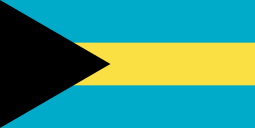 Bahamas
Bahamas
- The Bahamas is not individually classified in Freedom House's Freedom on the Net reports,[8] or by ONI,[1] and does not appear on the RWB lists.[3]
Access to the Internet is unrestricted.[388] There were no government restrictions on access to the Internet or credible reports that the government monitors e-mail or Internet chat rooms without judicial oversight. The constitution provides for freedom of speech and press, and the government generally respects these rights in practice.[389] Strict and antiquated libel laws dating to British legal codes are seldom invoked.[388]
 Bangladesh
Bangladesh
- Rated "partly free" by Freedom House in Freedom on the Net in 2013 (score 49), 2014 (score 49), and 2015 (score 51).[390][391][392]
- No evidence of filtering found by ONI in 2011.[1][11]
Although Internet access in Bangladesh is not restricted by a national level filtering regime, the state has intervened to block Web sites for hosting anti-Islamic content and content deemed subversive. Internet content is regulated by existing legal frameworks that restrict material deemed defamatory or offensive, as well as content that might challenge law and order.[393]
The Bangla blogging platform Sachalayatan was reported to be inaccessible on 15 July 2008, and was forced to migrate to a new IP address. Although the blocking was not officially confirmed, Sachalayatan was likely Bangladesh’s inaugural filtering event. YouTube was blocked for a few days in March 2009 in order to protect the “national interest”. The disputed video covered a partial audio recording of a meeting between the prime minister and military officials, who were angry at the government’s handling of a mutiny by border guards in Dhaka that left more than seventy people dead.[294]
Facebook was blocked by the Bangladesh Telecommunication Regulatory Commission (BTRC) for 7 days starting on 29 May 2010 because of "obnoxious images", including depictions of Mohammed and several of the country's political officials as well as links to pornographic sites.[394] The block was lifted after Facebook agreed to remove the offensive content.[395] During the same period a 30-year-old man was arrested in the Bangladeshi capital on charges of uploading satiric images of some political leaders on Facebook.[396]
The BTRC again blocked YouTube access in September 2012 after Google, Inc. ignored requests to remove the controversial film, Innocence of Muslims, from the site.[397]
On 16 May 2013 BTRC asked the international internet gateway operators to reduce the upload bandwidth of ISPs by 75% in an effort to prevent illegal VoIP.[398] There is speculation that the bandwidth reduction is actually an effort to make it difficult for people to upload ‘problematic’ videos, images, TV talk show clips, etc. in the social media.[399]
.svg.png) Belgium
Belgium
- Not individually classified by ONI, but included in the regional overview for Europe.[400]
Subject to warrants requested by the prosecutor several Belgian Internet providers including Belgacom, Telenet, Base, Scarlet, EDPnet, Dommel, Proximus, Mobistar, Mobile Vikings, Tele2, and Versatel have been filtering several websites at the DNS level since April 2009. This is done when the websites are engaged in illegal activities or when they display information that is "contrary to public order or morality".[401] People who browse the Internet using one of these providers and hit a blocked website are redirected to a page that claims that the content of the website is illegal under Belgian law and therefore blocked.[402]
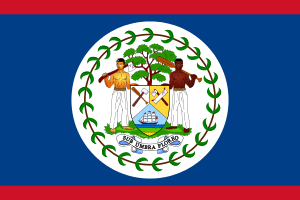 Belize
Belize
There are few government restrictions on access to the Internet and no credible reports that the government monitors e-mail or Internet chat rooms without judicial oversight. The government-owned telecommunications company blocks Voice over Internet Protocol (VOIP) services.[403]
The law provides for freedom of speech and press and the government generally respects these rights in practice. The constitution prohibits arbitrary interference with privacy, family, home, or correspondence, and government authorities generally respect these prohibitions in practice. Law enforcement agencies may, with judicial oversight, intercept communications to obtain information in the interest of "national security, public order, public morals, and public safety." The law defines communication broadly to encompass the possible interception of communication by post, telephone, facsimile, e-mails, chat, and/or text messages whether encrypted or unencrypted or whether provided by public or private providers.[403]
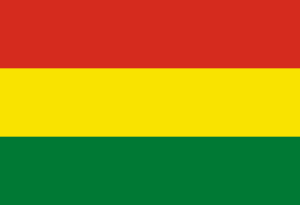 Bolivia
Bolivia
There are no government restrictions on access to the Internet. On 21 October 2012, Vice President Garcia Linera stated that the government records the names of people who insult President Morales on social media sites.[404]
The Bolivian constitution and law provide for freedom of speech and press. Although the government generally respects these rights, in at least two cases in 2012, the government used the anti-racism law to restrict both rights. Bolivian law prohibits arbitrary interference with privacy, family, home, or correspondence and the government generally respects these prohibitions, but there have been allegations that the government does not always respect the law.[404]
 Bosnia and Herzegovina
Bosnia and Herzegovina
There are no government restrictions on access to the Internet or reports that the government monitors e-mail or Internet chat rooms.[405]
The law provides for freedom of speech and press; however, the government does not always respect press freedom in practice. The Federation of Bosnia and Herzegovina law prohibits hate speech. The Republika Srpska law does not specifically proscribe hate speech, although the law prohibits causing ethnic, racial, or religious hatred. Independent analysts note a continuing tendency of politicians and other leaders to label unwanted criticism as hate speech. The law prohibits arbitrary interference with privacy, family, home, or correspondence, and the government generally respects these prohibitions in practice.[405]
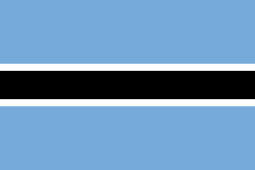 Botswana
Botswana
There are no government restrictions on access to the Internet or credible reports the government monitors e-mail or Internet chat rooms. The constitution and law provide for freedom of speech and press and the government generally respects these rights. The constitution and law prohibit arbitrary interference with privacy, family, home, or correspondence, and the government generally respects these prohibitions in practice.[406]
 Brazil
Brazil
- Rated "free" by Freedom House in Freedom on the Net in 2015 (score 29) and 2014 (score 30), "partly free" in 2013 (score 32), "free" in 2012 (score 27), 2011 (score 29), and 2009 (score 30).[407][408][409][410][411][412]
- Not individually classified by ONI, but is included in the regional overview for Latin America.[363]
There are no government restrictions on access to the Internet or credible reports that the government monitors e-mail or Internet chat rooms. Individuals and groups can engage in the expression of views via the Internet, including by e‑mail. A continuing trend is for private individuals and official bodies to take legal action against Internet service providers and providers of online social media platforms, such as Google, Facebook, and Orkut, holding them accountable for content posted to or provided by users of the platform. Judicial rulings often result in the forced removal of content from the Internet.[413]
Brazilian legislation restricts the freedom of expression (Paim Law), directed especially to publications considered racist (such as neo-nazi sites). The Brazilian Constitution also prohibits anonymity of journalists.[414]
In September 2012 an elections court in Brazil ordered the arrest of Google’s most senior executive in the country, after the company failed to take down YouTube videos attacking a local mayoral candidate. The stringent 1965 Electoral Code bans campaign ads that “offend the dignity or decorum” of a candidate. Google is appealing the order, which comes after a similar decision by another Brazilian elections judge. In that case, the judge found a different senior executive responsible for violating local election law after the company refused to take down a YouTube video mocking a mayoral candidate. That decision was overturned by another judge who wrote that “Google is not the intellectual author of the video, it did not post the file, and for that reason it cannot be punished for its propagation.”[415]
 Bulgaria
Bulgaria
There are no government restrictions on access to the Internet or reports that the government monitors e-mail or Internet chat rooms without appropriate legal authority.[416]
The law provides for freedom of speech and press, and the government generally respects these rights. The penal code provides for from one to four years' imprisonment for incitement to "hate speech."[416]
The constitution and law prohibit arbitrary interference with privacy, family, home, or correspondence, and the government generally respects these provisions in practice. The security services can access electronic data with judicial permission when investigating cyber and serious crimes. However, NGOs criticize gaps in the law that allow the prosecution service to request such data directly from the service providers without court authorization. There are no reports that the government attempts to collect personally identifiable information in connection with a person's peaceful expression of political, religious, or ideological opinions or beliefs.[416]
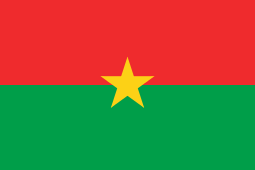 Burkina Faso
Burkina Faso
There are no government restrictions on access to the Internet; however, the Superior Council of Communication (SCC) monitors Internet Web sites and discussion forums to ensure compliance with existing regulations.[417]
The constitution and law provide for freedom of speech and of the press, and the government generally respects these rights in practice. The law prohibits persons from insulting the head of state or using derogatory language with respect to the office; however, individuals criticize the government publicly or privately without reprisal.[417]
The constitution and law prohibit arbitrary interference with privacy, family, home, or correspondence, and the government generally respects these prohibitions in practice. In cases of national security, however, the law permits surveillance, searches, and monitoring of telephones and private correspondence without a warrant.[417]
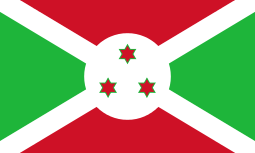 Burundi
Burundi
There are no government restrictions on access to the Internet or credible reports that the government monitors e-mail or Internet chat rooms.[418] In 2012 the Internet was used by just 1.2% of the population, which limits the effect of the Internet on the economy and politics of Burundi.[419]
The constitution and law provide for freedom of speech and press, and the government generally respects these rights. The law prohibits the media from spreading "hate" messages or from using abusive or defamatory language against public servants acting in their official role that could damage the dignity of or respect for the public office. Libel laws prohibit the public distribution of information that exposes a person to "public contempt" and carry penalties of prison terms and fines. It is illegal for anyone to display materials that may disturb the public peace. Some journalists, lawyers, and political party, civil society, and NGO leaders allege the government uses these laws to intimidate and harass them.[418]
The constitution and law provide for the right to privacy, but the government does not always respect this right in practice. Authorities do not always respect the law requiring search warrants.[418]
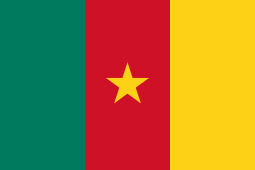 Cameroon
Cameroon
There are no government restrictions on access to the Internet or reports that the government monitors e-mail or Internet chat rooms.[420]
Although the law provides for freedom of speech and press, it also criminalizes media offenses, and the government restricts freedoms of speech and press. Government officials threaten, harass, arrest, and deny equal treatment to individuals or organizations that criticize government policies or express views at odds with government policy. Individuals who criticize the government publicly or privately sometimes face reprisals. Press freedom is constrained by strict libel laws that suppress criticism. These laws authorize the government, at its discretion and the request of the plaintiff, to criminalize a civil libel suit or to initiate a criminal libel suit in cases of alleged libel against the president and other high government officials. Such crimes are punishable by prison terms and heavy fines.[420]
Although the constitution and law prohibit arbitrary interference with privacy, family, home, or correspondence, these rights are subject to restriction for the "higher interests of the state", and there are credible reports that police and gendarmes harass citizens, conduct searches without warrants, and open or seize mail with impunity.[420]
 Canada
Canada
- Rated "free" in Freedom on the Net by Freedom House in 2014 (score 15) and 2015 (score 16).[421][422]
- No evidence of filtering found by ONI in 2009.[1] There is no individual ONI country profile for Canada, but it is included in the regional overview for the United States and Canada.[351]
Information, such as names of young offenders or information on criminal trials subject to publication bans, which the government is actively attempting to keep out of Canadian broadcast and print media is sometimes available to Canadian users via the Internet from sites hosted outside Canada.
Project Cleanfeed Canada (cybertip.ca) decides what sites are child pornographic in nature and transmits those lists to the voluntarily participating ISPs who can then block the pages for their users. However, some authors, bloggers and digital rights lawyers argue that they are accountable to no one and could be adding non pornographic sites to their list without public knowledge.[423]
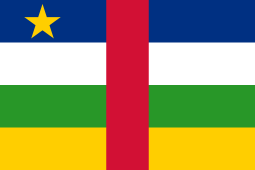 Central African Republic
Central African Republic
There are no government restrictions on access to the Internet or credible reports that the government monitors e-mail or Internet chat rooms without judicial oversight. Internet use in the Central African Republic is low, reaching just 3.0% of the population in 2012, and so plays only a small role in the economic and political life of the country.[424]
Although the constitution and law provide for freedom of speech and press, authorities occasionally arrest journalists critical of the government and in some cases the government impedes individuals’ right to free speech. Imprisonment for defamation and censorship were abolished in 2005; however, journalists found guilty of libel or slander face fines of 100,000 to eight million CFA francs ($200 to $16,000 USD). The law provides for imprisonment and fines of as much as one million CFA francs ($2,000 USD) for journalists who use the media to incite disobedience among security forces or incite persons to violence, hatred, or discrimination. Similar fines and imprisonment of six months to two years may be imposed for the publication or broadcast of false or fabricated information that "would disturb the peace."[424]
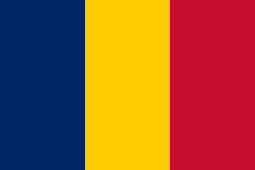 Chad
Chad
There are no government restrictions on access to the Internet or credible reports that the government monitors e-mail or Internet chat rooms. Although individuals and groups can engage in the peaceful expression of views via the Internet, few residents have access to it.[425]
The constitution provides for freedom of opinion, expression, and press, but the government does not always respect these rights. Private individuals are generally free to criticize the government without reprisal, but reporters and publishers risk harassment from authorities when publishing critical articles. The 2010 media law abolished prison sentences for defamation and insult, but prohibits "inciting racial, ethnic, or religious hatred", which is punishable by one to two years in prison and a fine of one to three million CFA francs ($2,000 to $6,000).[425]
 Chile
Chile
- Not individually classified by ONI, but is included in the regional overview for Latin America.[363]
The constitution provides for freedom of speech and press, and the government generally respects these rights in practice. There are no government restrictions on access to the Internet. Individuals and groups can engage in the peaceful expression of views via the Internet, including by electronic mail. While the Investigations Police (PICH) maintains a sexual crimes unit that monitors Web sites for child pornography and prosecutes individuals for selling, storing, or trading child pornography on the Internet, there were no reports that the government monitors e-mail or Internet chat rooms for other purposes.[426]
 Colombia
Colombia
- Rated "free" in Freedom on the Net by Freedom House in 2014 (score 30) and "partly free" in 2015 (score 32).[427][428]
- Classified as engaged in selective Internet filtering in the social area with little or no evidence of filtering in the political, conflict/security, or Internet tools areas by the OpenNet Initiative in 2011.[429]
Because of threats from local drug cartels or other gangs and individuals, many journalists practice self-censorship, including many in Colombia who avoid reporting on corruption, drug trafficking, or violence by armed groups because of such threats.[363]
Colombian law requires ISPs to monitor their content and report any illegal activity to the government. Colombia’s “Internet Sano” (healthy Internet) campaign calls for public education on “decent” ways of using the Internet as well as penalties for improper use. Some websites are blocked as part of the Internet Sano program. Child pornography is illegal in Colombia.[363]
ONI testing on two Colombian ISPs revealed evidence of one blocked website; the government has also taken measures aimed at reducing children’s exposure to online pornography. The government has passed laws addressing online privacy, electronic surveillance, and cybercrime, although Colombia’s national intelligence service has reportedly engaged in extrajudicial surveillance. A pending law governing digital copyright, which was proposed as a measure of compliance with Colombia’s free trade agreement with the United States, is currently being contested at the Supreme Court by advocates who assert that the law violates the country’s constitution by limiting citizens’ rights to access information.[430]
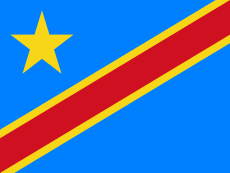 Congo, Democratic Republic of the
Congo, Democratic Republic of the
The government does not restrict access to the Internet or monitor e-mail or Internet chat rooms. The Conseil Superieur de l’Audiovisuel et de la Communication (CSAC, Superior Council of Broadcasting and Communication) law stipulates that bloggers must obtain authorization from CSAC. Through the end of 2012 CSAC had not refused authorization to any bloggers. Private entrepreneurs make Internet access available at moderate prices through Internet cafes in large cities throughout the country. According to the International Telecommunication Union (ITU), just 1.2% of individuals used the Internet in 2011.[431] By the end of 2012 Internet use had risen to 1.7% of the population.[419] This low use limits the effect that the Internet has on the economic and political life of the country.
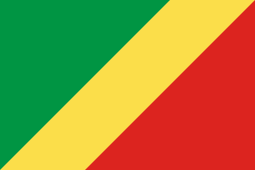 Congo, Republic of the
Congo, Republic of the
There are no government restrictions on access to the Internet, or reports the government monitors e-mail or Internet chat rooms. The relatively low use of the Internet (6.1% of the population in 2012)[419] limits the effect it has on the economy or politics. However, a growing proportion of the public, especially youth, are accessing the Internet more frequently and utilizing online social media.[432]
The constitution and law provide for freedom of speech and press, and the government generally respects these rights. The law makes certain types of speech illegal, including incitement of ethnic hatred, violence, or civil war.[432]
The constitution and law prohibit arbitrary interference with privacy, family, home, or correspondence, and the government generally respects these prohibitions. The government makes no known attempts to collect personally identifiable information via the Internet.[432]
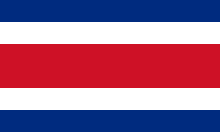 Costa Rica
Costa Rica
There are no government restrictions on access to the Internet or credible reports that the government monitors e-mail or Internet chat rooms without judicial oversight.[433]
The constitution provides for freedom of speech and press, and the government generally respects these rights in practice. Individuals are generally free to criticize the government openly without reprisal. The law limits hate speech in publications with regard to ethnic origin, race, or color. The government continues to support legislation that imposes criminal penalties, including lengthy jail sentences instead of fines, for press infractions such as libel. Article 288, which includes amendments to the criminal code, establishes a sentence of between four and eight years' imprisonment for any individual trying to obtain inappropriately secret political information.[433]
 Croatia
Croatia
- No ONI country profile, but shown as no evidence in all areas (political, social, conflict/security, and Internet tools) on the ONI global Internet filtering maps.[434]
The constitution and law generally provide for freedom of speech and the press; however, growing economic pressures lead journalists to practice self-censorship. Hate speech committed over the Internet is punishable by six months' to three years' imprisonment and libel is a criminal offense. There are no government restrictions on access to the Internet or reports the government monitors e-mail or Internet chat rooms. In general individuals and groups engage in the peaceful expression of views via the Internet, including by e-mail. Internet access is widely available and used by citizens throughout the country. An estimated 51 percent of the country's inhabitants used the Internet in 2010.[435]
 Cyprus
Cyprus
There are no government restrictions on access to the Internet or reports that the government monitored e-mail or Internet chat rooms without appropriate legal authority. Individuals and groups engage in the peaceful expression of views via the Internet, including e‑mail.[436]
The law provides for freedom of speech and press, and the government generally respects these rights in practice. An independent press, an effective judiciary, and a functioning democratic political system combine to ensure freedom of speech and of the press. The law prohibits arbitrary interference with privacy, family, home, or correspondence, and the government generally respects these prohibitions in practice.[436]
 Czech Republic
Czech Republic
- The Czech Republic is not individually classified in Freedom House's Freedom on the Net reports,[8] or by ONI[1] and does not appear on the RWB lists.[3]
There were no government restrictions on access to the Internet or credible reports the government monitors e-mail or Internet chat rooms without judicial oversight. Individuals and groups engage in the free expression of views via the Internet, including by e-mail.[437]
The law provides for freedom of speech and press, and the government generally respects these rights. However, the law provides for some exceptions to these freedoms, for example, in cases of "hate speech", Holocaust denial, and denial of Communist-era crimes. The law prohibits arbitrary interference with privacy, family, home, or correspondence, and the government generally respects these prohibitions in practice.[437]
Several Internet providers and mobile operators in the Czech Republic block content promoting child pornography, child prostitution, child trafficking, pedophilia, illegal sexual contact with children, and racist materials based on URLs from the Internet Watch Foundation list and on individual direct requests made by customers.[438][439][440][441][442][443]
 Denmark
Denmark
- No evidence of filtering found by ONI in 2009.[1] There is no individual ONI country profile for Denmark, but it is included in the regional overview for the Nordic Countries.[444]
Denmark's biggest Internet service provider TDC A/S launched a DNS-based child pornography filter on 18 October 2005 in cooperation with the state police department and Save the Children, a charity organisation. Since then, all major providers have joined and as of May 2006, 98% of the Danish Internet users were restricted by the filter.[445] The filter caused some controversy in March 2006, when a legal sex site named Bizar.dk was caught in the filter, sparking discussion about the reliability, accuracy and credibility of the filter.[446]
Also, as of 18 October 2005, TDC A/S had blocked access to AllOfMP3.com, a popular MP3 download site, through DNS filtering.[447]
On 4 February 2008 a Danish court ordered the Danish ISP Tele2 to shut down access to the file-sharing site thepiratebay.org for its Danish users.[448]
On 23 December 2008, the list of 3,863 sites filtered in Denmark was released by Wikileaks.[449]
In November 2011 a site selling diet pills, 24hdiet.com, was blocked by Danish ISPs, the first use of a new law on the blocking of foreign websites that sell drugs.[450]
In August 2012 Google removed ads from ticket website Viagogo after an investigation found that the site was violating Danish law by overcharging and manipulating tickets before sending them to the buyer.[451]
 Dominican Republic
Dominican Republic
There are no government restrictions on access to the Internet or credible reports that the government monitors e-mail or Internet chat rooms without judicial oversight.[452]
The constitution provides for freedom of speech and press, and the government generally respects these rights in practice. Individuals and groups are generally able to criticize the government publicly and privately without reprisal, although there have been incidents in which authorities intimidated journalists or other news professionals. The government denies using unauthorized wiretapping or other surreptitious methods to interfere with the private lives of individuals and families, however, human rights groups and opposition politicians allege that such interference does occur.[452]
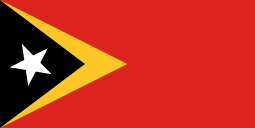 East Timor
East Timor
There are no government restrictions on access to the Internet or credible reports that the government monitors e-mail or Internet chat rooms. Internet use is very low with less than 1% of the population using the Internet in 2012. Internet access is expensive, slow, unreliable, and not widely available outside of urban areas. The law prohibits arbitrary interference with privacy, family, home, or correspondence and the government generally respects these prohibitions in practice.[453]
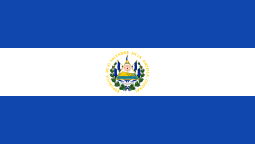 El Salvador
El Salvador
There are no government restrictions on access to the Internet or credible reports that the government monitors e-mail or Internet chat rooms without judicial oversight.[454]
The constitution provides for freedom of speech and press, and the government generally respects these rights. According to the Salvadoran Association of Journalists (APES), the media practices self-censorship, especially in their reporting on gangs and narcotics trafficking. APES stated that many members of the media were afraid to report in detail on these subjects due to fear of retaliation from gangs and narcotics trafficking groups. The constitution prohibits arbitrary interference with privacy, family, home, or correspondence, and the government generally respects these prohibitions.[454]
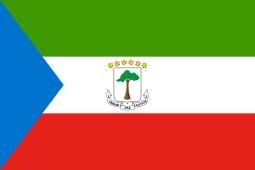 Equatorial Guinea
Equatorial Guinea
There are no government restrictions on access to the Internet or credible reports the government monitors e-mail or Internet chat rooms without judicial oversight.[455]
Although the constitution and law provide for freedom of speech and press, the law grants authorities extensive powers to restrict media activities, which the government uses to limit these rights. While criticism of government policies is allowed, individuals generally cannot criticize the president, his family, other high-ranking officials, or the security forces without fear of reprisal.[455]
The constitution and law prohibit arbitrary interference with privacy, family, home, or correspondence, but the government often does not respect these prohibitions. The government reportedly attempts to impede criticism by monitoring the activities of the political opposition, journalists, and others.[455]
 Estonia
Estonia
- Rated "free" in Freedom on the Net by Freedom House in 2009 (score 13), 2011 (score 10), 2012 (score 10), 2013 (score 9) 2014 (score 8), and 2015 (score 7).[456][457][458][459][460][461]
- Not individually classified by ONI, but is included in the regional overview for the Commonwealth of Independent States.[462]
Freedom of speech and freedom of expression are protected by Estonia’s constitution and by the country’s obligations as an EU member state. Anonymity is unrestricted, and there have been extensive public discussions on anonymity and the respectful use of the Internet. Work is underway to bring Estonian law into compliance with the European Council Framework on "combating certain forms and expressions of racism and xenophobia by means of criminal law".[459]
Restrictions on Internet content and communications in Estonia are among the lightest in the world. Electronic communications companies are required to preserve traffic and location data for one year, as defined by the EU Data Retention Directive. They may only provide this data to surveillance agencies or security authorities when presented with a court order. A 2008 court case made web service providers responsible for reader comments, but that ruling is being appealed at the European Court of Human Rights. There have been instances of content removal involving civil court orders to remove inappropriate or off-topic reader comments from online news, discussion forums, and other sites. In 2012, over 80,000 videos were removed from YouTube and other streaming services for possible copyright infringement. The Personal Data Protection Act (PDPA) restricts the collection and public dissemination of an individual’s personal data. No personal information that is considered sensitive—such as political opinions, religious or philosophical beliefs, ethnic or racial origin, sexual behavior, health, or criminal convictions—can be processed without the consent of the individual.[459]
Prior to the blocking of remote gambling sites in 2010 the Internet in Estonia was free of censorship.[463] Early in 2010 Estonia started DNS filtering of remote gambling sites that violate the renewed Gambling Act (2008).[464] The Gambling Act requires that servers for legal remote gambling must be physically located in Estonia.[465] In March 2010 the Tax and Customs Board had compiled a blocking list containing 175 sites which ISPs are to enforce.[466][467] As of September 2013 the list had grown to include over 800 sites.[468]
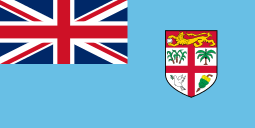 Fiji
Fiji
- Not individually classified by ONI.
There are no government restrictions on general public access to the Internet, but evidence suggests that the government monitors private e-mails of citizens as well as Internet traffic in an attempt to control antigovernment reports by anonymous bloggers.[469]
The country has operated under a military-led government since 2006 and has had no constitution or functioning parliament since 2009. A series of decrees have been issued, including the Public Order Amendment Decree (POAD), the Media Decree, and the Crime Decree. The POAD gives the government the power to detain persons on suspicion of "endangering public safety or the preservation of the peace"; defines terrorism as any act designed to advance a political, religious, or ideological cause that could "reasonably be regarded" as intended to compel a government to do or refrain from doing any act or to intimidate the public or a section thereof; and makes religious vilification and attempts to sabotage or undermine the economy offenses punishable by fines and/or imprisonment. The POAD also permits military personnel to search persons and premises without a warrant from a court and to take photographs, fingerprints, and measurements of any person. Police and military officers may enter private premises to break up any meeting considered unlawful. The Media Decree prohibits "irresponsible reporting" and provides for government censorship of the media. The Crimes Decree includes criticism of the government in its definition of the crime of sedition, including statements made in other countries by any person. By decree all telephone and Internet service users must register their personal details with telephone and Internet providers, including their name, birth date, home address, left thumbprint, and photographic identification.[469]
 Finland
Finland

- Classified as no evidence of filtering in all areas by ONI in 2009.[1] There is no individual ONI country profile for Finland, but it is included in the regional overview for the Nordic Countries.[444]
In 2006, a new copyright law known as Lex Karpela set some restrictions on publishing information regarding copy protection schemes.
Also in 2006 the government started Internet censorship by delivering Finnish ISPs a secret blocking list maintained by Finnish police.[470] Implementation of the block was voluntary, but some ISPs implemented it. The list was supposed to contain only sites with child pornography, but ended up also blocking, among others, the site lapsiporno.info that criticized the move towards censorship and listed sites that were noticed to have been blocked.[471]
In 2008 a government-sponsored report has considered establishing similar filtering in order to curb online gambling.[472]
In 2012 Internet Service Providers Elisa,[473] Sonera[474] and DNA[475] have been ordered by court to block traffic to The Pirate Bay.
 France
France
- Rated "free" in Freedom on the Net by Freedom House in 2013 (score 20), 2014 (score 20), and 2015 (score 24).[476][477][478]
- Listed as no evidence in the political, social, conflict/security, and Internet tools areas by ONI in November 2010.[11]
- Listed as Under Surveillance by RWB from 2011 to the present.[3]
France continues to promote freedom of the press and speech online by allowing unfiltered access to most content, apart from limited filtering of child pornography and web sites that promote terrorism, or racial violence and hatred. The French government has undertaken numerous measures to protect the rights of Internet users, including the passage of the Loi pour la Confiance dans l’Économie Numérique (LCEN, Law for Trust in the Digital Economy) in 2004. However, the passage of a new copyright law threatening to ban users from the Internet upon their third violation has drawn much criticism from privacy advocates as well as the European Union (EU) parliament.[479]
With the implementation of the "three-strikes" legislation and a law providing for the administrative filtering of the web and the defense of a "civilized" Internet, 2010 was a difficult year for Internet freedom in France. The offices of several online media firms and their journalists were targeted for break-ins and court summons and pressured to identify their sources. As a result, France has been added to the Reporters Without Borders list of "Countries Under Surveillance".[480]
A June 2011 draft executive order implementing Article 18[481] of the Law for Trust in the Digital Economy (LCEN) would give several French government ministries[482] the power to restrict online content “in case of violation, or where there is a serious risk of violation, of the maintenance of public order, the protection of minors, the protection of public health, the preservation of interests of the national defense, or the protection of physical persons.”[483] According to Félix Tréguer, a Policy and Legal Analyst for the digital rights advocacy group La Quadrature du Net, this is "a censorship power over the Internet that is probably unrivaled in the democratic world."[484] In response to criticism, on 23 June 2011 the minister for the Industry and the Digital economy, Éric Besson, announced that the Government would rewrite the order, possibly calling for a judge to review the legality of the content and the proportionality of the measures to be taken. Any executive order has to be approved by the French Council of State, which will have to decide whether Internet censorship authorization can be extended to such an extent by a mere executive order. It has also been suggested that, because e-commerce legislation is to be harmonized within the European Union, the draft should be reviewed by the European Commission.
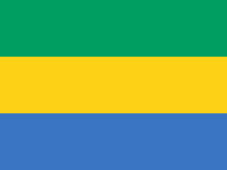 Gabon
Gabon
There are no government restrictions on access to the Internet or credible reports the government monitors e-mail or Internet chat rooms without appropriate legal authority.[485]
The constitution and law provide for freedom of speech and press, and the government generally respects these rights. Libel can be either a criminal offense or a civil matter. Penalties include two to six months in prison and fines of from 500,000 to five million CFA francs ($1,008 to $10,080). Penalties for libel, disrupting public order, and other offenses also include a one- to three-month publishing suspension for a first offense and a three- to six-month suspension for repeat offenses.[485]
Although the constitution and law prohibit arbitrary interference with privacy, family, home, or correspondence, the government does not always respect these prohibitions in practice. Authorities reportedly monitor private telephone conversations, personal mail, and the movement of citizens.[485]
 Germany
Germany
- Rated "free" in Freedom on the Net by Freedom House in 2011 (score 16), 2012 (score 15), 2013 (score 17), 2014 (score 17), and 2015 (score 18).[486][487][488][489][490]
- Listed as no evidence in all four areas (political, social, conflict/security, and Internet tools) by ONI in December 2010.[11]
Occasional take down requests and access restrictions are imposed on German ISPs, usually to protect minors or to suppress hate speech and extremism. In April 2009, the German government signed a bill that would implement large-scale filtering of child pornography Web sites, with the possibility for later expansion.[491] However, that law was repelled in 2011 since Internet Service Providers quickly take down child pornography after they receive knowledge about it, a fact that had already been pointed out by Internet freedom organisations and political parties such as the Freie Demokratische Partei and the Piratenpartei before the law came into effect.[492]
While censorship is not widespread, there are laws that allow blocking of offensive sites or media on websites unwilling to pay licensing fees. A well known example is the GEMA-YouTube dispute.[493][494][495]
While file sharing sites are mostly accessible, access to the sites is often discreetly enforced, and may lead up to the user paying a €1000 fine for copyright infringement.
 Ghana
Ghana
- Not individually classified by ONI, but is included in the regional overview for sub-Saharan Africa.[131]
There are no government restrictions on access to the Internet or reports that the government monitors e-mail or Internet chat rooms without judicial oversight. Individuals and groups engage in the peaceful expression of views via the Internet, including by e-mail.[496]
Although the constitution and law provide for freedom of speech and press, the government sometimes restricts those rights. The police arbitrarily arrest and detain journalists. Some journalists practice self-censorship. The constitution prohibits arbitrary interference with privacy, family, home, or correspondence, and the government respects these prohibitions in practice.[496]
 Greece
Greece
There are no government restrictions on access to the Internet or reports that the government monitors e-mail or Internet chat rooms without appropriate legal authority.[497]
The constitution provides for freedom of speech and press, and the government generally respects these rights in practice. The law provides for prosecution of individuals who "intentionally incite others to actions that could provoke discrimination, hatred, or violence against persons or groups of persons on the basis of their race or ethnic origin or who express ideas insulting to persons or to groups of persons because of their race or ethnic origin." In practice the government has never invoked these provisions. The law provides criminal penalties for defamation, however, in most criminal defamation cases, authorities released defendants on bail pending trial and they served no time in jail. The constitution and law prohibit arbitrary interference with privacy, family, home, or correspondence. However, NGOs such as the Greek Helsinki Monitor report that authorities do not always respect these provisions in practice.[497]
On June 29, 2009, George Sanidas, the soon-to-be-retired Prosecutor of the Greek Supreme Court (Areios Pagos), declared that "Internet-based communications are not covered by current privacy laws" and are thus open to surveillance by the police. Such surveillance would be, according to Sanidas's mandate, completely legal. Following this proclamation, Greek bloggers, legal experts and notable personalities from the media have claimed that Sanidas's mandate contravenes both the Greek constitution and current EU laws regarding the privacy of Internet communications. Furthermore, this mandate has been greatly criticised as being a first step towards full censorship of all Internet content.[498]
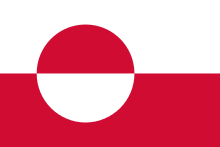 Greenland
Greenland
As a territory of the Kingdom of Denmark, Greenland has a democratically elected home-rule government whose powers may encompass all matters except foreign and national security affairs, police services, and monetary matters. Greenlanders have the same rights throughout the kingdom as other citizens.[499]
The Danish government places no restrictions on access to the Internet and there are no credible reports that e-mail or Internet chat rooms are monitored without appropriate legal authority. Authorities continue to employ an Internet filter designed to block child pornography. In no known cases did the filter affect legitimate sites. The Danish Constitution provides for freedom of speech and press with some limitations such as cases involving child pornography, libel, blasphemy, hate speech, and racism, and the government generally respects these rights in practice.[499]
In April 2013, the registrar for the .gl domain unilaterally voluntarily suspended resolution of thepiratebay.gl, intended to be a new primary Domain Name for the famous Bittorrent search engine The Pirate Bay.[500] This caused transient inconvenience to some File Sharing Internet users.
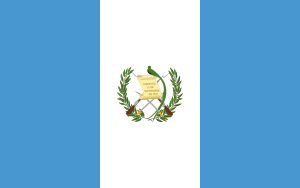 Guatemala
Guatemala
- Classified as no evidence of filtering by ONI in 2011.[1]
Guatemala’s constitution protects freedom of speech, freedom of the press, and individual privacy, however, government officials routinely violate these rights. Recent constitutional reforms have legalized various electronic surveillance techniques that threaten online privacy. The Ley de Proteccion Integral de la Niñez y Adolescencia (Law on the Protection of Children and Adolescents) permits the restriction of content for children younger than eighteen years of age if it is deemed harmful to their development. Media outlets and organizers of public events are required to evaluate and classify programmed content according to this law. The Ley de Emisión del Pensamiento (Law on Expression of Thought) prohibits libel, slander, and treason in printed form, and stipulates that the author of any publication containing an opinion that the judiciary considers to be subversive, morally damaging, or “disrespectful” of private life may be subject to punishment. The Law on Expression of Thought explicitly requires newspapers that have incorrectly attributed acts to or published false information about people or entities to publish any corrections, explanations, or refutations sent to them by those they have accused. In cases of printed material that involves treason, is subversive, is “damaging to morals", or contains slander or libel, newspapers may be subject to a trial by jury; decisions may be appealed within 48 hours. The law makes an exception when the offended party is a government employee or official: if the offending content concerns “purely official acts” related to government work, the case will be judged in a “court of honor", and the decision will be final and closed to appeal. The Ley de Orden Público (Law of Public Order) states that if the government has declared the country to be “in a state of siege", journalists must “refrain from publishing anything that might cause confusion or panic.”[501]
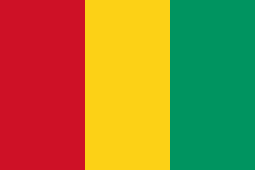 Guinea
Guinea
There are no government restrictions on access to the Internet or credible reports that the government monitors e-mail or Internet chat rooms without judicial oversight. Internet usage is very low, reaching just 1.5% of the population in 2012[419] and as a result the Internet plays only a very small role in the political or economic life of the country.[502]
The constitution and law provide for freedom of speech and of the press, but the government, nevertheless, restricts these freedoms. Libel against the head of state, slander, and false reporting are subject to heavy fines. Although the constitution and law provide for the inviolability of the home and legal searches require judicial search warrants, police reportedly ignore legal procedures in the pursuit of criminal suspects or when it serves their personal interests.[502]
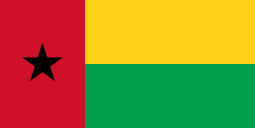 Guinea-Bissau
Guinea-Bissau
There are no government restrictions on access to the Internet or reports that the government monitors e-mail or Internet chat rooms without judicial oversight. Internet usage is very low, reaching just 2.9% of the population in 2012[419] and as a result the Internet plays only a small role in the political or economic life of the country.[503]
The constitution and law provide for freedom of speech and press; however, there are reports that the government does not always respect these rights. The constitution and law prohibit arbitrary interference with privacy, family, home, or correspondence, but the government does not always respect these prohibitions in practice. Police routinely ignore privacy rights and protections against unreasonable search and seizure.[503]
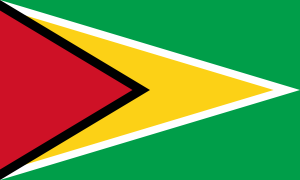 Guyana
Guyana
There are no government restrictions on access to the Internet or credible reports that the government monitors e-mail or Internet chat rooms without judicial oversight.[504]
The law provides for freedom of speech including for members of the press, and the government generally respects this right in practice. Government officials use libel laws to suppress criticism. The law prohibits arbitrary interference with privacy, family, home, or correspondence, and the government generally respects these prohibitions in practice. A 2008 law allows for the interception of communications through a warrant issued by a judge, exceptions being in the case of a national emergency or where approval for a warrant is impracticable due to the urgency of the matter.[504]
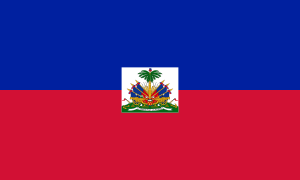 Haiti
Haiti
There are no government restrictions on access to the Internet in Haiti or credible reports that the government monitors e-mail or Internet chat rooms without judicial oversight. Regardless, the effect of this is minor, as less than 4.8% of the country has access to a computer or mobile device.[505]
The law provides for freedom of speech and press, and the government and elected officials generally respect these rights in practice. Journalists complain about defamation lawsuits that the government threatens or files against the press for statements made about public officials or private figures in the public arena. Defamation carries both criminal and civil penalties. Some journalists practice self-censorship on stories related to drug trafficking or allegations of business and political corruption, likely due to past patterns of retribution against activists and journalists engaged in investigative reporting. The law prohibits arbitrary interference with privacy, family, home, or correspondence, but the government does not always respect these prohibitions in practice.[505]
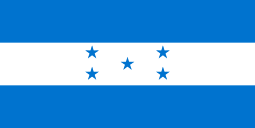 Honduras
Honduras
There are no government restrictions on access to the Internet or credible reports that the government monitors e-mail or Internet chat rooms without judicial oversight. The constitution and laws provide for freedom of speech and press, and the government generally respects these rights in practice. The constitution and law generally prohibit arbitrary interference with privacy, family, home, or correspondence.[506]
Reports of harassment of journalists and social communicators (persons not employed as journalists, but who serve as bloggers or conduct public outreach for NGOs) continued to rise. There also were multiple reports of intimidation of members of the media and their families. Members of the media and NGOs stated that the press “self-censored” due to fear of reprisal from organized crime.[506]
 Hungary
Hungary
- Rated "free" in Freedom on the Net by Freedom House in 2012 (score 19), 2013 (score 23), 2014 (score 24), and 2015 (score 24).[507][508][509][510]
- No ONI country profile, but shown as no evidence in all areas (political, social, conflict/security, and Internet tools) on the ONI global Internet filtering maps.[434]
There are no government restrictions on access to the Internet or reports that the government monitors e-mail or Internet chat rooms. Individuals and groups engage in the peaceful expression of views via the Internet, including by e-mail.[511]
The constitution and law provide for freedom of speech and of the press, and the government generally respects these rights in practice. The constitution and law prohibit arbitrary interference with privacy, family, home, or correspondence, and the government generally respects these prohibitions in practice.[511]
 Iceland
Iceland
- Not individually classified by ONI, but included in the regional overview for the Nordic Countries.[444]
Censorship is prohibited by the Icelandic Constitution and there is a strong tradition of protecting freedom of expression that extends to the use of the Internet.[512] However, questions about how best to protect children, fight terrorism, prevent libel, and protect the rights of copyright holders are ongoing in Iceland as they are in much of the world.
The five Nordic countries—Denmark, Finland, Norway, Sweden, and Iceland—are central players in the European battle between file sharers, rights holders, and Internet service providers (ISPs). While each country determines its own destiny, the presence of the European Union (EU) is felt in all legal controversies and court cases. Iceland, while not a member of the EU, is part of the European Economic Area (EEA) and has agreed to enact legislation similar to that passed in the EU in areas such as consumer protection and business law.[444]
Internet service providers in Iceland use filters to block Web sites distributing child pornography. Iceland's ISPs in cooperation with Barnaheill—Save the Children Iceland participate in the International Association of Internet Hotlines (INHOPE) project. Suspicious links are reported by organizations and the general public and passed on to relevant authorities for verification.[444]
In 2012 and 2013 Ögmundur Jónasson, Minister of Interior, proposed two bills to the Icelandic parliament that would limit Icelander's access to the Internet. The first proposed limitations on gambling[513] and the second on pornography.[514][515] Neither bill was passed by parliament and a new government has since been formed following the parliamentary election held on 27 April 2013.[516]
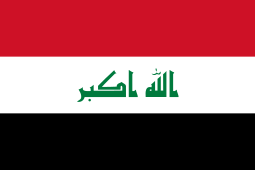 Iraq
Iraq
- Listed as no evidence in all four areas (political, social, conflict/security, and Internet tools) by ONI in August 2009.[517]
There are no overt government restrictions on access to the Internet or official acknowledgement that the government monitors e-mail or Internet chat rooms without judicial oversight. NGOs report that the government could and was widely believed to monitor e‑mail, chat rooms, and social media sites through local Internet service providers.[518]
The constitution broadly provides for the right of free expression, provided it does not violate public order and morality or express support for the banned Baath Party or for altering the country’s borders by violent means. In practice the main limitation on individual and media exercise of these rights is self-censorship due to real fear of reprisals by the government, political parties, ethnic and sectarian forces, terrorist and extremist groups, or criminal gangs. Libel and defamation are offenses under the penal law and the 1968 Publications Law with penalties of up to seven years' imprisonment for publicly insulting the government.[518]
The constitution mandates that authorities may not enter or search homes except with a judicial order. The constitution also prohibits arbitrary interference with privacy. In practice security forces often entered homes without search warrants and took other measures interfering with privacy, family, and correspondence.[518]
 Ireland
Ireland
- Not individually classified by ONI.
Internet censorship in Ireland is a controversial issue with the introduction of a graduated response policy in 2008 followed by an effort to block certain file sharing sites starting in February 2009.[519] Grassroots campaigns including "Blackout Ireland" and "Boycott Eircom" have been established to protest the censorship.[520]
Beyond these issues there are no government restrictions on access to the Internet or credible reports that the government monitored e-mail or Internet chat rooms. Individuals and groups could engage in the expression of views via the Internet, including by e-mail. Irish law provides for freedom of speech including for members of the press, and the government generally respects these rights in practice. An independent press, an effective judiciary, and a functioning democratic political system act jointly to ensure freedom of speech and of the press.[521]
Currently, Eircom is using the "three-strikes" program for users who are attempting to access the blocked sites and is still met with a lot of backlash.
 Israel
Israel
- Listed as no evidence in all four areas (political, social, conflict/security, and Internet tools) by ONI in August 2009.[11]
The Orthodox Jewish parties in Israel proposed an internet censorship legislation would only allow access to pornographic Internet sites for users who identify themselves as adults and request not to be subject to filtering. In February 2008 the law passed in its first of three votes required,[522] however, it was rejected by the government's legislation committee on 12 July 2009.[523]
 Italy
Italy
- Rated "free" by Freedom House in Freedom on the Net in 2011 (score 26), 2012 (score 23), 2013 (score 23), 2014 (score 22), and 2015 (score 23).[524][525][526][527][528]
- Listed as selective in the social area and as no evidence in political, conflict/security, and Internet tools by ONI in December 2010.[11]
Internet filtering in Italy is applied against child pornography,[529][530] gambling, and some P2P web-sites.[531][532] The Pirate Bay website and IP Address are unreachable from Italy,[533] blocked directly by Internet Service Providers. A controversial verdict issued by the Court of Bergamo and later confirmed by the Supreme Court, allowed the blocking, stating that it was useful in order to prevent copyright infringement. Pervasive filtering is applied to gambling websites that do not have a local license to operate in Italy.[534][535][536] An anti-terrorism law, amended in 2005 by then-Minister of the Interior Giuseppe Pisanu after the terrorists attacks in Madrid and London,[537] restricts the opening of new Wi-Fi Hotspots.[538] In August 2013 restrictions on Wi-Fi access were largely removed by the Decreto Fare decree.[539]
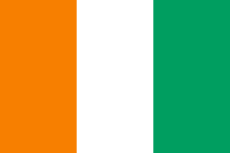 Ivory Coast
Ivory Coast
There are no government restrictions on access to the Internet or reports that the government monitors e-mail or Internet chat rooms without appropriate legal authority. Authorities permit suspended newspapers to publish their full content online. Internet use in the country is low and the Internet does not yet play a large role in the political or economic life of the country.[540]
The constitution and law provide for freedom of speech and press; however, there are limited restrictions on press freedom. The law prohibits incitement to violence, ethnic hatred, rebellion, and insulting the head of state or other senior members of the government. Criminal libel is punishable by one to three years in prison. Libel deemed to threaten the national interest is punishable by six months to five years in prison.[540]
The constitution and law provide rights protecting against arbitrary interference with privacy, family, home, or correspondence, but the government does not always respect these rights in practice.[540]
 Jamaica
Jamaica
There are no government restrictions on access to the Internet or credible reports that the government monitors e-mail or Internet chat rooms without judicial oversight.[541]
The law provides for freedom of speech and press, and the government generally respects these rights in practice. The independent media are active and express a wide variety of views without restriction. Although the constitution prohibits arbitrary interference with privacy, family, home, or correspondence, in practice the police conduct searches without warrants.[541]
A law decriminalizing defamation was passed by the Jamaican House of Representatives in November 2013 after being approved unanimously by the Senate the previous July. It took six years to amend the libel and slander laws, which – although little used – made media offences punishable by imprisonment.[542]
 Japan
Japan
- Rated "free" in Freedom on the Net by Freedom House in 2013 (score 22), 2014 (score 22), and 2015 (score 22).[543][544][545]
- Japan is not individually classified by ONI[1] and does not appear on the RWB lists.[3]
Japanese law provides for freedom of speech and of the press, and the government respects these rights in practice. These freedoms extend to speech and expression on the Internet. An effective judiciary and a functioning democratic political system combine to ensure these rights. There are no government restrictions on access to the Internet or reports that the government monitors e-mail or Internet activities. Individuals and groups engage in the peaceful expression of views via the Internet, including by e-mail.[546] Freedom House's Freedom in the World 2011 reports that "Internet access is not restricted" in Japan,[547] while their Freedom on the Net 2013 reports Japan's "Internet freedom status" as "free".[548]
- Legislation criminalizing the use of the Internet for child pornography and the solicitation of sex from minors was passed in 2003.[549]
- Speech was limited for twelve days before the December 2012 election under a law banning campaigning online. The legislature overturned the law in April 2013, but kept restrictions on campaign e-mail.[548]
- Amendments to the copyright law in 2012 criminalized intentionally downloading content that infringes on copyright. There were calls for civil rather than criminal penalties in such cases. Downloading this content may lead up to 2 years in prison.[548]
- Anti-Korean and anti-Chinese hate speech proliferated online in 2012 and 2013 amid real-world territorial disputes.[548]
 Kenya
Kenya
- Rated as "partly free" in Freedom on the Net reports by Freedom House in the 2009 (score 34) and 2011 (score 32).[550][551] The rating improved to "free" in 2012 (score 29), 2013 (score 28), 2014 (score 28), and 2015 (score 29).[552][553][554][555]
- There is no ONI country profile for Kenya.[11]
The government does not employ technical filtering or any administrative censorship system to restrict access to political or other content.[556] There are no government restrictions on access to the Internet, but Internet services are limited in rural areas due to lack of infrastructure. In 2008, approximately 8.6 percent of Kenyans used the Internet.[557] By 2012 this figure had grown to 32.1%.[419][558]
The constitution protects freedom of expression and the "freedom to communicate ideas and information." However, it also grants the government the authority to punish defamation, protect privileged information, and restrict state employees’ "freedom of expression in the interest of defense, public safety, public order, public morality or public health." In January 2009, the government passed a controversial Communications Amendment Act that established that any person who publishes, transmits, or causes to be published in electronic form obscene information commits an offense. The Act also outlines other forms of illegality associated with the use of information and communication technologies.[556]
In July 2009 the government announced that all cell phone users had to provide the government with their name and identification number. This regulation applies to citizens who access the Internet through cell phone-based services as well.[557]
 Laos
Laos
Laos is included in the OpenNet Initiative (ONI) Regional Overview for Asia (2009).[294] ONI found no evidence of Internet filtering in the political, social, conflict/security, and tools areas based on testing performed in 2011.[429]
Very few homes have Internet access; most non-business users depend on Internet cafes located chiefly in the larger urban areas. The International Telecommunication Union (ITU) reported that Internet users numbered approximately 11 percent of the country's inhabitants in 2012.[419] The government controls domestic Internet servers and sporadically monitors Internet usage, but by the end of 2012 it apparently did not have the ability to block access to Web sites. Authorities have developed infrastructure to route all Internet traffic through a single gateway, enabling them to monitor and restrict content. However, they apparently had not utilized this increased capability as of the end of 2012. The law generally protects privacy, including that of mail, telephone, and electronic correspondence, but the government reportedly continues to violate these legal protections when there is a perceived security threat. Security laws allow the government to monitor individuals’ movements and private communications, including via cell phones and e-mail.[559]
 Latvia
Latvia
- No ONI country profile, but shown as no evidence in all areas (political, social, conflict/security, and Internet tools) on the ONI global Internet filtering maps.[434]
The constitution and law provide for freedom of speech and of the press. There are no government restrictions on access to the Internet or reports that the government monitors e-mail or Internet chat rooms. Individuals and groups engage in the peaceful expression of views via the Internet, including by e-mail. According to International Telecommunication Union statistics for 2009, approximately 67 percent of the country's inhabitants used the Internet.[560]
In September 2010 the government's Corruption Prevention and Combating Bureau (KNAB), which enforces campaign laws, removed a satirical film, The Last Bear Slayer, from the on-demand playlist of the partially state-owned cable provider, Lattelecom. The KNAB stated that the film might have constituted election advertising. Reporters Without Borders charged that the prohibition constituted improper censorship, but noted it was ineffective because the film was widely available on the Internet.[560]
 Lebanon
Lebanon
- Rated as "partly free" in Freedom on the Net reports by Freedom House in 2013 (score 45), 2014 (score 47), and 2015 (score 45).[553][554][555]
- Listed as no evidence in all four areas (political, social, conflict/security, and Internet tools) by ONI in August 2009.[11]
Internet traffic in Lebanon is barely controlled. There is no surveillance, but a handful of websites have been blocked. The sites blocked relate to gambling, child pornography, prostitution services, and a few Israeli websites. The blocking is incredibly basic however, covering very few relevant websites, is sometimes done in error, and can be easily bypassed without a need for a VPN for the websites actually blocked.
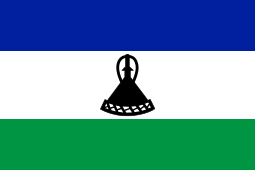 Lesotho
Lesotho
There are no government restrictions on access to the Internet or credible reports that the government monitors e-mail or Internet chat rooms without judicial oversight. The Internet is not widely available and almost nonexistent in rural areas due to the lack of communications infrastructure and high cost of access.[561]
The constitution and law provide for freedom of speech, so long as they do not interfere with "defense, public safety, public order, public morality, or public health". The government generally respects this right. The law prohibits expressions of hatred or contempt for any person because of the person’s race, ethnic affiliation, gender, disability, or color.[561]
 Liberia
Liberia
There are no government restrictions on access to the Internet or reports that the government monitors e-mail or Internet chat rooms.[562]
The constitution provides for freedom of speech and press, and the government generally respects these rights in practice. Libel and national security laws place some limits on freedom of speech. The constitution prohibits arbitrary interference with privacy, family, home, or correspondence, and the government generally respects these prohibitions in practice.[562]
 Lithuania
Lithuania
There are no government restrictions on access to the Internet or credible reports that the government monitors e-mail or Internet chat rooms without appropriate legal authority. Individuals and groups generally engage in the free expression of views via the Internet, including by e-mail, but authorities prosecute people for openly posting material on the Internet that authorities considered to be inciting hatred.[563]
The constitution provides for freedom of speech and press, and the government generally respects these rights in practice. However, the constitutional definition of freedom of expression does not protect certain acts, such as incitement to national, racial, religious, or social hatred, violence and discrimination, or slander, and disinformation. It is a crime to disseminate information that is both untrue and damaging to an individual’s honor and dignity. Libel is punishable by a fine or imprisonment of up to one year, or up to two years for libelous material disseminated through the mass media. While it is illegal to publish material "detrimental to minors’ bodies" or thought processes, information promoting the sexual abuse and harassment of minors, promoting sexual relations among minors, or "sexual relations", the law is not often invoked and there are no indications that it adversely affects freedom of the media.[563]
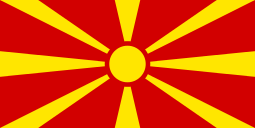 Macedonia
Macedonia
There are no government restrictions on access to the Internet or credible reports that the government monitors e-mail or Internet chat rooms without judicial oversight.[564]
The constitution provides for freedom of speech and press; however, the government does not always respect these rights in practice. The law prohibits speech that incites national, religious, or ethnic hatred, and provides penalties for violations. The law prohibits arbitrary interference with privacy, family, home, or correspondence, and the government generally respects these prohibitions in practice.[564]
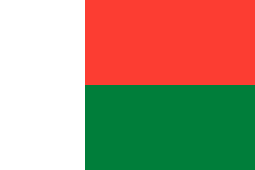 Madagascar
Madagascar
There are generally no restrictions on access to the Internet, or reports that the de facto government monitors e-mail or Internet chat rooms. However, the de facto minister of communication made several statements throughout 2012 about restricting the Internet.[565]
Political groups, parties, and activists use the Internet extensively to advance their agendas, share news, and criticize other parties. Although there have been allegations of technical sabotage of some Web sites, the Internet is considered among the more reliable sources of information, as many Internet servers were outside the country and cannot be regulated by the regime.[565]
The constitution and law provide for freedom of speech and press, but the de facto regime and military actors actively and systematically impeded the exercise of freedoms of expression and of the press. The law prohibits arbitrary Interference with privacy, family, home, or correspondence, but homes and workplaces of opposition groups are subject to arbitrary searches without warrants.[565]
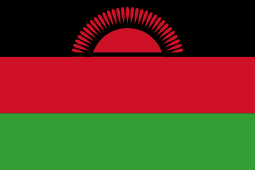 Malawi
Malawi
- Rated "partly free" in the Freedom on the Net report from Freedom House in 2013 (score 42), 2014 (score 42), and 2015 (score 40).[566][567][568]
- Not individually classified by ONI, but is included in the regional overview for sub-Saharan Africa.[131]
Malawi prohibits the publication or transmission of anything “that could be useful to the enemy", as well as religiously offensive and obscene material. Malawi participates in regional efforts to combat cybercrime: the East African Community (consisting of Kenya, Tanzania, and Uganda) and the South African Development Community (consisting of Malawi, Mozambique, South Africa, Zambia, and Zimbabwe) have both enacted plans to standardize cybercrime laws throughout their regions.[131]
 Mexico
Mexico
- Classified as "partly free" in the Freedom on the Net report from Freedom House in 2011 (score 32), 2012 (score 37), 2013 (score 38), 2014 (score 39), and 2015 (score 39).[569][570][571][572][573]
- Classified by ONI as no evidence of filtering in 2011.[1]
Mexican law provides for freedom of speech and press, and the government generally respects these rights in practice. There were no government restrictions on access to the Internet or credible reports that the government monitors e-mail or Internet chat rooms. Individuals and groups can engage in the expression of views via the Internet, including by e-mail.[574]
Transnational Criminal Organizations (TCOs) exercise an increasing influence over media outlets and reporters, at times directly threatening individuals who published critical views of crime groups. As citizens increasingly use social media Web sites such as Twitter and Facebook to obtain and share drug-related news, violence against the users of these sites is rising dramatically.[574] The threats and violence lead to self-censorship in many cases.[575]
In May 2009, the Mexican Federal Electoral Institute (IFE), asked YouTube to remove a parody of Fidel Herrera, governor of the state of Veracruz. Negative advertising in political campaigns is prohibited by present law, although the video appears to be made by a regular citizen which would make it legal. It was the first time a Mexican institution intervened directly with the Internet.[569][576]
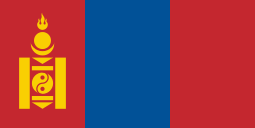 Mongolia
Mongolia
- Mongolia is not individually classified by ONI[1] or in Freedom House's Freedom on the Net 2013 report,[8] and does not appear on the RWB lists.[3]
There are no government restrictions on access to the Internet. The criminal code and constitution prohibit arbitrary interference with privacy, family, home, or correspondence, however, there are reports of government surveillance, wiretapping, and e-mail account monitoring. Individuals and groups engage in the peaceful expression of views via the Internet, including by e-mail.[577] And while there is no official censorship by the government, journalists frequently complain of harassment and intimidation.[578]
Censorship of public information is banned under the 1998 Media Freedom Law, but a 1995 state secrets law severely limits access to government information. The Law on Information Transparency and Right to Information was passed in June 2011, with the legislation taking effect in December 2011. Internet users remain concerned about a February 2011 regulation, the "General Conditions and Requirements on Digital Content", by the Communications Regulatory Commission (CRC) that restricts obscene and inappropriate content without explicitly defining it and requires popular websites to make their users’ IP addresses publicly visible.[578]
 Montenegro
Montenegro
There are no government restrictions on access to the Internet. Until ordered to cease doing so in March 2011, one of the country’s principal Internet service providers gave police direct access to all forms of communications carried on its servers. It is unknown whether authorities made use of this access to monitor e-mail or Internet Web sites or chat rooms. There is no evidence that the government collects or discloses personally identifiable information about individuals based on the individual's peaceful expression of political, religious, or ideological opinion or belief.[579]
The constitution and law provide for freedom of speech and press, but there are some restrictions. The law criminalizes inciting hatred and intolerance on national, racial, and religious grounds, and there have been prosecutions on these grounds.[579]
The constitution and law prohibit arbitrary interference with privacy, family, home, or correspondence without court approval or legal necessity, and prohibit police from searching a residence or conducting undercover or monitoring operations without a warrant. The Agency for National Security (ANB), however, reportedly uses wiretapping and surveillance inappropriately against opposition parties, the international community, NGOs, and other groups without appropriate legal authority. NGOs claimed that police and the state prosecutor’s office illegally monitor citizens' electronic communications and fail to account for how many people or Internet addresses they monitor.[579]
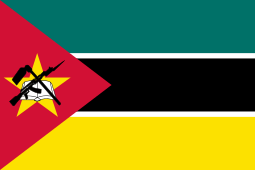 Mozambique
Mozambique
There are no government restrictions on access to the Internet, however, opposition party members report government intelligence agents monitor e-mail.[580]
The constitution and law provide for freedom of speech and the press, and the government generally respects these rights in practice. Individuals can generally criticize the government publicly or privately without reprisal. Some individuals express a fear that the government monitors their private telephone and e-mail communications. Many journalists practice self-censorship.[580]
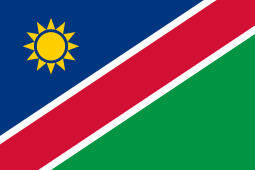 Namibia
Namibia
There are no government restrictions on access to the Internet; however, the Communications Act provides that the intelligence services can monitor e-mail and Internet usage with authorization from any magistrate. There have been some allegations and rumors that the government reviewed ways to block or curtail social media sites, but there is no concrete evidence of such action.[581]
The constitution provides for freedom of speech and of the press, and the government generally respects these rights.[581]
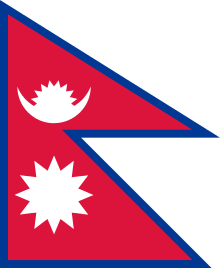 Nepal
Nepal
- Listed as no evidence in all four areas (political, social, conflict/security, and Internet tools) by ONI in May 2007.[11]
In 2007 Nepali journalists reported virtually unconditional freedom of the press, including the Internet, and ONI’s testing revealed no evidence that Nepal imposes technological filters on the Internet.[582]
 Netherlands
Netherlands
- Not individually classified by ONI.
Government-mandated Internet censorship is nonexistent due to the house of representatives speaking out against filtering on multiple occasions, although there have been proposals to filter child pornography and the Netherlands, like many countries, is grappling with how to prevent or control copyright infringement on the Internet.
In 2008 the Minister of Justice proposed a plan to block websites known to contain child pornography. A blacklist created by the Meldpunt ter bestrijding van Kinderpornografie op Internet (Hotline combating Child Pornography on the Internet)[583] would have been used by Internet Service Providers to redirect the websites to a stop page. In 2011 the plan was withdrawn due to an "almost complete lack of websites to block" because the sharing of the material was no longer done by conventional websites, but by other services.[584] The House of Representatives reaffirmed this by voting against the filter later that year, effectively killing any plans for government censorship.[585]
In January 2012, the internet providers Ziggo and XS4all were required by a court order in a case brought by the Bescherming Rechten Entertainment Industrie Nederland (BREIN) to block the website of The Pirate Bay due to copyright infringement.[586] This blocking raised questions within the government, customers, and the internet providers themselves, not only because of the blocking, but also about its randomness and the role of BREIN, an industry trade association that can change the blacklist.[587][588][589]
This law was dropped in January 2014 following a referendum by the ministry with a new law stating that file sharing for private use is allowed while commercial distribution is forbidden.
 New Zealand
New Zealand
- Not individually classified by ONI, but is included in the regional overview for Australia and New Zealand.[382]
Since February 2010 Department of Internal Affairs offers to ISPs voluntary Internet filtering.[590] Participating providers routes suspect destination IP addresses to the Department that blocks desired HTTP requests. Other packets are routed back to correct networks. List of blocked addresses is secret, but it's believed that child pornography is subjected only.
 Nicaragua
Nicaragua
There are no government restrictions on access to the Internet or Internet chat rooms; however, several NGOs claim the government monitors their e-mail. Individuals and groups engage in the expression of views via the Internet, including by e-mail and social media.[591]
The constitution provides for freedom of speech and press, but the government used administrative, judicial, and financial means to limit the exercise of these rights. Although the law provides that the right to information cannot be subjected to censorship, it also establishes retroactive liability, including criminal penalties for libel and slander.[591]
During the November 2012 municipal elections, a popular Web site that allowed voters to register complaints or allegations of election fraud was apparently hacked on several occasions and forced to shut for significant portions of the day. Certain NGOs claimed the Web site was tampered with to prevent dissemination of voter complaints. During 2012 there were several reported cases of threats and violence against the press. On December 11, the spokesman of the Supreme Court of Justice publicly accused the online newsweekly Confidential of being financed by narcotics trafficking organizations, an allegation rights groups said was politically motivated.[591]
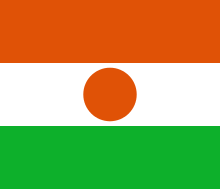 Niger
Niger
There are no government restrictions on access to the Internet or reports that the government monitors e-mail or Internet chat rooms. Although individuals and groups can engage in the peaceful expression of views via the Internet, few residents have access to it.[592]
The constitution and law provide for freedom of speech and press, and the government generally respects these rights in practice. The constitution and law generally prohibit arbitrary interference with privacy, family, home, or correspondence, and the government generally respects these prohibitions.[592]
 Nigeria
Nigeria
- Rated "partly free" by Freedom House in Freedom on the Net in 2011 (score 35), 2012 (score 33), 2013 (score 31), 2014 (score 33), and 2015 (score 33).[593][594][595][596][597]
- Listed as no evidence in all four areas (political, social, conflict/security, and Internet tools) by ONI in October 2009.[11]
There are few government restrictions on access to the Internet or credible reports the government monitors e-mail or Internet chat rooms. Although the constitution and law provide for freedom of speech, including for members of the press, the government sometimes restricts these rights in practice. Libel is a civil offense and requires defendants to prove the truth of opinion or value judgment contained in news reports or commentaries. Militant groups such as Boko Haram threaten, attack, and kill journalists in connection with their reporting of the sect’s activities.[598]
On 24 October 2012 police in Bauchi State arraigned civil servant Abbas Ahmed Faggo before a court for allegedly defaming the character of Governor Isa Yuguda after he posted messages on his Facebook account accusing the governor of spending public funds on his son's wedding. On 4 November, the court discharged Faggo, but media reported the state government fired him later that month.[598]
During 2012 several Internet news sites critical of the government experienced server problems, which site owners attributed to government interference. Such disruptions usually lasted a few hours.[598]
 Norway
Norway
- Classified as no evidence of filtering by ONI in 2009.[1] There is no individual ONI country profile for Norway, but it is included in the regional overview for the Nordic Countries.[444]
Norway's major Internet service providers have a DNS filter which blocks access to sites authorities claim are known to provide child pornography,[599] similar to Denmark's filter. A list claimed to be the Norwegian DNS blacklist was published at Wikileaks in March 2009.[600] The minister of justice, Knut Storberget, sent a letter threatening ISPs with a law compelling them to use the filter should they refuse to do so voluntarily (dated 29 August 2008).[601] Since September 2015 Norway's largest ISPs also block The pirate bay and other similar services.
 Panama
Panama
There are no government restrictions on access to the Internet, but there have been anecdotal reports that the government monitors private e-mails. In a few cases, law enforcement monitoring of suspects’ computers led to arrests for sex crimes.[602]
The constitution provides for freedoms of speech and press, but there have been attempts by the government to impede the media’s freedom of expression and silence criticism of public officials. The Inter-American Commission on Human Rights, Inter-American Press Association, the NGO Reporters Without Borders, and other groups criticized government efforts to censor the press.[602]
In February 2012 indigenous mining protests blocked the Pan American Highway near Vigui in the province of Veraguas and in San Félix District in the province of Chiriquí. The government cut off cell phone and Internet services in Veraguas and Chiriqui Provinces from 3–7 February during the protests.[602]
The law prohibits arbitrary interference with privacy, family, home, or correspondence, and the government generally respects these prohibitions. Nevertheless, there have been complaints that in some cases law-enforcement authorities failed to follow legal requirements and conducted unauthorized searches. The law denies prosecutors authority to order wiretaps on their own and requires judicial oversight. During the year several citizens claimed to have been wiretapping targets after making statements critical of the government.[602]
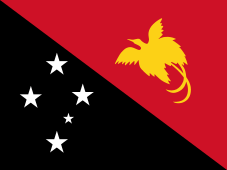 Papua New Guinea
Papua New Guinea
Only 2.3% of the population of Papua New Guinea had access to the Internet in 2012.[419]
There are no government restrictions on access to the Internet or credible reports that the government monitors e-mail or Internet chat rooms without judicial oversight. Individuals and groups engage in the expression of views via the Internet, including by e-mail.[603]
The constitution provides for freedom of speech and press, and the government generally respects these rights in practice. Newspapers offer a variety of editorial viewpoints and report on controversial topics. There is no evidence of officially sanctioned government censorship, although newspaper editors complained of intimidation tactics aimed at influencing coverage. There were some examples of police officers targeting journalists who negatively covered police activities. Although the constitution prohibits arbitrary interference with privacy, family, home, or correspondence, there are instances of abuse.[603]
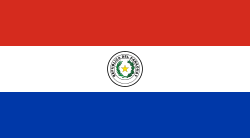 Paraguay
Paraguay
The law in Paraguay provides for freedom of speech and press, and the government generally respects these rights in practice. Individuals criticize the government publicly and privately, generally without reprisal or impediment. There are no government restrictions on access to the Internet or credible reports that the government monitored e-mail or Internet chat rooms. Individuals and groups could engage in the expression of views via the Internet, including by e-mail.[604]
Because of their reporting, journalists are on occasion subjected to harassment, intimidation, and violence—primarily from drug trafficking gangs and criminal syndicates based in departments bordering Brazil but also from politicians. Political officials often retaliate against media criticism by invoking criminal libel laws and suing the media to intimidate journalists and suppress further investigations.[604]
Following the 22 June 2012 parliamentary coup, the new government appears to be assuming complete control of the state-owned media and its hostility is affecting journalists with the privately owned media as well.[605][606][607][608][609]
 Peru
Peru
- Listed as no evidence in all areas (political, social, conflict/security, and Internet tools) by ONI in 2011.[429]
There are no government restrictions on access to the Internet and no reports that the government monitors e-mail or Internet chat rooms. Individuals and groups engage in the free expression of views via the Internet, including by e-mail. The chief impediment to Internet access was a lack of infrastructure; the International Telecommunication Union reported that there were 31 Internet users per 100 inhabitants in 2009.[610]
 Philippines
Philippines
- Rated "free" by Freedom House in Freedom on the Net in 2012 (score 23), 2013 (score 25), 2014 (score 27), and 2015 (score 27).[611][612][613][614]
- There is no ONI country profile for the Philippines,[11] but it is included in the ONI Regional Overview for Asia[294] and the ONI global Internet filtering maps show no evidence of filtering in the political, social, conflict/security, and Internet tools areas.[434]
The constitution provides for freedom of speech and of the press, and the government generally respects these rights. There are no government restrictions on access to the Internet or reports that the government monitors e-mail or Internet chat rooms. Individuals and groups engage in peaceful expressions of views via the Internet, including by e-mail. Internet access is widely available. According to International Telecommunication Union statistics for 2009, approximately 6.5 percent of the country's inhabitants used the Internet.[615]
In 2012 the Republic Act No. 10175 or Cybercrime Prevention Act of 2012 was signed by President Benigno Aquino, which criminalizes acts such as libel done online that are already punishable in other media such as radio, TV, and newspapers, with punishment one level higher than their non-computer counterpart. The Act was greatly endorsed by Senator Tito Sotto, who said that he was cyberbullied because he allegedly plagiarized bloggers and Sen. Robert F. Kennedy.[616] After several petitions submitted to the Supreme Court questioned the constitutionality of the Act,[617] on October 9, 2012, the Supreme Court issued a temporary restraining order, stopping implementation of the Act for 120 days,[618] and extended it on 5 February 2013 "until further orders from the court."[619]
 Poland
Poland
- Not individually classified by ONI, but included in the regional overview for Europe.[400]
Internet censorship legislation that included the creation of a register of blocked web sites was abandoned by the Polish Government in early 2011, following protests and petitions opposing the proposal.[620][621][622]
 Portugal
Portugal
- Portugal is not individually classified by ONI[1] or in Freedom House's Freedom on the Net 2013 report,[8] and does not appear on the RWB lists.[3]
Internet access in Portugal is not restricted.[623] There are neither government restrictions on access to the Internet nor reports that the government monitors e-mail or Internet chat rooms without appropriate legal authority. The constitution and law provide for freedom of speech and press, and the government generally respects these rights in practice. The law criminalizes the denigration of ethnic or religious minorities and the engagement in offensive practices such as Holocaust denial. Prison sentences for these crimes run between six months to eight years.[624]
In March 2015, Portuguese ISP's were ordered to block The Pirate Bay and many of its proxies by a court order, following the European trend, after a lawsuit brought by the Association for Copyright Management, Producers and Publishers (GEDIPE). This is the first time websites were blocked by ISP's in Portugal.[625]
Since July 2015 MAPiNET, the Civic Movement to Combat Piracy on the Internet,[626] has blocked hundreds of websites for copyright infringement.[627]
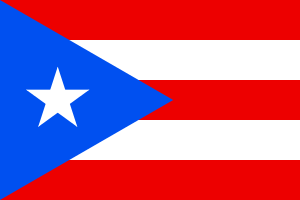 Puerto Rico
Puerto Rico
 Romania
Romania
- Classified by ONI as no evidence of filtering in 2009.[1] There is no individual ONI country profile for Romania, but it is included in the regional overview for Europe.[400]
Internet censorship in Romania is mainly related to the filtering of sites with pornographic content hosted in Romania[628] and the protection of children.[629] Although proposals have been made to censor pornographic sites, so far no sites have been blocked with the exception of a few unlicensed casino-like websites.
 Senegal
Senegal
There are no government restrictions on access to the Internet, or reports that the government monitors e-mail or Internet chat rooms without appropriate legal authority. Individuals and groups engage in the peaceful expression of views via the Internet, including by e‑mail.[630]
The constitution and law provide for freedom of speech and press; however, the government limits these rights in practice. Individuals can generally criticize the government publicly or privately without reprisal. The law criminalizes libel, and libel laws are used to block or punish critical reporting and commentary. The constitution and law prohibit arbitrary interference with privacy, family, home, or correspondence, and the government generally respects these prohibitions in practice.[630]
 Serbia
Serbia
There are no government restrictions on access to the Internet, e-mail, or Internet chat rooms. Most observers believe authorities selectively monitor communications, eavesdrop on conversations, and read mail and e-mail. Human rights leaders also believe that authorities monitor their communications.[631]
The constitution and law provides for freedom of speech and press. However, the constitution specifically allows restrictions on speech "to protect the rights and reputation of others, to uphold the authority and objectivity of the courts and to protect public health, morals of a democratic society and national security of the Republic of Serbia." While the law does not include a specific provision on hate speech, it is a criminal offense to "incite" national, racial, or religious intolerance. In June 2011 the Constitutional Court banned the extreme right-wing organization Nacionalni Stroj (National Front) for promoting racist hate speech.[631]
The law obliges telecommunications operators to retain for one year data on the source and destination of a communication; the beginning, duration, and end of a communication; the type of communication; terminal equipment identification; and the location of the customer's mobile terminal equipment. While these data can be accessed by intelligence agencies without court permission, a court order is required to access the contents of these communications.[631]
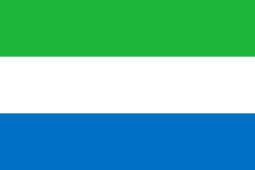 Sierra Leone
Sierra Leone
There are no government restrictions on access to the Internet or credible reports that the government monitors e-mail or Internet chat rooms. Internet usage is very low, reaching just 1.3% of the population in 2012[419] and as a result the Internet plays only a very small role in the political or economic life of the country.[632]
The constitution and law provide for freedom of speech and press, and the government generally respects these rights. The law criminalizes defamatory and seditious libel, but is rarely applied. Its threatened application may stifle expression and journalists do engage in self-censorship. The constitution and laws prohibit arbitrary interference with privacy, family, home, or correspondence, and the government generally respects these prohibitions.[632]
 Slovakia
Slovakia
- Slovakia is not individually classified by ONI[1] or in Freedom House's Freedom on the Net 2013 report,[8] and does not appear on the RWB lists.[3]
There are no government restrictions on access to the Internet or reports that the government monitors e-mail or Internet chat rooms without judicial oversight; however, police monitor Web sites containing hate speech and attempt to arrest or fine the authors.[633]
The constitution and the law provide for freedom of speech and press. While the government mostly respects these rights in practice, in some instances, it limits these rights to impede criticism and limits actions of groups it considers extremist. The law prohibits the defamation of nationalities, punishable by up to three years in prison, and denial of the Holocaust, which carries a sentence of six months to three years in prison. Criminal penalties for defamation are rarely used. The constitution and the law prohibit arbitrary interference with privacy, family, home, or correspondence and the government generally respects these prohibitions in practice. Police must present a warrant before conducting a search or within 24 hours afterwards.[633]
A new draft law under consideration in 2011 would allow the nation's tax office to block web servers that provide online gambling without a Slovakian license. Opponents argue that the economic interests served by the law are not sufficient to justify online censorship.[634]
 Slovenia
Slovenia
- Slovenia is not individually classified by ONI[1] or in Freedom House's Freedom on the Net 2013 report,[8] and does not appear on the RWB lists.[3]
There are no government restrictions on access to the Internet or credible reports that the government monitors e-mail or Internet chat rooms without appropriate legal authority. The constitution and law provide for freedom of speech and press, and the government generally respects these rights. However, the law prohibits hate speech, including incitement to intolerance as well as violence. The law provides criminal penalties for defamation that harms a person’s honor or name.[635] Under the law Internet service providers are responsible for blocking access to Internet gambling web sites that are not licensed by the Slovenian government.[636]
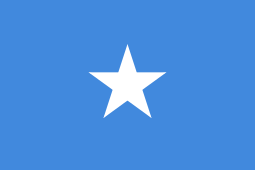 Somalia
Somalia
The ongoing violence associated with the civil war in Somalia has and continues to dramatically affect the media environment.[637]
Internet and mobile telephone services are widely available in large Somali cities, though poverty, illiteracy, and displacement limit access to these resources.[638]
The government does not restrict access to the Internet, and there are no reports that the government monitors e-mail or Internet chat rooms.[639] Some factions reportedly monitor Internet activity.[637]
Somalia’s new provisional federal constitution, adopted by the National Constituent Assembly in August 2012, provides for freedom of speech and the press. At the end of 2012 the government was debating new legislative initiatives, including a telecommunications bill, a revised media law, and a Communications Act. There was significant international support for media law reform, and an intensive effort to undertake such changes was expected in early 2013. However, given the government’s inability to impose its authority over much of Somalia, the practical implications of any new laws remains unclear.[637]
On 8 January 2014 the Islamist militia group al-Shabaab announced that it is banning the Internet in the areas of Somalia that it controls. Internet Service Providers were given 15 days to terminate their service and warned of sanctions for non-compliance. "Any company or individual that is found ignoring the call will be considered to be working with the enemy", the statement said. Al-Shabaab is on Reporters Without Borders list of "Predators of Freedom of Information".[640]
In September 2012 al-Shabaab claimed responsibility for the Mogadishu abduction and beheading of online journalist Abdirahman Mohamed Ali.[639]
 South Africa
South Africa
- Rated "free" in Freedom on the Net by Freedom House in 2009 (score 24), 2011 (score 26), 2012 (score 26), 2013 (score 26), 2014 (score 26), and 2015 (score 27).[641][642][643][644][645][646]
- Not individually classified by ONI, but is included in the regional overview for sub-Saharan Africa.[131]
Digital media freedom is generally respected in South Africa. Political content is not censored, and neither bloggers nor content creators are targeted for their online activities.[647]
In 2006, the government of South Africa began prohibiting sites hosted in the country from displaying X18 (explicitly sexual) and XXX content (including child pornography and depictions of violent sexual acts); site owners who refuse to comply are punishable under the Film and Publications Act 1996. In 2007 a South African "sex blogger" was arrested.[131]
 Spain
Spain
- Spain is not individually classified by ONI[1] or in Freedom House's Freedom on the Net 2013 report,[8] and does not appear on the RWB lists.[3]
There are no government restrictions on access to the Internet or reports that the government monitors e-mail or Internet chat rooms without appropriate legal authority.[648]
The constitution provides for freedom of speech and press, and the government generally respects these rights. The law prohibits, subject to judicial oversight, actions including public speeches and the publication of documents that the government interprets as glorifying or supporting terrorism. The law provides that persons who provoke discrimination, hatred, or violence against groups or associations for racist; anti-semitic; or other references to ideology, religion or belief, family status, membership within an ethnic group or race, national origin, sex, sexual orientation, illness, or disability may be punished with imprisonment for one to three years.[648]
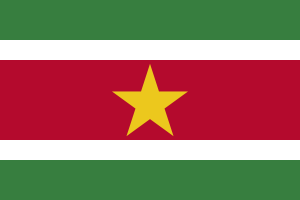 Suriname
Suriname
There are no government restrictions on access to the Internet and the government asserts that it does not monitor e-mail or Internet chat rooms without judicial oversight. However, journalists, members of the political opposition and their supporters, and other independent entities report government interference or oversight of email and social media accounts.[649]
The law provides for freedom of speech and press, and the government generally respects these rights in practice. Some media members practice self-censorship in response to pressure and intimidation by senior government officials or community leaders on journalists who publish negative stories about the administration. In addition many news outlets are affiliated with particular political parties, which discourages journalists from reporting on some subjects. The law prohibits arbitrary interference with privacy, family, home, or correspondence, and the government generally respects these prohibitions in practice. The law requires search warrants, which are issued by quasi-judicial officers who supervise criminal investigations.[649]
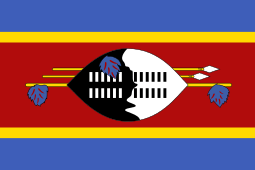 Swaziland
Swaziland
There are no official government restrictions on access to the Internet. There are reports that the government monitors e-mail, Facebook, and Internet chat rooms.[650]
The constitution provides for freedom of speech and press, but the king may deny these rights at his discretion, and the government does at times restrict these rights, especially regarding political issues or the royal family. The law empowers the government to ban publications if they are deemed "prejudicial or potentially prejudicial to the interests of defense, public safety, public order, public morality, or public health."[650]
In March 2012 the Times of Swaziland reported that a number of senators asked that the government take legal action against individuals who criticized King Mswati III on social networking sites. Minister of Justice Mgwagwa Gamedze backed the calls and said he would look for "international laws" that could be used to charge offenders.[650]
 Sweden
Sweden
- Classified by ONI as no evidence of filtering in 2009.[1][4] There is no individual ONI country profile for Sweden, but it is included in the regional overview for the Nordic Countries.[444]
There are no government restrictions on access to the Internet or credible reports that the government monitors e-mail or Internet chat rooms without appropriate legal authority. The constitution provides for freedom of speech and the press, and the government generally respects these rights in practice. The law criminalizes expression considered to be hate speech.[651]
Sweden's major Internet service providers have a DNS filter which blocks access to sites authorities claim are known to provide child pornography.[652] The Swedish police are responsible for updating this list.
The constitution and law prohibit arbitrary interference with privacy, family, home, or correspondence, and the government generally respects these prohibitions in practice. The law permits the signals intelligence agency, National Defense Radio Establishment, to monitor the content of all cross-border cable-based Internet traffic to combat "external threats" such as terrorism and organized crime. Monitoring is only possible after obtaining court permission and upon the explicit request of government or defense agencies. In 2012 parliament passed the EU Data Retention Directive that compels Internet service providers to store data on online communications within the country for six months so that law enforcement agencies have access to it if a court so orders.[651]
On 9 December 2014 The Pirate Bay (TPB) was raided at the Nacka station, a nuclear-proof data center built into a mountain complex near Stockholm. Despite the rise of various TPB clones and rumors of reincarnations, thepiratebay.se domain remained inaccessible.[653] On 13 December 2014 Isohunt created a site called The Old Pirate Bay, which appears to be a resurrection of the thepiratebay.[654] On 21 December 2014 after nearly two weeks of downtime the official domain of The Pirate Bay showed signs of life. ThePirateBay.se was only waving a pirate flag, but that's enough to give many Pirate Bay users hope for a full recovery. A few minutes ago came another big change when The Pirate Bay’s main domain started pointing to a new IP-address connected to a server hosted in Moldova.[655]
 Switzerland
Switzerland
- Switzerland is not individually classified by ONI[1] or in Freedom House's Freedom on the Net 2013 report,[8] and does not appear on the RWB lists.[3]
There were no government restrictions on access to the Internet or credible reports that the government monitored e-mail or Internet chat rooms without appropriate legal authority.[656] The constitution provides for freedom of speech and press, and the government generally respects these rights in practice. The law penalizes public incitement to racial hatred or discrimination, spreading racist ideology, and denying crimes against humanity and it is a crime to publish information based on leaked “secret official discussions.”[656]
In November 2011 the Swiss government ruled that downloading infringing copies of films, music and video games for personal use will remain legal, because it is not detrimental to copyright owners.[657][658]
In 2010 the Federal Supreme Court of Switzerland found that IP addresses are personal information and that under Swiss privacy laws they may not be used to track Internet usage without the knowledge of the individuals involved.[659]
In December 2002 a local Swiss magistrate ordered several Swiss ISPs to block access to three Web sites hosted in the United States that were strongly critical of Swiss courts, and to modify their DNS-servers to block the domain appel-au-people.org.[660]
 Taiwan
Taiwan
Taiwan's constitution provides for freedom of speech and press, and the authorities generally respect these rights in practice. An independent press, an effective judiciary, and a functioning democratic political system combine to protect freedom of speech and press. There are no official restrictions on access to the Internet or credible reports that the authorities monitor e-mail or Internet chat rooms without judicial oversight. The extent to which child prostitution occurs is difficult to measure because of increased use of the Internet and other sophisticated communication technologies to solicit clients.[661]
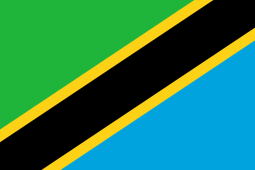 Tanzania
Tanzania
There are no government restrictions on access to the Internet; however, the government monitors Web sites that criticize the government. Police also monitor the Internet to combat illegal activities.[662]
The constitution provides for freedom of speech, but does not explicitly provide for freedom of the press. The law generally prohibits arbitrary interference with privacy, family, home, or correspondence without a search warrant, but the government does not consistently respect these prohibitions. It is widely believed that security forces monitor telephones and correspondence of some citizens and foreign residents. The actual nature and extent of this practice is unknown.[662]
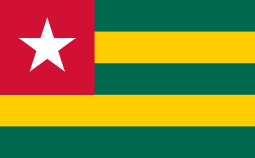 Togo
Togo
There are no known government restrictions on access to the Internet or reports the government monitors e-mail or Internet chat rooms without judicial oversight. Although the constitution provides for freedom of speech and press, the government restricts these rights.[663]
The constitution and law prohibit arbitrary interference with privacy, family, home, or correspondence, and the government generally respects these prohibitions. In criminal cases a judge or senior police official may authorize searches of private residences. Citizens believe the government monitors telephones and correspondence, although such surveillance has not been confirmed.[663]
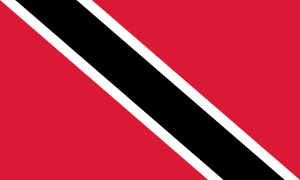 Trinidad and Tobago
Trinidad and Tobago
There are no government restrictions on access to the Internet or credible reports that the government monitors e-mail or Internet chat rooms without judicial oversight.[664]
The constitution and the law provide for freedom of speech and press, and the government generally respects these rights in practice. The constitution and the law prohibit arbitrary interference with privacy, family, home, or correspondence, and the government generally respects these prohibitions in practice.[664]
 Uganda
Uganda
- Rated "partly free" in Freedom on the Net by Freedom House in 2012 (score 34), 2013 (score 34), 2014 (score 34), and 2015 (score 36).[665][666][667][668]
- Listed as no evidence in all four areas (political, social, conflict/security, and Internet tools) by ONI in September 2009.[11]
Though Uganda has made great technological strides in the past five years, the country still faces a number of challenges in obtaining affordable, reliable Internet bandwidth. This, rather than a formal government-sponsored filtering regime, is the major obstacle to Internet access. Just prior to the presidential elections in February 2006, the Uganda Communications Commission (UCC) blocked the anti-government Web site RadioKatwe in the only internationally reported case of Internet filtering in Uganda to date.[669]
 Ukraine
Ukraine

- Rated "free" in the Freedom on the Net report by Freedom House in 2012 (score 27) and 2013 (score 28), and as "partly free" in 2014 (score 33) and 2015 (score 37).[670][671][672][673]
- Listed as no evidence in all four areas (political, social, conflict/security, and Internet tools) by ONI in December 2010.[674]
The Freedom on the Net 2013 report found the Internet in Ukraine to be "largely unhindered" with "no practice of institutionalized blocking or filtering, or a regulatory framework for censorship of content online", but that "there have been attempts at creating legislation which could censor or limit content" and would "present indirect threats to freedom of information online."[671]
Ukraine possesses relatively liberal legislation governing the Internet and access to information. The Law on Protection of Public Morals of 20 November 2003, prohibits the production and circulation of pornography; dissemination of products that propagandize war or spread national and religious intolerance; humiliation or insult to an individual or nation on the grounds of nationality, religion, or ignorance; and the propagation of "drug addition, toxicology, alcoholism, smoking and other bad habits."[674]
The constitution and laws provide for freedom of speech and press. However, the government does not always respect these rights in practice. Local media observers express concern over high monetary damages that at times were demanded and awarded for alleged libel.[675]
The constitution prohibits arbitrary interference with privacy, family, home, or correspondence, however, in practice authorities generally do not respect these prohibitions. Law enforcement bodies are known to monitor the Internet, at times without appropriate legal authority. There have been occasional agitations of interference by law enforcement agencies with prominent bloggers and online publications.[675]
 Uruguay
Uruguay
There are no government restrictions on access to or usage of the Internet[676] or credible reports that the government monitors e-mail or Internet chat rooms without judicial oversight.[677]
Uruguayan law provides for freedom of speech and press, and the government generally respects these rights in practice. An independent press, an effective judiciary, and a functioning democratic political system combine to ensure these rights. The law also prohibits arbitrary interference with privacy, family, home, or correspondence, and the government generally respects these prohibitions in practice.[677]
 Venezuela
Venezuela
- Rated "partly free" by Freedom House in Freedom on the Net in 2011 (score 46), 2012 (score 48), 2013 (score 53), 2014 (score 56), and 2015 (score 57).[678][679][680][681][682]
- Classified by ONI as no evidence of Internet filtering in the political, social, conflict/security, and Internet tools areas in October 2012.[1]
Access to the Internet in Venezuela continues to be largely unrestricted. The level of self-censorship is hard to evaluate, but the adoption of legislation that could potentially limit Internet freedom has yet to have any damaging effect in practice. As a result, RWB removed Venezuela from its list of countries under surveillance.[3]
In December 2010, the government of Venezuela approved a law named "Social Responsibility in Radio, Television and Electronic Media" (Ley de Responsabilidad Social en Radio, Televisión y Medios Electrónicos). The law is intended to exercise control over content that could "entice felonies", "create social distress", or "question the legitimate constituted authority". The law indicates that the website's owners will be responsible for any information and contents published, and that they will have to create mechanisms that could restrict without delay the distribution of content that could go against the aforementioned restrictions. The fines for individuals who break the law will be of the 10% of the person's last year's income. The law was received with criticism from the opposition on the grounds that it is a violation of freedom of speech protections stipulated in the Venezuelan constitution, and that it encourages censorship and self-censorship.[683]
In November 2013 the Venezuelan telecommunications regulator, CONATEL, began ordering ISPs to block websites that provide the black market exchange rate. ISPs must comply within 24 hours or face sanctions, which could include the loss of their concessions. Within a month ISPs had restricted access to more than 100 URLs. The order is based on Venezuela's 2004 media law which makes it illegal to disseminate information that could sow panic among the general public.[684]
Starting on 12 February 2014 the Venezuelan government blocked users’ online images on Twitter. The move appears to be an attempt to limit images of protests against shortages and the world's highest inflation rate. Clashes between opposition-affiliated students and armed pro-government socialist collectives left at least three dead, 66 injured, and 118 under detention.[685] It was reported that the image blocking had ended by the morning of 15 February.[686]
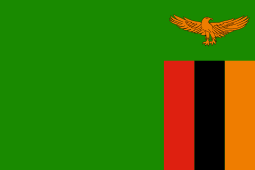 Zambia
Zambia
- Rated "partly free" by Freedom House in Freedom on the Net in 2014 (score 43) and 2015 (score 40).[687][688]
Internet access is not restricted and individuals and groups freely express their views via the Internet, however the government frequently threatens to deregister critical online publications and blogs.[689]
The constitution and law provide for freedom of speech and press, however the government uses provisions contained in the law to restrict these freedoms. The government is sensitive to opposition and other criticism and has been quick to prosecute critics using the legal pretext that they had incited public disorder. Libel laws are used to suppress free speech and the press. The constitution and law prohibit arbitrary interference with privacy, family, home, or correspondence, but the government frequently does not respect these prohibitions.[689]
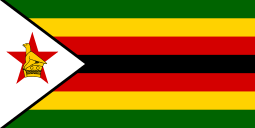 Zimbabwe
Zimbabwe
- Rated "partly free" by Freedom House in Freedom on the Net in 2011 (score 54), 2012 (score 54), 2013 (score 54), 2014 (score 55), and 2015 (score 56).[690][691][692][693][694]
- Listed as no evidence in all four areas (political, social, conflict/security, and Internet tools) by ONI in September 2009.[11]
Because Internet penetration in Zimbabwe is low, it is mainly used for e-mail and the government focuses its efforts to control the Internet to e-mail monitoring and censorship. Though its legal authority to pursue such measures is contested, the government appears to be following through on its wishes to crack down on dissent via e-mail.[695]
See also
- Global Internet Freedom Task Force - an initiative of the U.S. Department of State
- Internet Censorship in the Arab Spring
- International Freedom of Expression Exchange – monitors Internet censorship worldwide
- Reporters sans frontières (Reporters Without Borders)
References
-
 This article incorporates public domain material from the United States Department of State document "Country Reports on Human Rights Practices" by the Bureau of Democracy, Human Rights, and Labor.
This article incorporates public domain material from the United States Department of State document "Country Reports on Human Rights Practices" by the Bureau of Democracy, Human Rights, and Labor. -
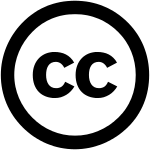 This article incorporates licensed material from the Country Profiles, Regional Overviews, and Filtering Maps sections of the OpenNet Initiative web site.[696]
This article incorporates licensed material from the Country Profiles, Regional Overviews, and Filtering Maps sections of the OpenNet Initiative web site.[696]
- 1 2 3 4 5 6 7 8 9 10 11 12 13 14 15 16 17 18 19 20 21 22 23 24 25 26 27 28 29 30 31 32 33 34 35 36 OpenNet Initiative "Summarized global Internet filtering data spreadsheet", 29 October 2012 and "Country Profiles", the OpenNet Initiative is a collaborative partnership of the Citizen Lab at the Munk School of Global Affairs, University of Toronto; the Berkman Center for Internet & Society at Harvard University; and the SecDev Group, Ottawa
- 1 2 3 4 5 6 7 8 9 "Internet Enemies", Enemies of the Internet 2014: Entities at the heart of censorship and surveillance, Reporters Without Borders (Paris), 11 March 2014. Retrieved 24 June 2014.
- 1 2 3 4 5 6 7 8 9 10 11 12 13 14 15 16 17 18 19 20 21 22 23 24 25 26 27 28 29 30 31 32 33 34 35 36 37 38 39 40 41 42 43 44 45 46 47 48 49 Internet Enemies, Reporters Without Borders (Paris), 12 March 2012
- 1 2 3 Due to legal concerns the OpenNet Initiative does not check for filtering of child pornography and because their classifications focus on technical filtering, they do not include other types of censorship.
- 1 2 Freedom on the Net 2009, Freedom House, accessed 16 April 2012
- 1 2 Freedom on the Net 2011, Freedom House, accessed 15 April 2012
- 1 2 3 4 Freedom on the Net 2012, Freedom House, accessed 24 September 2012
- 1 2 3 4 5 6 7 8 9 10 11 Freedom on the Net 2013, Freedom House, 3 October 2013. Retrieved 12 October 2013.
- 1 2 3 "Full Report" (PDF). Freedom on the Net 2014. Freedom House. Retrieved 14 December 2014.
- 1 2 "Freedom on the Net 2015" (PDF). Freedom House. October 2015. Retrieved 27 December 2015.
- 1 2 3 4 5 6 7 8 9 10 11 12 13 14 15 16 17 18 19 20 21 22 23 24 25 26 27 28 29 30 31 32 33 34 35 36 37 38 39 40 41 42 43 44 45 46 47 48 49 50 "ONI Country Profiles", Research section at the OpenNet Initiative web site, a collaborative partnership of the Citizen Lab at the Munk School of Global Affairs, University of Toronto; the Berkman Center for Internet & Society at Harvard University; and the SecDev Group, Ottawa
- ↑ "West Censoring East: The Use of Western Technologies by Middle East Censors, 2010–2011", Helmi Noman and Jillian C. York, OpenNet Initiative, March 2011
- ↑ Freedom of connection, freedom of expression: the changing legal and regulatory ecology shaping the Internet, Dutton, William H.; Dopatka, Anna; Law, Ginette; Nash, Victoria, Division for Freedom of Expression, Democracy and Peace, United Nations Educational, Scientific and Cultural Organization (UNESCO), Paris, 2011, 103 pp., ISBN 978-92-3-104188-4
- ↑ "Looking Forward: A Note of Appreciation and Closure on a Decade of Research", OpenNet Initiative, 18 December 2014. Retrieved 11 April 2015.
- 1 2 3 4 5 List of the 13 Internet enemies Reporters Without Borders (Paris), 11 July 2006.
- ↑ "Internet enemies", Reporters Without Borders (Paris), 12 March 2009.
- ↑ Web 2.0 versus Control 2.0. Reporters Without Borders (Paris), 18 March 2010.
- 1 2 3 4 5 6 7 8 The Enemies of the Internet Special Edition : Surveillance, Reporters Without Borders, 12 March 2013
- ↑ "Appendix A: Notes on Preparation of the Country Reports and Explanatory Notes". Country Reports on Human Rights Practices for 2014. Bureau of Democracy, Human Rights, and Labor, U.S. Department of State. 16 April 2015. Retrieved 31 December 2015.
- ↑ "Country Reports on Human Rights Practices". Bureau of Democracy, Human Rights, and Labor, U.S. Department of State. Retrieved 31 December 2015.
- ↑ "Bahrain", Freedom on the Net 2011, Freedom House, 2011. Retrieved 13 June 2015.
- ↑ "Bahrain", Freedom on the Net 2012, Freedom House, 2012. Retrieved 13 June 2015.
- ↑ "Bahrain", Freedom on the Net 2013, Freedom House, 2013. Retrieved 13 June 2015.
- ↑ "Bahrain". Freedom on the Net 2014. Freedom House, 2014. Retrieved 13 June 2015.
- ↑ "Bahrain". Freedom on the Net 2015. Freedom House, 2015. Retrieved 2 January 2016.
- ↑ Resolution No 1 of 2009, Ministry of Culture and Information, published in Official Gazette, Issue No.2877, dated 8 January 2009
- ↑ "Belarus", Freedom on the Net 2011, Freedom House, 2011. Retrieved 13 June 2015.
- ↑ "Belarus", Freedom on the Net 2012, Freedom House, 2012. Retrieved 13 June 2015.
- ↑ "Belarus", Freedom on the Net 2013, Freedom House, 2013. Retrieved 13 June 2015.
- ↑ "Belarus". Freedom on the Net 2014. Freedom House. Retrieved 13 June 2015.
- ↑ "Belarus". Freedom on the Net 2015. Freedom House. Retrieved 2 January 2016.
- ↑ "ONI Country Profile: Belarus", OpenNet Initiative, 18 November 2010
- ↑ "China", Freedom on the Net 2009, Freedom House, 2009. Retrieved 13 June 2015.
- ↑ "China", Freedom on the Net 2011, Freedom House, 2011. Retrieved 13 June 2015.
- ↑ "China", Freedom on the Net 2012, Freedom House, 2012. Retrieved 13 June 2015.
- ↑ "China", Freedom on the Net 2013, Freedom House, 2013. Retrieved 13 June 2015.
- ↑ "China". Freedom on the Net 2014. Freedom House. Retrieved 13 June 2015.
- ↑ "China". Freedom on the Net 2015. Freedom House. Retrieved 2 January 2016.
- ↑ "Internet Censorship in China". The New York Times. December 28, 2012. Retrieved 9 March 2013.
- ↑ Thomas Lum; Hannah Fischer (25 January 2010). Human Rights in China: Trends and Policy Implications (PDF) (Report). Congressional Research Service, Library of Congress, USA.
- ↑ Human Rights Watch. "World Report 2012: China". Retrieved 9 March 2013.
- ↑ "Cuba", Freedom on the Net 2009, Freedom House, 2009. Retrieved 13 June 2015.
- ↑ "Cuba", Freedom on the Net 2011, Freedom House, 2011. Retrieved 13 June 2015.
- ↑ "Cuba", Freedom on the Net 2012, Freedom House, 2012. Retrieved 13 June 2015.
- ↑ "Cuba", Freedom on the Net 2013, Freedom House, 2013. Retrieved 13 June 2015.
- ↑ "Cuba". Freedom on the Net 2014. Freedom House. Retrieved 13 June 2015.
- ↑ "Cuba". Freedom on the Net 2015. Freedom House. Retrieved 31 December 2015.
- ↑ "Minister blames US embargo for low number of Cubans online". Reporters Without Borders. 13 February 2007.
- ↑ Timothy Sprinkle (8 November 2006). "Press Freedom Group Tests Cuban Internet Surveillance". World Politics Review.
- ↑ "Journalist sentenced to four years in prison as "pre-criminal social danger"". Reporters Without Borders. Retrieved 18 April 2007.
- ↑ "Yoani Sánchez: El aumento de la represión coincide con una mayor presencia de los blogueros en las calles (Yoani Sanchez: The increased repression coincides with a greater presence of bloggers on the streets)" (in Spanish). Cuba Verdad. 4 January 2010.
- ↑ "Los videos del mitin de repudio contra Reinaldo Escobar (Videos repudiation rally against Reinaldo Escobar)" (in Spanish). Penúltimos Días. 21 November 2009.
- ↑ "CPJ Special Report 2006".
- ↑ "Ethiopia", Freedom on the Net 2011, Freedom House, 2011. Retrieved 13 June 2015.
- ↑ "Ethiopia", Freedom on the Net 2012, Freedom House, 2012. Retrieved 13 June 2015.
- ↑ "Ethiopia", Freedom on the Net 2013, Freedom House, 2013. Retrieved 13 June 2015.
- ↑ "Ethiopia". Freedom on the Net 2014. Freedom House. Retrieved 13 June 2015.
- ↑ "Ethiopia". Freedom on the Net 2015. Freedom House. Retrieved 2 January 2016.
- ↑ "Update on information controls in Ethiopia", Irene Poetranto, OpenNet Initiative, 1 November 2012
- ↑ "ONI Country Profile: Ethiopia", OpenNet Initiative, September 2009
- ↑ "Iran". Freedom on the Net 2009. Freedom House, 2009. Retrieved 2 January 2016.
- ↑ "Iran". Freedom on the Net 2011. Freedom House, 2011. Retrieved 2 January 2016.
- ↑ "Iran". Freedom on the Net 2012. Freedom House, 2012. Retrieved 2 January 2016.
- ↑ "Iran". Freedom on the Net 2013. Freedom House, 2013. Retrieved 2 January 2016.
- ↑ "Iran". Freedom on the Net 2014. Freedom House, 2014. Retrieved 2 January 2016.
- ↑ "Iran". Freedom on the Net 2015. Freedom House, 2015. Retrieved 2 January 2016.
- ↑ "ONI Country Profile: Iran", OpenNet Initiative, 16 June 2009
- 1 2 3 4 5 6 "ONI: Internet Filtering Map" (Flash). Open Net Initiative. Retrieved 7 July 2010.
- ↑ "Authorities urged to halt threats to "cyber-feminists" – Iran". Reporters Without Borders. Retrieved 18 May 2008.
- ↑ "Internet "black holes" – Iran". Reporters Without Borders. Archived from the original on 17 March 2007. Retrieved 31 August 2006.
- ↑ "Iran blocks access to video-sharing on YouTube". Tehran(AP): USA Today. 5 December 2006. Retrieved 12 December 2006.
- ↑ "Cracking Down on Digital Communication and Political Organizing in Iran", Rebekah Heacock, OpenNet Initiative, 15 June 2009
- ↑ ONI Country Profile: Kuwait", OpenNet Initiative, 6 August 2009
- ↑ "Kuwait: State of the media", Menassat
- ↑ "Middle East and North Africa: Kuwait", Media Sustainability Index, 2006
- ↑ "Country Reports on Human Rights Practices: Kuwait – 2007", Bureau of Democracy, Human Rights, and Labor, U.S. Department of State, 11 March 2008
- ↑ Kuwait Institute for Scientific Research web site
- ↑ "Nokia Networks' Zain Make Kuwait's First High-definition Voice Call in Live LTE Network". Retrieved 2014-07-26.
- ↑ "ONI Country Profile: North Korea", OpenNet Initiative, 10 May 2007
- ↑ "The Internet Black Hole That Is North Korea ", Tom Zeller Jr., New York Times, 23 October 2006
- ↑ "Internet Enemies: North Korea", Reporters Without Borders, March 2011
- ↑ "ONI Country Profile: Oman", OpenNet Initiative, August 2009
- ↑ "ONI Country Profile: Qatar", OpenNet Initiative, 6 August 2009
- ↑ "Saudi Arabia", Freedom on the Net 2011, Freedom House, 2011. Retrieved 13 June 2015.
- ↑ "Saudi Arabia", Freedom on the Net 2012, Freedom House, 2012. Retrieved 13 June 2015.
- ↑ "Saudi Arabia", Freedom on the Net 2013, Freedom House, 2013. Retrieved 13 June 2015.
- ↑ "Saudi Arabia". Freedom on the Net 2014. Freedom House. Retrieved 13 June 2015.
- ↑ "Saudi Arabia". Freedom on the Net 2015. Freedom House. Retrieved 2 January 2016.
- 1 2 Internet Filtering in Saudi Arabia in 2004 – An OpenNet Initiative study
- ↑ Introduction to Content Filtering, Saudi Arabia Internet Services Unit, of King Abdulaziz City for Science & Technology (KACST), 2006
- ↑ Saudi Internet rules (2001), Council of Ministers Resolution, 12 February 2001, Al-Bab gateway: An open door to the Arab world
- ↑ "Syria", Freedom on the Net 2012, Freedom House, 2012. Retrieved 26 October.
- ↑ "Syria", Freedom on the Net 2013, Freedom House, 2013. Retrieved 26 October 2015.
- ↑ "Syria". Freedom on the Net 2014. Freedom House. Retrieved 26 October 2015.
- ↑ "Syria". Freedom on the Net 2015. Freedom House. Retrieved 2 January 2015.
- ↑ "Syrian jailed for internet usage". BBC News. 21 June 2004.
- ↑ Thomson, Iain (29 November 2012). "Syria cuts off internet and mobile communications". The Register. Retrieved 29 November 2012.
- ↑ "Syrian state media blames countrywide Internet outage on problem with fiber optics cable". Washington Post. 8 May 2013. Retrieved 9 May 2013.
- ↑ Internet Enemies: Turkmenistan", Reporters Without Borders, 12 March 2011
- ↑ "United Arab Emirates", Freedom on the Net 2013, Freedom House, 2013. Retrieved 2 January 2016.
- ↑ "United Arab Emirates", Freedom on the Net 2014, Freedom House, 2014. Retrieved 2 January 2016.
- ↑ "United Arab Emirates", Freedom on the Net 2015, Freedom House, 2015. Retrieved 2 January 2016.
- ↑ "ONI Country Profile: United Arab Emirates", OpenNet Initiative, 7 August 2009
- ↑ "First Communiqué In UAE Against TRA For Forum Blocking. UAE Government Should Give Reasons and Lift Blocking", Cairo 16 March 2010, The Arabic Network for Human Rights Information
- ↑ "Uzbekistan", Freedom on the Net 2012, Freedom House, 2012. Retrieved 21 October 2013.
- ↑ "Uzbekistan", Freedom on the Net 2013, Freedom House, 2013. Retrieved 21 October 2013.
- ↑ "Uzbekistan". Freedom on the Net 2014. Freedom House. Retrieved 14 December 2014.
- ↑ "Uzbekistan". Freedom on the Net 2015. Freedom House. Retrieved 2 January 2016.
- ↑ "Uzbekistan country report", Reporters Without Borders, 12 March 2012. Retrieved 21 October 2013.
- ↑ "The Internet "black holes" – Uzbekistan". Reporters Without Borders. Archived from the original on 24 May 2007. Retrieved 31 August 2006.
- ↑ "Uzbekistan: Facebook unblocked" (in Russian). Retrieved 21 October 2010.
- ↑ "Vietnam", Freedom on the Net 2011, Freedom House, 2011. Retrieved 13 June 2015.
- ↑ "Vietnam", Freedom on the Net 2012, Freedom House, 2012. Retrieved 13 June 2015.
- ↑ "Vietnam", Freedom on the Net 2013, Freedom House, 2013. Retrieved 13 June 2015.
- ↑ "Vietnam". Freedom on the Net 2014. Freedom House. Retrieved 13 June 2015.
- ↑ "Vietnam". Freedom on the Net 2015. Freedom House. Retrieved 2 January 2016.
- ↑ "The Internet "black holes" – Vietnam". Reporters Without Borders. Archived from the original on 30 September 2007. Retrieved 31 August 2006.
- ↑ "ONI Country Profile: Yemen", OpenNet Initiative, August 2009
- ↑ "Lawzi: Ma Yonshar fi Sahafat Al Internet Lan Yakon Ba'eedan A'n Al Mosa'ala bimojib Qanoon Al Oqobat" (Online journalism is subject to the penal code: Lawzi, Yemeni Minister of Information)", Saba, 3 February 2008
- ↑ “Terms and conditions for Y.Net Service”, TeleYemen
- ↑ "Search for Pornographic Material on Rise; Children are most Vulnerable", Moneer Al-Omari, Yemen Post, 12 January 2009
- ↑ "Burma", Freedom on the Net 2011, Freedom House, 2011. Retrieved 26 October 2015.
- ↑ "Burma", Freedom on the Net 2012, Freedom House, 2012. Retrieved 26 October 2015.
- ↑ "Myanmar", Freedom on the Net 2013, Freedom House, 2013. Retrieved 26 October 2015.
- ↑ "Myanmar". Freedom on the Net 2014. Freedom House. Retrieved 26 October 2015.
- ↑ "Myanmar". Freedom on the Net 2015. Freedom House. Retrieved 2 January 2016.
- ↑ "ONI Country Profile: Burma", OpenNet Initiative, 6 August 2012
- 1 2 "Update on information controls in Burma", Irene Poetranto, OpenNet Initiative, 23 October 2012
- ↑ "Gambia". Freedom on the Net 2014. Freedom House. Retrieved 31 December 2015.
- ↑ "Gambia". Freedom on the Net 2015. Freedom House. Retrieved 31 December 2015.
- 1 2 3 4 5 6 "ONI Regional Overview: Sub-Saharan Africa", OpenNet Initiative, September 2009
- 1 2 3 "The Gambia", Country Reports on Human Rights Practices for 2012, U.S. Department of State, 5 April 2013. Retrieved 4 January 2014.
- ↑ [http://www.freemedia.at/index.php?id=229&tx_ttnews[tt_news]=2750&tx_ttnews[backPid]=188&cHash=f6da271eff “Africa Overview”], International Press Institute
- ↑ “Online newspaper hacked, editor smeared and subscribers threatened”, Reporters Without Borders, 30 May 2006
- ↑ "Indonesia". Freedom on the Net 2011. Freedom House. Retrieved 31 December 2015.
- ↑ "Indonesia". Freedom on the Net 2012. Freedom House. Retrieved 31 December 2015.
- ↑ "Indonesia". Freedom on the Net 2013. Freedom House. Retrieved 31 December 2015.
- ↑ "Indonesia". Freedom on the Net 2014. Freedom House. Retrieved 31 December 2015.
- ↑ "Indonesia". Freedom on the Net 2015. Freedom House. Retrieved 31 December 2015.
- 1 2 "Indonesia country profile", Access Contested, Ronald Deibert, et al., MIT Press and OpenNet Initiative, November 2011
- ↑ "Pakistan", Freedom on the Net 2011, Freedom House, 2011. Retrieved 26 October 2015.
- ↑ "Pakistan", Freedom on the Net 2012, Freedom House, 2012. Retrieved 26 October 2015.
- ↑ "Pakistan", Freedom on the Net 2013, Freedom House, 2013. Retrieved 26 October 2015.
- ↑ "Pakistan". Freedom on the Net 2014. Freedom House. Retrieved 26 October 2015.
- ↑ "Pakistan". Freedom on the Net 2015. Freedom House. Retrieved 2 January 2016.
- ↑ "ONI Country Profile: Pakistan", OpenNet Initiative, 6 August 2012
- ↑ "ONI Country Profile: Gaza and the West Bank", OpenNet Initiative, 10 August 2009
- ↑ "Russia", Freedom on the Net 2009, Freedom House, 2009. Retrieved 26 October 2015.
- ↑ "Russia", Freedom on the Net 2011, Freedom House, 2011. Retrieved 26 October 2015.
- ↑ "Russia", Freedom on the Net 2012, Freedom House, 2012. Retrieved 26 October 2015.
- ↑ "Russia", Freedom on the Net 2013, Freedom House, 2013. Retrieved 26 October 2015.
- ↑ "Russia". Freedom on the Net 2014. Freedom House. Retrieved 26 October 2015.
- ↑ "Russia". Freedom on the Net 2015. Freedom House. Retrieved 3 January 2016.
- ↑ "ONI Country Profile: Russia", OpenNet Initiative, 19 December 2010
- ↑ Internet Restriction Bill Passes First Reading, The Moscow Times, 8 July 2012, retrieved 9 July 2012
- ↑ "Law concerning the illegal websites register has come into force", Lyudmila Ternovaya, Кызыл тан, 30 July 2012, accessed 7 August 2012
- ↑ "Russia internet blacklist law takes effect". BBC. 31 October 2012. Retrieved 3 November 2012.
- ↑ "South Korea", Freedom on the Net 2011, Freedom House, 2011. Retrieved 26 October 2015.
- ↑ "South Korea", Freedom on the Net 2012, Freedom House, 2012. Retrieved 26 October.
- ↑ "South Korea", Freedom on the Net 2013, Freedom House, 2013. Retrieved 26 October 2015.
- ↑ "South Korea". Freedom on the Net 2014. Freedom House. Retrieved 26 October 2015.
- ↑ "South Korea". Freedom on the Net 2015. Freedom House. Retrieved 31 December 2015.
- ↑ "ONI Country Profile: South Korea", OpenNet Initiative, 26 December 2010
- ↑ "Tough content rules mute Internet election activity in current contest: Bloggers risk arrest for controversial comments". JoongAng Daily. 17 December 2007. Retrieved 17 December 2007.
- ↑ Christian Oliver (1 April 2010). "Sinking underlines South Korean view of state as monster". London: Financial Times. Retrieved 2 April 2010.
- ↑ "Sudan", Freedom on the Net 2013, Freedom House, 2013. Retrieved 26 October 2015.
- ↑ "Sudan". Freedom on the Net 2014. Freedom House. Retrieved 26 October 2015.
- ↑ "Sudan". Freedom on the Net 2015. Freedom House. Retrieved 2 January 2016.
- ↑ "ONI Country Profile: Sudan", OpenNet Initiative, 7 August 2009
- ↑ "Thailand". Freedom on the Net 2011. Freedom House. Retrieved 3 January 2016.
- ↑ "Thailand". Freedom on the Net 2012. Freedom House. Retrieved 3 January 2016.
- ↑ "Thailand". Freedom on the Net 2014. Freedom House. Retrieved 14 December 2014.
- ↑ "Thailand". Freedom on the Net 2015. Freedom House. Retrieved 3 January 2016.
- ↑ "Thailand". Freedom on the Net 2013. Freedom House. Retrieved 14 December 2014.
- ↑ AFP, Thailand says southern unrest worsening, 8 March 2011
- ↑ "Thai Cabinet agrees to lift emergency decree in Bangkok", Kocha Olam, CNN World, 21 December 2010
- ↑ Act on Computer Crime B.E. 2550, 10 June 2007, English translation
- ↑ "Thailand lifts state of emergency, what now?", Asian Correspondent.com, Hybrid News Limited, 22 December 2010
- ↑ "Thailand's Massive Internet Censorship", Pavin Chachavalpongpun, Asia Sentinel, 22 July 2010
- ↑ "Illicit Website Reported Since April 2002". Royal Thai Police. Archived from the original on 20 February 2006.
- ↑ "Facts & Figures: Netizen Arrests & Internet Censorship", iLaw, December 2010
- 1 2 Todd Pitman; Sinfah Tunsarawuth (27 March 2011). "Thailand arrests American for alleged king insult". Associated Press. Retrieved 27 May 2011.
- 1 2 3 "Angola", Freedom on the Net 2013, Freedom House, 2013. Retrieved 25 October 2013.
- 1 2 "Angola". Freedom on the Net 2014. Freedom House. Retrieved 14 December 2014.
- ↑ "Angola". Freedom on the Net 2015. Freedom House. Retrieved 3 January 2015.
- ↑ "Angola", Country Reports on Human Rights Practices for 2012, Bureau of Democracy, Human Rights, and Labor, U.S. Department of State. Retrieved 25 October 2013.
- ↑ Alemães montam sistema de escuta em Angola, Club-K, April 23, 2013. Retrieved 14 December 2014.
- ↑ "Azerbaijan", Freedom on the Net 2011, Freedom House, 2011. Retrieved 13 June 2015.
- ↑ "Azerbaijan", Freedom on the Net 2012, Freedom House, 2012. Retrieved 13 June 2015.
- ↑ "Azerbaijan", Freedom on the Net 2013, Freedom House, 2013. Retrieved 13 June 2015.
- ↑ "Azerbaijan". Freedom on the Net 2014. Freedom House. Retrieved 13 June 2015.
- ↑ "Azerbaijan". Freedom on the Net 2015. Freedom House. Retrieved 2 January 2015.
- ↑ "ONI Country Profile: Azerbaijan", OpenNet Initiative, 17 November 2010
- 1 2 "Bhutan", Country Reports on Human Rights Practices for 2012, Bureau of Democracy, Human Rights and Labor, U.S. Department of State, 25 March 2013. Retrieved 25 December 2013.
- ↑ "Cambodia", Freedom on the Net 2013, Freedom House, 2013. Retrieved 13 June 2015.
- ↑ "Cambodia". Freedom on the Net 2014. Freedom House. Retrieved 13 June 2015.
- ↑ "Cambodia", Freedom on the Net 2015, Freedom House, 2015. Retrieved 12 January 2016.
- ↑ "Cambodia country report", Freedom on the Net 2013, Freedom House, 3 October 2013. Retrieved 24 October 2013.
- ↑ "Cambodia", Country Reports on Human Rights Practices for 2012, Bureau of Democracy, Human Rights and Labor, U.S. Department of State, 21 March 2013. Retrieved 24 October 2013.
- ↑ "Ecuador", Freedom on the Net 2013, Freedom House, 2013. Retrieved 13 June 2015.
- ↑ "Ecuador". Freedom on the Net 2014. Freedom House. Retrieved 13 June 2015.
- ↑ "Ecuador". Freedom on the Net 2015. Freedom House. Retrieved 3 January 2016.
- 1 2 3 4 "Ecuador", Freedom on the Net 2013, Freedom House. Retrieved 27 October 2013.
- ↑ "Ecuador", Country Reports on Human Rights Practices for 2012, Bureau of Democracy, Human Rights and Labor, U.S. department of State. Retrieved 27 October 2013.
- ↑ "Egypt", Freedom on the Net 2009, Freedom House, 2009. Retrieved 13 June 2015.
- ↑ "Egypt", Freedom on the Net 2011, Freedom House, 2011. Retrieved 13 June 2015.
- ↑ "Egypt", Freedom on the Net 2012, Freedom House, 2012. Retrieved 13 June 2015.
- ↑ "Egypt", Freedom on the Net 2013, Freedom House, 2013. Retrieved 13 June 2015.
- ↑ "Egypt". Freedom on the Net 2014. Freedom House. Retrieved 13 June 2015.
- ↑ "Egypt". Freedom on the Net 2015. Freedom House. Retrieved 31 December 2015.
- ↑ "Countries under surveillance: Egypt", Reporters Without Borders, March 2011
- ↑ "Egypt Profile", Reporters Without Borders, March 2012
- ↑ "Countries under surveillance: Eritrea", Reporters Without Borders, March 2011
- ↑ "Georgia". Freedom on the Net 2009. Freedom House. Retrieved 31 December 2015.
- ↑ "Georgia". Freedom on the Net 2011. Freedom House. Retrieved 31 December 2015.
- ↑ "Georgia". Freedom on the Net 2012. Freedom House. Retrieved 31 December 2015.
- ↑ "Georgia". Freedom on the Net 2013. Freedom House. Retrieved 31 December 2015.
- ↑ "Georgia". Freedom on the Net 2014. Freedom House. Retrieved 31 December 2015.
- ↑ "Georgia". Freedom on the Net 2015. Freedom House. Retrieved 31 December 2015.
- ↑ "ONI Country Profile: Georgia", OpenNet Initiative, November 2010
- ↑ "War still having serious impact on freedom of expression". Reporters Without Borders. Retrieved 23 October 2010.
- ↑ "India". Freedom on the Net 2009. Freedom House. Retrieved 31 December 2015.
- ↑ "India". Freedom on the Net 2011. Freedom House. Retrieved 31 December 2015.
- ↑ "India". Freedom on the Net 2012. Freedom House. Retrieved 31 December 2015.
- ↑ "India". Freedom on the Net 2013. Freedom House. Retrieved 31 December 2015.
- ↑ "India". Freedom on the Net 2014. Freedom House. Retrieved 31 December 2015.
- ↑ "India". Freedom on the Net 2015. Freedom House. Retrieved 31 December 2015.
- 1 2 "ONI Country Profile: India", Access Contested, Ronald J. Deibert, John G. Palfrey, Rafal Rohozinski and Jonathan Zittrain (Eds), OpenNet Initiative, MIT Press, November 2011, pp. 299–308
- ↑ "Jordan". Freedom on the Net 2011. Freedom House. Retrieved 2 January 2016.
- ↑ "Jordan". Freedom on the Net 2012. Freedom House. Retrieved 2 January 2016.
- ↑ "Jordan". Freedom on the Net 2013. Freedom House. Retrieved 2 January 2016.
- ↑ "Jordan". Freedom on the Net 2014. Freedom House. Retrieved 2 January 2016.
- ↑ "Jordan". Freedom on the Net 2015. Freedom House. Retrieved 2 January 2016.
- ↑ "ONI Country Profile: Jordan", OpenNet Initiative, 6 August 2009
- ↑ "Internet Blocking Begins In Jordan". 2013-06-02. Retrieved 2013-06-02.
- ↑ "Kazakhstan". Freedom on the Net 2011. Freedom House. Retrieved 2 January 2016.
- ↑ "Kazakhstan". Freedom on the Net 2012. Freedom House. Retrieved 2 January 2016.
- ↑ "Kazakhstan". Freedom on the Net 2013. Freedom House. Retrieved 2 January 2016.
- ↑ "Kazakhstan". Freedom on the Net 2014. Freedom House. Retrieved 2 January 2016.
- ↑ "Kazakhstan". Freedom on the Net 2015. Freedom House. Retrieved 2 January 2016.
- ↑ "ONI Country Profile: Kazakhstan", OpenNet Initiative, 9 December 2010
- ↑ "Kyrgyzstan". Freedom on the Net 2012. Freedom House. Retrieved 2 January 2016.
- ↑ "Kyrgyzstan". Freedom on the Net 2013. Freedom House. Retrieved 2 January 2016.
- ↑ "Kyrgyzstan". Freedom on the Net 2014. Freedom House. Retrieved 2 January 2016.
- ↑ "Kyrgyzstan". Freedom on the Net 2015. Freedom House. Retrieved 2 January 2016.
- 1 2 "ONI Country Profile: Kyrgyzstan", OpenNet Initiative, 18 December 2010
- ↑ "Libya", Freedom on the Net 2012, Freedom House, 2012. Retrieved 2 January 2016.
- ↑ "Libya", Freedom on the Net 2013, Freedom House, 2013. Retrieved 2 January 2016.
- ↑ "Libya", Freedom on the Net 2014, Freedom House, 2014, Retrieved 2 January 2016.
- ↑ "Libya", Freedom on the Net 2015, Freedom House, 2015. Retrieved 2 January 2016.
- ↑ "New Report: Governments Grow Increasingly Repressive Online, Activists Fight Back", Freedom on the Net 2012, Freedom House, September 2012. Retrieved 25 August 2013.
- ↑ "Libya", Country Reports on Human Rights Practices for 2012, Bureau of Democracy, Human Rights and Labor, U.S. Department of State, 26 March 2013. Retrieved 25 August 2013.
- 1 2 "ONI Country Profile: Libya", OpenNet Initiative, 6 August 2009
- 1 2 "Mali", Country Reports on Human Rights Practices for 2012, Bureau of Democracy, Human Rights and Labor, U.S. Department of State, 19 April 2013. Retrieved 8 February 2014.
- 1 2 "ONI Regional Overview: Middle East and North Africa", OpenNet Initiative, August 2009
- 1 2 Country Report on Human Rights Practices: Mauritania 2010, Bureau of Democracy, Human Rights, and Labor, U.S. Department of State, 8 April 2011
- ↑ Country Report on Human Rights Practices: Mauritania 2009, Bureau of Democracy, Human Rights, and Labor, U.S. Department of State, 11 March 2010
- ↑ "Malaysia", Freedom on the Net 2009, Freedom House, 2009. Retrieved 31 December 2015.
- ↑ "Malaysia", Freedom on the Net 2011, Freedom House, 2011. Retrieved 31 December 2015.
- ↑ "Malaysia", Freedom on the Net 2012, Freedom House, 2012. Retrieved 31 December 2015.
- ↑ "Malaysia", Freedom on the Net 2013, Freedom House, 2013. Retrieved 31 December 2015.
- ↑ "Malaysia". Freedom on the Net 2014. Freedom House, 2014. Retrieved 31 December 2015.
- ↑ "Malaysia". Freedom on the Net 2015. Freedom House, 2015. Retrieved 31 December 2015.
- ↑ ONI Country Profile: Malaysia", OpenNet Initiative, 10 May 2007
- ↑ Chooi, Clara (2011-04-24). "Najib repeats promise of no Internet censorship". The Malaysian Insider. Retrieved 2011-05-27.
- ↑ M. Kumar; Wong Pek Mei; Jo Timbuong (11 June 2011). "No more free downloads as MCMC blocks 10 file sharing sites". The Star (Malaysia). Retrieved 15 June 2011.
- ↑ "1M Malaysians Don't Want SKMM Block File Sharing Website", Facebook, created 10 June 2011
- ↑ GE13 Censorship of Online Media in Malaysia
- ↑ "China Style censorship blocking KiniTV videos". Malaysia Kini. 2 May 2013. (subscription required)
- ↑ "ONI Country Profile: Moldova", OpenNet Initiative, 19 December 2010
- ↑ "Morocco", Freedom on the Net 2013, Freedom House, 2013. Retrieved 26 October 2015.
- ↑ "Morocco". Freedom on the Net 2014. Freedom House. Retrieved 26 October 2015.
- ↑ "Morocco". Freedom on the Net 2015. Freedom House. Retrieved 3 January 2016.
- ↑ "YouTube site 'blocked' in Morocco", BBC News, 29 May 2007.
- ↑ "ONI Country Profile: Morocco", OpenNet Initiative, 6 August 2009.
- ↑ "Rwanda", Freedom on the Net 2011, Freedom House, 2011. Retrieved 26 October 2015.
- ↑ "Rwanda", Freedom on the Net 2012, Freedom House, 2012. Retrieved 26 October 2015.
- ↑ "Rwanda", Freedom on the Net 2013, Freedom House, 2013. Retrieved 26 October 2015.
- ↑ "Rwanda". Freedom on the Net 2014. Freedom House. Retrieved 26 October 2015.
- ↑ "Rwanda". Freedom on the Net 2015. Freedom House. Retrieved 3 January 2016.
- 1 2 3 "Rwanda", Country Reports on Human Rights Practices for 2012, Bureau of Democracy, Human Rights, and Labor, U.S. Department of State, 2 April 2013. Retrieved 6 February 2014.
- ↑ "Singapore". Freedom on the Net 2014. Freedom House. Retrieved 26 October 2015.
- ↑ "Singapore". Freedom on the Net 2015. Freedom House. Retrieved 3 January 2016.
- ↑ "ONI Country Profile: Singapore", OpenNet Initiative, 10 May 2007
- ↑ "Racist bloggers jailed", Chong Chee Kin, The Straits Times, 8 October 2005
- ↑ Lee, Melanie (23 May 2008). "Singapore bans two porn websites in symbolic move". Reuters.
- ↑ "For $2 a month, this Google Chrome extension lets you escape censorship and protect your privacy", Terence Lee, TechInAsia, 4 August 2014.
- ↑ "NTUC assistant director sacked for racist remarks", Jennani Dura, The Straits Times (Singapore Press Holdings Ltd.), 8 October 2012.
- ↑ "Singapore bill to block sites like Pirate Bay", Eileen Yu, ZDNet (CBS Interactive), 9 July 2014.
- ↑ "Sri Lanka", Freedom on the Net 2012, Freedom House, 2012. Retrieved 26 October 2015.
- ↑ "Sri Lanka", Freedom on the Net 2013, Freedom House, 2013. Retrieved 26 October 2015.
- ↑ "Sri Lanka". Freedom on the Net 2014. Freedom House. Retrieved 26 October 2015.
- ↑ "Sri Lanka". Freedom on the Net 2015. Freedom House. Retrieved 3 January 2016.
- 1 2 3 4 "ONI Regional Overview: Asia", OpenNet Initiative, June 2009
- ↑ "Popular Tamil website 'blocked'", BBC News, 20 June 2007
- ↑ "Sri Lanka court blocks porn websites", The Colombo Times, 25 July 2009
- ↑ "Sri Lanka bans over 100 porn websites featuring locals", ColomboPage: Sri Lanka Internet Newspaper, 26 August 2010
- ↑ "Sri Lanka blocks 5 news websites over 'insults'", CBS News via the Associated Press (Colombo, Sri Lanka), 7 November 2011
- ↑ "ONI Country Profile: Tajikistan", OpenNet Imitative, 1 December 2010
- ↑ "Tunisia", Freedom on the Net 2009, Freedom House, 2009. Retrieved 31 December 2015.
- ↑ "Tunisia", Freedom on the Net 2011, Freedom House, 2011. Retrieved 31 December 2015.
- ↑ "Tunisia", Freedom on the Net 2012, Freedom House, 2012. Retrieved 31 December 2015.
- ↑ "Tunisia", Freedom on the Net 2013, Freedom House, 2013. Retrieved 31 December 2015.
- ↑ "Tunisia", Freedom on the Net 2014, Freedom House, 2014. Retrieved 31 December 2015.
- ↑ "Tunisia", Freedom on the Net 2015, Freedom House, 2015. Retrieved 31 December 2015.
- ↑ "Reporters Without Borders in Tunisia: A new freedom that needs protecting", Reporters Without Borders, 11 February 2011
- ↑ Maktabi, Rima (16 January 2011). "Tunisia works to form new government amid tension". BBC News.
- ↑ "Tunisia: Internet Censorship Makes a Comeback ", Afef Abrougui, Global Voices, 17 May 2011
- ↑ "IFEX-TMG members alarmed by resurgence of Internet censorship and arrests", International Freedom of Expression Exchange Tunisia Monitoring Group (IFEX-TMG), 9 June 2011
- ↑ "Tunis court upholds order requiring filtering of porn sites", Reporters Without Borders, 16 August 2011
- ↑ "The Internet "black holes" – Tunisia". Reporters Without Borders. Archived from the original on 20 May 2007. Retrieved 31 August 2006.
- ↑ "Turkey", Freedom on the Net 2009, Freedom House, 2009. Retrieved 3 January 2016.
- ↑ "Turkey". Freedom on the Net 2011. Freedom House, 2011. Retrieved 3 January 2016.
- ↑ "Turkey", Freedom on the Net 2012, Freedom House, 2012. Retrieved 3 January 2016.
- ↑ "Turkey". Freedon on the Net 2013. Freedom House, 2013. Retrieved 14 December 2014.
- ↑ "Turkey", Freedom on the Net 2014, Freedom House, 2014. Retrieved 3 January 2016.
- ↑ "Turkey". Freedom on the Net 2015. Freedom House, 2015. Retrieved 3 January 2016.
- ↑ "ONI Country Profile: Turkey", OpenNet Initiative, 18 December 2010
- 1 2 3 "Turkey country report", Freedom on the Net 2013, Freedom House, 2013. Retrieved 21 October 2013.
- ↑ "Erişime Engellenen Siteler" [Blocked Websites] (in Turkish). Engelli Web. Retrieved 5 June 2010.
- ↑ Akdeniz, Yaman; Altıparmak, Kerem (25 November 2008). Internet: Restricted Access: A Critical Assessment of Internet Content Regulation and Censorship in Turkey. p. 41.
- ↑ "Government agency wants to install filtering software on every computer", Reporters Without Borders, 6 May 2011
- ↑ Sarıkaya, Salih (8 May 2014). "An obstacle to mass culture production in Turkey: social media". Today's Zaman. Feza Gazetecilik A.Ş. Retrieved 15 July 2014.
- ↑ "Twitter website 'blocked' in Turkey", BBC News, 20 March 2014. Retrieved 23 March 2014.
- ↑ "'We'll eradicate Twitter': Turkey blocks Twitter access", PCWorld, 21 March 2014. Retrieved 22 March 2014
- ↑ "Open Letter to the Government of Turkey on Internet Blocking and Free Expression". Human Rights Watch. Retrieved 10 October 2016.
- ↑ "CHP deputy Tanrıkulu slams internet cuts in eastern, southeastern Turkey". Hürriyet Daily News. 28 October 2016. Retrieved 2016-10-31.
- ↑ "Facebook, Twitter and Whatsapp blocked in Turkey after arrest of opposition leaders". The Independent. 4 November 2016.
- ↑ "United Kingdom", Freedom on the Net 2009, Freedom House, 2009. Retrieved 13 June 2015.
- ↑ "United Kingdom", Freedom on the Net 2011, Freedom House, 2011. Retrieved 13 June 2015.
- ↑ "United Kingdom", Freedom on the Net 2012, Freedom House, 2012. Retrieved 13 June 2015.
- ↑ "United Kingdom", Freedom on the Net 2013, Freedom House, 2013. Retrieved 13 June 2015.
- ↑ "United Kingdom". Freedom on the Net 2014. Freedom House. Retrieved 13 June 2015.
- ↑ "United Kingdom". Freedom on the Net 2015. Freedom House. Retrieved 31 December 2015.
- ↑ "Country report: United Kingdom", OpenNet Initiative, 18 December 2010
- ↑ "IWF/BT Project Cleanfeed", Internet Watch Foundation. Retrieved 29 May 2006.
- ↑ "How net providers stop child porn", BBC News, 7 February 2006. Retrieved 29 May 2006.
- ↑ "BT ordered to block links to Newzbin 2 website". BBC News. 2011-07-27. Retrieved 2011-07-27.
- ↑ "BT ordered to block Newzbin2 filesharing site within 14 days", Mark Sweney, The Guardian, 26 October 2011
- ↑ "Brit ISPs shift toward rapid pirate website blocking", Andrew Orlowski, The Register, 22 September 2011
- ↑ "Pirate Bay must be blocked, High Court tells ISPs", Matt Warman, The Telegraph, 30 April 2012
- ↑ "The Pirate Bay cut off from millions of Virgin Media customers", Christopher Williams, The Telegraph, 3 May 2012
- ↑ "David Cameron: Online porn will be blocked by default", Tariq Tahir, Metro, July 22, 2013.
- ↑ "Tory government’s war on porn: Age verification proposed for all smut sites", Kelly Fiveash, Ars Technica UK (Condé Nast UK), 16 February 2016.
- ↑ "UK's porn age checks set 'dangerous' precedent", Matt Burgess, WIRED UK (Condé Nast UK), 16 February 2016.
- ↑ "United States", Freedom on the Net 2011, Freedom House, 2011. Retrieved 13 June 2015.
- ↑ "United States", Freedom on the Net 2012, Freedom House, 2012. Retrieved 13 June 2015.
- ↑ "United States", Freedom on the Net 2013, Freedom House, 2013. Retrieved 13 June 2015.
- ↑ "United-States". Freedom on the Net 2014. Freedom House. Retrieved 13 June 2015.
- ↑ "United-States". Freedom on the Net 2015. Freedom House. Retrieved 31 December 2015.
- 1 2 3 "ONI Regional Overview: United States and Canada", OpenNet Initiative, March 2010
- 1 2 3 "Western Sahara", Country Reports on Human Rights Practices for 2012, Bureau of Democracy, Human Rights and Labor, U.S. Department of State, 17 April 2013. Retrieved 2 February 2014.
- ↑ "For better or for worse, Western Sahara’s Internet future is with Morocco", oAfrica, 30 May 2010, updated January 2013. Retrieved 2 February 2013.
- ↑ "ONI Country Profile: Afghanistan", OpenNet Initiative, May 2007
- ↑ "Another Bad Week for Free Expression on the Internet". Electronic Frontier Foundation (EFF). 26 June 2010. Retrieved 10 July 2010.
- ↑ Afghanistan's threat to censor Facebook? Hasn't happened yet The Christian Science Monitor, 13 July 2010
- ↑ "Albania", Country Reports on Human Rights Practices for 2012, Bureau of Democracy, Human Rights and Labor, U.S. Department of State, 18 April 2013. Retrieved 30 January 2014.
- ↑ "ONI Country Profile: Algeria", OpenNet Initiative, 6 August 2009
- ↑ "Argentina", Freedom on the Net 2012, Freedom House, 2012. Retrieved 13 June 2015.
- ↑ "Argentina", Freedom on the Net 2013, Freedom House, 2013. Retrieved 13 June 2015.
- ↑ "Argentina". Freedom on the Net 2014. Freedom House. Retrieved 13 June 2015.
- ↑ "Argentina". Freedom on the Net 2015. Freedom House. Retrieved 3 January 2016.
- 1 2 3 4 5 6 "ONI: Regional Overview: Latin America", OpenNet Initiative
- ↑ "A todos los Licenciatarios de Telecomunicaciones que brindan Servicios de Acceso a Internet" ("Comisión Nacional de Comunicaciones (CNC) communique to all telecommunications licensees that provide Internet Access Services") (Spanish) (English translation), CNC, 11 August 2011. Retrieved 2 July 2014.
- ↑ "Argentina: Judge orders all ISPs to block the sites LeakyMails.com and Leakymails.blogspot.com", OpenNet Initiative, 11 August 2011. Retrieved 2 July 2014.
- ↑ Jillian York (19 August 2011). "Argentine ISPs Use Bazooka to Kill Fly". Electronic Frontier Foundation. Retrieved 19 August 2011.
- ↑ "Las netbook estudiantiles, en el medio de un demanda judicial" ("Student's laptops in the middle of an injunction") (Spanish) (English translation), Tecnologia, La Nacion, 12 November 2012. Retrieved 2 July 2014.
- ↑ "A la totalidad de los Licenciatarios de Telecomunicaciones que tienen Registro de Servicio de Valor Agregado y prestan Servicio de Acceso a Internet." ("List of websites to be blocked") (Spanish) (English translation), CNC, 6 November 2012. Retrieved 2 July 2014.
- ↑ "Prohíben webs que explican cómo desbloquear netbooks" ("Websites Showing How To Unlock Netbooks Banned") (Spanish) (English translation), José Crettaz, La Nacion, 13 November 2012. Retrieved 2 July 2014.
- ↑ "Pirate Bay Now Blocked in Argentina", Torrent Freak, 1 July 2014. Retrieved 2 July 2014.
- ↑ "Acerca de la CNC: Nuestro Organismo" ("About the CNC: Our Agency") (Spanish) (English translation), CNC. Retrieved 2 July 2014.
- ↑ "Anti-piracy music industry site hacked, turned into Pirate Bay proxy", David Kravets, Ars Technica, 1 July 2014. Retrieved 2 July 2014.
- ↑ "Armenia", Freedom on the Net 2013, Freedom House, 2013. Retrieved 13 June 2015.
- ↑ "Armenia". Freedom on the Net 2014. Freedom House. Retrieved 13 June 2015.
- ↑ "Armenia". Freedom on the Net 2015. Freedom House. Retrieved 31 December 2015.
- ↑ "ONI Country Profile: Armenia", OpenNet Initiative, 17 November 2010
- ↑ "Australia", Freedom on the Net 2011, Freedom House, 2011. Retrieved 13 June 2015.
- ↑ "Australia", Freedom on the Net 2012, Freedom House, 2012. Retrieved 13 June 2015.
- ↑ "Australia", Freedom on the Net 2013, Freedom House, 2013. Retrieved 13 June 2015.
- ↑ "Australia". Freedom on the Net 2014. Freedom House. Retrieved 13 June 2015.
- ↑ "Australia". Freedom on the Net 2015. Freedom House. Retrieved 2 January 2016.
- 1 2 "ONI Regional Overview: Australia and New Zealand", OpenNet Initiative, March 2010
- ↑ "Countries under surveillance: Australia", Reporters Without Borders, March 2011
- ↑ "Telstra, Optus to start censoring the web next month", Jennifer Dudley-Nicholson, News Limited newspapers, 22 June 2011
- ↑ "Minister Conroy, are you filtering our internets?". YouTube. 2013-05-30. Retrieved 2013-06-15.
- ↑ Taylor, Josh (2015-06-22). "Labor waves piracy site-blocking Bill through Australian Senate, despite concerns". ZDNet. Retrieved 2015-06-24.
- 1 2 "Austria", Country Reports on Human Rights Practices for 2012, Bureau of Democracy, Human Rights and Labor, U.S. Department of State, 22 March 2013. Retrieved 30 October 2013.
- 1 2 "Bahamas", Freedom in the World 2013, Freedom House. Retrieved 15 November 2013.
- ↑ "The Bahamas", Country Reports on Human Rights Practices for 2012, Bureau of Democracy, Human Rights and Labor, U.S. Department of State, 22 March 2013. Retrieved 15 November 2013.
- ↑ "Bangladesh", Freedom on the Net 2013, Freedom House, 2013. Retrieved 13 June 2015.
- ↑ "Bangladesh". Freedom on the Net 2014. Freedom House. Retrieved 13 June 2015.
- ↑ "Bangladesh". Freedom on the Net 2015. Freedom House. Retrieved 3 January 2016.
- ↑ "Bangladesh Country Profile", OpenNet Initiative, 6 August 2012
- ↑ "Pakistan Lifts Facebook Ban; Bangladesh Cracks Down", Rebekah Heacock, OpenNet Initiative, 1 June 2010
- ↑ "Bangladesh unblocks Facebook after Muhammad row", BBC News, 6 June 2010
- ↑ "Facebook blocked", The Daily Star, 30 May 2010
- ↑ "YouTube may return in Dec: BTRC", Shamim Ahamed, bdnews24.com, 3 Nov 2012
- ↑ "BTRC cuts upload bandwidth", bdnews24.com, 17 May 2013
- ↑ "Reduction of internet speed is digital tyranny", Shafquat Rabbee, opinion, bdnews24.com, 18 May 2013
- 1 2 3 "ONI Regional Overview: Europe", OpenNet Initiative, March 2010
- ↑ Grote Belgische firewall geactiveerd (Belgian Grand firewall activated) (Dutch), Luc Van Braekel, LVB.net, 21 April 2009. Retrieved 9 November 2013.
- ↑ StopPage Archived February 8, 2011, at the Wayback Machine.
- 1 2 "Belize", Country Reports on Human Rights Practices for 2012, Bureau of Democracy, Human Rights and Labor, U.S. Department of State, 20 March 2013. Retrieved 11 January 2014.
- 1 2 "Bolivia", Country Reports on Human Rights Practices for 2012, Bureau of Democracy, Human Rights and Labor, U.S. Department of State, 20 March 2013. Retrieved 2 January 2014.
- 1 2 "Bosnia and Herzegovina", Country Reports on Human Rights Practices for 2012, Bureau of Democracy, Human Rights and Labor, U.S. Department of State, 22 March 2013. Retrieved 30 January 2014.
- ↑ "Botswana", Country Reports on Human Rights Practices for 2012, Bureau of Democracy, Human Rights and Labor, U.S. Department of State, 22 March 2013. Retrieved 21 January 2014.
- ↑ "Brazil", Freedom on the Net 2009, Freedom House, 2009. Retrieved 13 June 2015.
- ↑ "Brazil", Freedom on the Net 2011, Freedom House, 2011. Retrieved 13 June 2015.
- ↑ "Brazil", Freedom on the Net 2012, Freedom House, 2012. Retrieved 13 June 2015.
- ↑ "Brazil", Freedom on the Net 2013, Freedom House, 2013. Retrieved 13 June 2015.
- ↑ "Brazil". Freedom on the Net 2014. Freedom House. Retrieved 13 June 2015.
- ↑ "Brazil". Freedom on the Net 2015. Freedom House. Retrieved 3 January 2016.
- ↑ "Brazil", Country Reports on Human Rights Practices for 2011, Bureau of Democracy, Human Rights and Labor, U.S. Department of State, 2011.
- ↑ "Title II, Chapter I, Article 5 of the Constitution of Brazil states in part that "IV - the expression of thought is free, anonymity being forbidden" and "XIV - access to information is ensured to everyone and the confidentiality of the source shall be safeguarded, whenever necessary to the professional activity".
- ↑ "Top Google Executive in Brazil Faces Arrest Over Video", New York Times (Reuters), 25 September 2012
- 1 2 3 "Bulgaria", Country Reports on Human Rights Practices for 2012, Bureau of Democracy, Human Rights and Labor, U.S. Department of State, 22 March 2013. Retrieved 1 February 2014.
- 1 2 3 "Burkina Faso", Country Reports on Human Rights Practices for 2012, Bureau of Democracy, Human Rights and Labor, U.S. Department of State, 18 April 2013. Retrieved 11 February 2014.
- 1 2 3 "Burundi", Country Reports on Human Rights Practices for 2012, Bureau of Democracy, Human Rights and Labor, U.S. Department of State, 10 April 2013. Retrieved 24 January 2014.
- 1 2 3 4 5 6 7 8 9 "Percentage of Individuals using the Internet 2000-2012", International Telecommunications Union (Geneva), June 2013, retrieved 22 June 2013
- 1 2 3 "Cameroon", Country Reports on Human Rights Practices for 2012, Bureau of Democracy, Human Rights and Labor, U.S. Department of State, 22 March 2013. Retrieved 8 February 2014.
- ↑ "Canada". Freedom on the Net 2014. Freedom House. Retrieved 13 June 2015.
- ↑ "Canada". Freedom on the Net 2015. Freedom House. Retrieved 3 January 2016.
- ↑ "Digital Child Porn Watchdog: Too Big a Bite?". The Tyee. 7 March 2007. Retrieved 31 March 2010.
- 1 2 "Central African Republic", Country Reports on Human Rights Practices for 2012, Bureau of Democracy, Human Rights and Labor, U.S. Department of State, 28 March 2013. Retrieved 23 January 2014.
- 1 2 "Chad", Country Reports on Human Rights Practices for 2012, Bureau of Democracy, Human Rights and Labor, U.S. Department of State, 26 March 2013. Retrieved 10 February 2014.
- ↑ Country Reports on Human Rights Practices for 2011: Chile, Bureau of Democracy, Human Rights, and Labor, U.S. Department of State, 2011.
- ↑ "Colombia". Freedom on the Net 2014. Freedom House. Retrieved 13 June 2015.
- ↑ "Colombia". Freedom on the Net 2015. Freedom House. Retrieved 31 December 2015.
- 1 2 3 OpenNet Initiative "Summarized global Internet filtering data spreadsheet", 20 September 2013. Retrieved 12 November 2013.
- ↑ "Country profile: Colombia", OpenNet Initiative, 15 July 2013. Retrieved 12 November 2013.
- ↑ "Democratic Republic of the Congo: Internet Freedom", Country Reports on Human Rights Practices for 2012, Bureau of Democracy, Human Rights and Labor, U.S. Department of State, 2 April 2013. Retrieved 24 January 2014.
- 1 2 3 "Republic of the Congo", Country Reports on Human Rights Practices for 2012, Bureau of Democracy, Human Rights and Labor, U.S. Department of State, 27 March 2013. Retrieved 25 January 2014.
- 1 2 "Costa Rica", Country Reports on Human Rights Practices for 2012, Bureau of Democracy, Human Rights and Labor, U.S. Department of State, 20 March 2013. Retrieved 13 January 2014.
- 1 2 3 4 "Global Internet Filtering Maps", OpenNet Initiative, accessed 28 September 2011
- ↑ "2010 Human rights Report: Croatia", 2010 Human Rights Report: Croatia"], Bureau of Democracy, Human Rights, and Labor, U.S. Department of State, 8 April 2011
- 1 2 "Cyprus", Country Reports on Human Rights Practices for 2012, Bureau of Democracy, Human Rights and Labor, U.S. Department of State, 22 March 2013. Retrieved 7 January 2014.
- 1 2 "Czech Republic", Country Reports on Human Rights Practices for 2012, Bureau of Democracy, Human Rights and Labor, U.S. Department of State, 22 March 2013. Retrieved 15 November 2013.
- ↑ "T-Mobile pomáhá v boji proti zneužívání dětí blokováním nelegálního obsahu" (T-Mobile helps in the fight against the abuse of children by blocking illegal content), press release, T-Mobile.cz, 6 May 2010
- ↑ "Klienti Telefóniky O2 si stěžují na blokování webů" (Telefonica O2 confirmed it plans to filter customers access to illegal Web sites), Jiří Macich ml., Lupa.cz, 14 August 2009
- ↑ "Stalo se: Už i Telefónica přistoupila k blokování", Jiří Peterka, Lupa.cz, 17 August 2009
- ↑ "T-Mobile jde do UMTS FDD a do blokování nelegálního obsahu" (T-Mobile goes into UMTS FDD and blocking of illegal content), Jiří Peterka, Lupa.cz, 16 December 2008
- ↑ "Vodafone chrání nezletilé před nevhodným obsahem na webu" (Vodafone protects minors from inappropriate web content), press release, vodafone.cz, 26 June 2008
- ↑ "Stalo se: je cenzura Internetu už i v ČR?", Jiří Peterka, Lupa.cz, 30 June 2008
- 1 2 3 4 5 6 7 "ONI Regional Overview: Nordic Countries", OpenNet Initiative, March 2010
- ↑ Krabbe, Klaus (18 October 2005). "TDC aktiverer filter mod børneporno (TDC enables filter against child pornography)" (in Danish). Computerworld. Retrieved 19 July 2006. (English translation)
- ↑ Madsen, Kristoffer (20 March 2006). "Politisk strid om politiets børneporno-filter (Political dispute over the police child porn filter)" (in Danish). Computerworld. Retrieved 19 July 2006. (English translation)
- ↑ Robert Vanglo (22 March 2006). ""TDC lukker for adgangen til Allofmp3.com" (TDC blocks access to Allofmp3.com)" (in Danish). ComputerWorld. (English translation)
- ↑ "Danish ISP shuts access to file-sharing Pirate Bay". Reuters. 4 February 2008. Retrieved 4 February 2008.
- ↑ "Denmark: 3863 sites on censorship list, Feb 2008", Wikileaks, 23 December 2008
- ↑ Kildebogaard, Jesper (10 November 2011). "Staten har DNS-blokeret den første udenlandske medicin-hjemmeside (The state DNS-blocks first foreign medicin website)" (in Danish). Version2. Retrieved 16 August 2012. (English translation)
- ↑ Vithner, Jens (16 August 2012). "Google spærrer for Viagogo (Google removes Viagogo from searches)". Cash (in Danish). Dr.dk. Retrieved 16 August 2012. (English translation)
- 1 2 "Dominican Republic", Country Reports on Human Rights Practices for 2012, Bureau of Democracy, Human Rights and Labor, U.S. Department of State, 22 March 2013. Retrieved 10 January 2014.
- ↑ "Timor-Leste", Country Reports on Human Rights Practices for 2012, Bureau of Democracy, Human Rights and Labor, U.S. Department of State, 22 March 2013. Retrieved 26 December 2013.
- 1 2 "El Salvador", Country Reports on Human Rights Practices for 2012, Bureau of Democracy, Human Rights and Labor, U.S. Department of State, 20 March 2013. Retrieved 12 January 2014
- 1 2 3 "Equatorial Guinea", Country Reports on Human Rights Practices for 2012, Bureau of Democracy, Human Rights and Labor, U.S. Department of State, 22 March 2013. Retrieved 10 February 2014.
- ↑ "Estonia", Freedom on the Net 2009, Freedom House, 2009. Retrieved 13 June 2015.
- ↑ "Estonia", Freedom on the Net 2011, Freedom House, 2011. Retrieved 13 June 2015.
- ↑ "Estonia", Freedom on the Net 2012, Freedom House, 2012. Retrieved 13 June 2015.
- 1 2 3 "Estonia", Freedom on the Net 2013, Freedom House, 2013. Retrieved 13 June 2015.
- ↑ "Estonia". Freedom on the Net 2014. Freedom House. Retrieved 13 June 2015.
- ↑ "Estonia". Freedom on the Net 2015. Freedom House. Retrieved 3 January 2016.
- ↑ "ONI Regional Overview: Commonwealth of Independent States", OpenNet Initiative, March 2010
- ↑ "Internet Censorship Around the World", Charles A. Gimon, Info Nation, retrieved 3 September 2013.
- ↑ "Estonia Implements Gambling Act", Casino People, 12 January 2010. Retrieved 3 September 2010.
- ↑ "New Rules for Estonian Online Casinos", Casino People, 15 August 2009. Retrieved 3 September 2013.
- ↑ "Maksuamet asub blokeerima välismaiseid netikasiinosid" ("The Tax Office is to block foreign online gambling sites"), Martti Cat, E24, 1 March 2010. Retrieved 3 September 2013.
- ↑ "Organisation of Remote Gambling", Tax and Customs Board, retrieved 3 September 2013.
- ↑ "Ebaseaduslik kaughasartmäng" ("Illegal remote gambling"), Tax and Customs Board, retrieved 3 September 2013.
- 1 2 "Fiji", Country Reports on Human Rights Practices for 2012, Bureau of Democracy, Human Rights and Labor, U.S. Department of State, 27 March 2013. Retrieved 13 February 2014.
- ↑ "Laki lapsipornografian levittämisen estotoimista 1.12.2006/1068" (Measures to prevent the spread of child pornography 1.12.2006/1068), FINLEX, 1 December 2006
- ↑ "The Finnish Internet Censorship List", Matti Nikki, Lapsiporno.info
- ↑ "Censorship is the answer". blog.anta.net. 18 January 2008. ISSN 1797-1993. Retrieved 18 January 2008.
- ↑ "Elisan verkossa otetaan käyttöön käräjäoikeuden määräämät väliaikaiset Pirate Bay estot". Elisa. 11 January 2012. Retrieved 1 August 2012.
- ↑ "Sonerakin alkoi estää Pirate Bayta". ITViikko. 30 July 2012. Retrieved 1 August 2012.
- ↑ "Ei kahta ilman kolmatta: DNA esti Pirate Bayn". ITViikko. 31 July 2012. Retrieved 1 August 2012.
- ↑ "France", Freedom on the Net 2013, Freedom House, 2013. Retrieved 13 June 2015.
- ↑ "France". Freedom on the Net 2014. Freedom House. Retrieved 13 June 2015.
- ↑ "France". Freedom on the Net 2015. Freedom House. Retrieved 3 January 2016.
- ↑ "ONI Country Profile: France", OpenNet Initiative, 26 November 2010
- ↑ "Countries under surveillance: France", Reporters Without Borders, March 2011
- ↑ "Article 18, Loi n°2004-575 du 21 juin 2004 pour la confiance dans l'économie numérique, modifié par Loi n°2007-297 du 5 mars 2007", version consolidée au 19 mai 2011 ("Act No. 2004-575 of 21 June 2004 on confidence in the digital economy, amended by Act No. 2007-297 of March 5, 2007", consolidated version 19 May 2011) (English translation)
- ↑ The Ministries of Defense, of Justice, of the Interior, of the Economy, of Communication, of Health, of the Digital Economy, and the National Authority for the Defense of Information Systems
- ↑ "French Government Plans to Extend Internet Censorship", Simon Columbus, OpenNet Initiative, 21 June 2011
- ↑ "France on its way to total Internet censorship?", Félix Tréguer, Index on Censorship, 27 June 2011
- 1 2 3 "Gabon", Country Reports on Human Rights Practices for 2012, Bureau of Democracy, Human Rights and Labor, U.S. Department of State, 25 March 2013. Retrieved 11 February 2014.
- ↑ "Germany", Freedom on the Net 2011, Freedom House, 2011. Retrieved 2 January 2016.
- ↑ "Germany", Freedom on the Net 2012, Freedom House, 2012. Retrieved 2 January 2016.
- ↑ "Germany", Freedom on the Net 2013, Freedom House, 2013. Retrieved 2 January 2016.
- ↑ "Germany", Freedom on the Net 2014, Freedom House, 2014. Retrieved 2 January 2016.
- ↑ "Germany", Freedom on the Net 2015, Freedom House, 2015. Retrieved 2 January 2016.
- ↑ "ONI Country Profile: Germany", OpenNet Initiative, 15 December 2010
- ↑ "German Internet blocking law to be withdrawn", Sebastian Lisken, EDRI-gram, No. 9.7, 6 April 2011
- ↑ Frederic Lardinois (2010-09-03). "YouTube Loses in German Court: Held Liable for Copyrighted Videos". Readwriteweb.com. Retrieved 2012-10-07.
- ↑ "Gema-Klage: YouTube erzielt Etappensieg gegen die Gema". Die Zeit. 30 June 2015. Retrieved 1 July 2015.
- ↑ "GEMA press statement regarding agreement with YouTube". gema.de. 2016-12-31. Retrieved 2016-11-01.
- 1 2 "Ghana", Country Reports on Human Rights Practices for 2012, Bureau of Democracy, Human Rights, and Labor, U.S. Department of State, 25 March 2013. Retrieved 14 February 2014.
- 1 2 "Greece", Country Reports on Human Rights Practices for 2012, Bureau of Democracy, Human Rights and Labor, U.S. Department of State, April 2013. Retrieved 6 January 2014.
- ↑
- "Σπάει το απόρρητο των επικοινωνιών στο Ιντερνετ" (Greek) ("Breaks the confidentiality of communications on the Internet" ), Alexander Avlonitis, ΕΘΝΟΣ.gr, Nation Publishing SA, 30 June 2009. Retrieved 6 January 2014.
- 1 2 "Denmark", Country Reports on Human Rights Practices for 2012, Bureau of Democracy, Human Rights and Labor, U.S. Department of State, 22 March 2013. Retrieved 8 January 2014.
- ↑ "New Pirate Bay Greenland Domains (About to be) Seized". TorrentFreak. 10 April 2013. Retrieved 13 May 2013.
- ↑ "Country profile: Guatemala", OpenNet Initiative, 15 July 2013. Retrieved 12 November 2013.
- 1 2 "Guinea", Country Reports on Human Rights Practices for 2012, Bureau of Democracy, Human Rights and Labor, U.S. Department of State, 3 April 2013. Retrieved 4 February 2014.
- 1 2 "Guinea-Bissau", Country Reports on Human Rights Practices for 2012, Bureau of Democracy, Human Rights and Labor, U.S. Department of State, 22 March 2013. Retrieved 3 February 2014.
- 1 2 "Guyana", Country Reports on Human Rights Practices for 2012, Bureau of Democracy, Human Rights and Labor, U.S. Department of State, 20 March 2013. Retrieved 2 January 2014.
- 1 2 "Haiti", Country Reports on Human Rights Practices for 2012, Bureau of Democracy, Human Rights and Labor, U.S. Department of State, 22 March 2013. Retrieved 9 January 2013.
- 1 2 "Honduras", Country Reports on Human Rights Practices for 2012, Bureau of Democracy, Human Rights and Labor, U.S. Department of State, 28 March 2013. Retrieved 13 January 2014.
- ↑ "Hungary", Freedom on the Net 2012, Freedom House, 2012. Retrieved 2 January 2016.
- ↑ "Hungary", Freedom on the Net 2013, Freedom House, 2013. Retrieved 2 January 2016.
- ↑ "Hungary", Freedom on the Net 2014, Freedom House, 2013. Retrieved 2 January 2016.
- ↑ "Hungary", Freedom on the Net 2015, Freedom House, 2015. Retrieved 2 January 2016.
- 1 2 2010 Human Rights Report: Hungary", Bureau of Democracy, Human Rights, and Labor, U.S. Department of State, 8 April 2011
- ↑ "New legislation to provide exemplary protection for freedom of information", Reporters Without Borders, 21 June 2010
- ↑ " Vill banna happdrætti á netinu" (Icelandic) (English translation: "Wants to ban gambling online"), RŰV: Icelandic National Radio, 18 October 2012
- ↑ "Iceland's porn ban 'conflicts with the idea of a free society', say critics", Jemima Kiss, The Guardian, 28 February 2013
- ↑ "Iceland seeks internet pornography ban", Associated Press, The Guardian, 25 February 2013
- ↑ "Iceland campaigns to restrict internet porn", Alexandra Topping, The Guardian (Reykjavik), 26 May 2013
- ↑ "ONI Country Profile: Iraq", OpenNet Initiative, 10 August 2009
- 1 2 3 "Iraq", Country Reports on Human Rights Practices for 2012, Bureau of Democracy, Human Rights and Labor, U.S. Department of State, 22 April 2013. Retrieved 16 February 2014.
- ↑ Jacqui Cheng (2009-02-23). "Record industry talks Irish ISP into blocking P2P sites". Ars Technica. Retrieved 2009-03-16.
- ↑ "Net campaign urges action over move to block websites". The Irish Times. 2009-03-04. Retrieved 2009-03-16.
- ↑ "Ireland: Freedom of Speech and Press and Internet Freedom", Country Reports on Human Rights Practices for 2011, Bureau of Democracy, Human Rights, and Labor, U.S. Department of State
- ↑ Zvi Zrahiya; Eran Gabay (7 September 2007). "Ministerial committee approves bill to censor adult websites". Haaretz.
- ↑ Ehud Keinan; Aviad Glickman (12 July 2009). "ועדת השרים אמרה לא לסינון האינטרנט (Ministers' committee said no to Internet censorship)" (in Hebrew). ynet.
- ↑ "Italy". Freedom on the Net 2011. Freedom House. Retrieved 31 December 2015.
- ↑ "Italy". Freedom on the Net 2012. Freedom House. Retrieved 31 December 2015.
- ↑ "Italy". Freedom on the Net 2013. Freedom House. Retrieved 31 December 2015.
- ↑ "Italy". Freedom on the Net 2014. Freedom House. Retrieved 31 December 2015.
- ↑ "Italy". Freedom on the Net 2015. Freedom House. Retrieved 31 December 2015.
- ↑ "Italy enacts law to block child porn Web sites". Reuters. 2007-01-02. Retrieved 2011-02-23.
- ↑ "Sed Lex/Quando il Ministro viola la legge" (Sed Lex/When the minister violates the law), TechNetwork, 4 July 2007 (Italian)
- ↑ "Sequestro preventivo" del giudice: così l'Italia oscura Pirate Bay ("Seizure" of The Pirate Bay ordered by Italian courts), la Repubblica.it, 13 August 2008 (Italian)
- ↑ "Fascist state censors Pirate Bay", The Pirate Bay blog, 10 August 2008 (strong language)
- ↑ The Pirate Bay To Be Censored in Italy, Again
- ↑ Fight against illegality, retrieved 2011-02-23
- ↑ Italy's ban on foreign operators opens a new front in Europe's battle for a 'common market' for gambling
- ↑ "I Know This Is A Trite Title, But ... It's Not Just China", Threadwatch.org, 1 March 2006 (strong language)
- ↑ "Libero web senza fili" (in Italian). L'espresso. 2009-11-26. Retrieved 2009-11-27.
- ↑ "Conversione in legge, con modificazioni, del decreto-legge 27 luglio 2005, n. 144, recante misure urgenti per il contrasto del terrorismo internazionale" (in Italian). Italian Chamber of Deputies. 2005-08-01. Retrieved 2009-11-27.
- ↑ "A new dawn for wi-fi: Why using a public network in Italy no longer means showing your passport", Raffaele Mastrolonardo, ZDNet (CBS Interactive), 6 September 2013. Retrieved 21 March 2016.
- 1 2 3 "Cote d'Ivoire", Country Reports on Human Rights Practices for 2012, Bureau of Democracy, Human Rights and Labor, U.S. Department of State, 21 March 2013. Retrieved 12 February 2014.
- 1 2 "Jamaica", Country Reports on Human Rights Practices for 2012, Bureau of Democracy, Human Rights and Labor, U.S. Department of State, 22 March 2013. Retrieved 10 January 2014.
- ↑ "Jamaica Country Profile", Reporters Without Borders, 13 November 2013. Retrieved 11 January 2014.
- ↑ "Japan", Freedom on the Net 2013, Freedom House, 2013. Retrieved 2 January 2016.
- ↑ "Japan", Freedom on the Net 2014, Freedom House, 2014. Retrieved 2 January 2016.
- ↑ "Japan", Freedom on the Net 2015, Freedom House, 2015. Retrieved 2 January 2016.
- ↑ "2010 Human Rights Report: Japan", Bureau of Democracy, Human Rights, and Labor, U.S. Department of State, 8 April 2011
- ↑ "Country report for Japan", Freedom in the World 2011, Freedom House, 2011 (covering events in 2010)
- 1 2 3 4 "Freedom on the Net 2013", Freedom House, 3 October 2013. Retrieved 12 October 2013.
- ↑ "Japan's Lolita merchants feel the heat", William Sparrow, Asia Times Online, 23 February 2008
- ↑ "Kenya", Freedom on the Net 2009, Freedom House. Retrieved 3 January 2016.
- ↑ "Kenya", Freedom on the Net 2011, Freedom House. Retrieved 3 January 2016.
- ↑ "Kenya", Freedom on the Net 2012, Freedom House. Retrieved 3 January 2016.
- 1 2 "Kenya", Freedom on the Net 2013, Freedom House. Retrieved 3 January 2016.
- 1 2 "Kenya", Freedom on the Net 2014, Freedom House. Retrieved 3 January 2016.
- 1 2 "Kenya", Freedom on the Net 2015, Freedom House. Retrieved 3 January 2016.
- 1 2 "Country Report: Kenya", Freedom on the Net 2011, Freedom House, April 2011
- 1 2 "Human Rights Report: Kenya 2010", Bureau of Democracy, Human Rights, and Labor, U.S. Department of State, 8 April 2011
- ↑ Calculated using penetration rate and population data from "Countries and Areas Ranked by Population: 2012", Population data, International Programs, U.S. Census Bureau, retrieved 26 June 2013
- ↑ "Loas", Country Reports on Human Rights Practices for 2012, Bureau of Democracy, Human Rights and Labor, U.S. Department of State, 22 March 2013. Retrieved 5 December 2013.
- 1 2 "2010 Country Reports on Human Rights Practices: Latvia", Bureau of Democracy, Human Rights, and Labor, U.S. Department of State, 8 April 2011
- 1 2 "Lesotho", Country Reports on Human Rights Practices for 2012, Bureau of Democracy, Human Rights and Labor, U.S. Department of State, 21 March 2013. Retrieved 19 January 2014.
- 1 2 "Liberia", Country Reports on Human Rights Practices for 2012, Bureau of Democracy, Human Rights and Labor, U.S. Department of State, 25 March 2013. Retrieved 7 February 2014.
- 1 2 "Lithuania", Country Reports on Human Rights Practices for 2012, Bureau of Democracy, Human Rights and Labor, U.S. Department of State, 22 March 2013. Retrieved 26 December 2013.
- 1 2 "Macedonia", Country Reports on Human Rights Practices for 2012, Bureau of Democracy, Human Rights and Labor, U.S. Department of State, 22 March 2013. Retrieved 31 January 2014.
- 1 2 3 "Madagascar", Country Reports on Human Rights Practices for 2012, Bureau of Democracy, Human Rights and Labor, U.S. Department of State, 22 March 2013. Retrieved 15 January 2014.
- ↑ "Malawi", Freedom on the Net 2013, Freedom House. Retrieved 3 January 2016.
- ↑ "Malawi", Freedom on the Net 2014, Freedom House. Retrieved 3 January 2016.
- ↑ "Malawi", Freedom on the Net 2015, Freedom House. Retrieved 3 January 2016.
- 1 2 "Mexico", Freedom on the Net 2011, Freedom House. Retrieved 3 January 2016.
- ↑ "Mexico", Freedom on the Net 2012, Freedom House. Retrieved 3 January 2016.
- ↑ "Mexico", Freedom on the Net 2013, Freedom House. Retrieved 3 January 2016.
- ↑ "Mexico", Freedom on the Net 2014, Freedom House. Retrieved 3 January 2016.
- ↑ "Mexico", Freedom on the Net 2015, Freedom House. Retrieved 3 January 2016.
- 1 2 "Mexico country report", Country Reports on Human Rights Practices for 2011, Bureau of Democracy, Human Rights, and Labor, U.S. Department of State, June 22, 2012
- ↑ Digital and Mobile Security for Mexican Journalists and Bloggers: Results of a survey of Mexican journalists and bloggers, Jorge Luis Sierra (ICFJ Knight International Journalism Fellow), Freedom House and International Center for Journalists, February 12, 2013
- ↑ "IFE ordena a YouTube retirar spot de Fidel Herrera" (Spanish), English translation: "IFE orders YouTube remove Fidel Herrera Spot", Jose Gerardo Mejia, El Universal, May 12, 2009
- ↑ "Mongolia", Country Reports on Human Rights Practices for 2012, Bureau of Democracy, Human Rights and Labor, U.S. Department of State, 15 August 2013. Retrieved 31 October 2013.
- 1 2 "Mongolia", Freedom of the Press 2013, Freedom House. Retrieved 31 October 2013.
- 1 2 3 "Montenegro", Country Reports on Human Rights Practices for 2012, Bureau of Democracy, Human Rights and Labor, U.S. Department of State, 22 March 2013. Retrieved 30 January 2014.
- 1 2 "Mozambique", Country Reports on Human Rights Practices for 2012, Bureau of Democracy, Human Rights and Labor, U.S. Department of State, 22 March 2013. Retrieved 21 January 2014.
- 1 2 "Namibia", Country Reports on Human Rights Practices for 2012, Bureau of Democracy, Human Rights and Labor, U.S. Department of State, 22 March 2013. Retrieved 20 January 2014.
- ↑ "ONI Country Profile: Nepal", OpenNet Initiative, 10 May 2007
- ↑ "The Dutch Hotline", Hotline combating Child Pornography on the Internet
- ↑ (Dutch) "Dutch internet filtering off track" (English translation), Rene Schoemaker, WebWereld (IDG Netherlands), 7 March 2011
- ↑ (Dutch) "Politiek zegt 'nee' tegen internetfilter" ("Politics says no to internet filter") (English translation), Joost Schellevis, Tweakers.net, 18 May 2011
- ↑ (Dutch) Ziggo en XS4ALL moeten toegang The Pirate Bay blokkeren" (Ziggo and XS4all required to block The Pirate Bay) (English translation), NU.nl, Netherlands Sanoma media group, 11 January 2012
- ↑ (Dutch) "Brein speelt voor eigen rechter" (BREIN plays for itself) (English translation), NU.nl, Netherlands Sanoma media group, 24 January 2012
- ↑ (Dutch) "The Pirate Bay noemt Brein corrupte organisatie" (Pirate Bay calls BREIN a corrupt organization) (English translation), NU.nl, Netherlands Sanoma media group, 12 January 2012
- ↑ (Dutch) "Kamer eist opheldering over Pirate Bay-blokkades" (House requires explanation about Priate Bay blockades) (English translation), NU.nl, Netherlands Sanoma media group, 18 January 2012
- ↑ "New Zealand's government internet filter is already running". Tech Liberty NZ. Retrieved 24 March 2010.
- 1 2 3 "Nicaragua", Country Reports on Human Rights Practices for 2012, Bureau of Democracy, Human Rights and Labor, U.S. Department of State, 21 March 2013. Retrieved 13 January 2014.
- 1 2 "Niger", Country Reports on Human Rights Practices for 2012, Bureau of Democracy, Human Rights and Labor, U.S. Department of State, 22 March 2013. Retrieved 9 February 2014.
- ↑ "Nigeria", Freedom on the Net 2011, Freedom House, 2011. Retrieved 26 October 2015.
- ↑ "Nigeria", Freedom on the Net 2012, Freedom House, 2012. Retrieved 26 October 2015.
- ↑ "Nigeria", Freedom on the Net 2013, Freedom House, 2013. Retrieved 26 October 2015.
- ↑ "Nigeria". Freedom on the Net 2014. Freedom House. Retrieved 26 October 2015.
- ↑ "Nigeria". Freedom on the Net 2015. Freedom House. Retrieved 3 January 2016.
- 1 2 3 "Nigeria", Country Reports on Human Rights Practices for 2012, Bureau of Democracy, Human Rights and Labor, U.S. Department of State, 4 April 2013. Retrieved 22 February 2014.
- ↑ "Barnepornofilter (Child Porn Filter: Telenor has launched KRIPOS filter against child pornography on the Internet)(Norwegian)". Online.no. Archived from the original on 15 January 2008. Retrieved 3 February 2008.
- ↑ "Norwegian secret internet censorship blacklist, 3518 domains, 18 Mar 2009". Wikileaks. 18 March 2009. Retrieved 24 September 2009.
- ↑ "Norway's Knut Storberget tells ISPs to deploy secret censorship lists", Wikileaks, 29 Aug 2008]
- 1 2 3 4 "Panama", Country Reports on Human Rights Practices for 2012, Bureau of Democracy, Human Rights and Labor, U.S. Department of State, 22 March 2013. Retrieved 7 January 2014.
- 1 2 "Papua New Guinea", Country Reports on Human Rights Practices for 2012, Bureau of Democracy, Human Rights and Labor, U.S. Department of State, 22 March 2013. Retrieved 25 December 2013.
- 1 2 "Paraguay", Country Reports on Human Rights Practices for 2011, Bureau of Democracy, Human Rights and Labor, U.S. Department of State, 25 May 2012. This article incorporates text from this source, which is in the public domain.
- ↑ "Censorship at Radio Nacional, threats and violence from president’s inner circle", Reporters Without Borders, 19 September 2011
- ↑ "In continuing purge, 27 employees fired from state TV", Reporters Without Borders, 5 September 2012
- ↑ "Purges in state media, community radios on alert", Reporters Without Borders, 13 July 2012
- ↑ "Community radio stations face crackdown for 'inciting crime'", Reporters Without Borders, 14 August 2012
- ↑ "Purges in state media, community radios on alert", Reporters Without Borders, 12 July 2012
- ↑ "2010 Human Rights Report: Peru", Bureau of Democracy, Human Rights, and Labor, U.S. Department of State, 8 April 2011
- ↑ Philippines, Freedom on the Net 2012, Freedom House.
- ↑ Philippines, Freedom on the Net 2013, Freedom House.
- ↑ Philippines, Freedom on the Net 2014, Freedom House.
- ↑ Philippines, Freedom on the Net 2015, Freedom House.
- ↑ "2010 Human Rights Report: Philippines", Bureau of Democracy, Human Rights, and Labor, U.S. Department of State. 2011-04-08
- ↑ "Opinion: Beware the Cybercrime Law’s Section 19 – the ‘Takedown Clause’", News5 InterAksyon, 2012-09-24
- ↑ Canlas, Jonas (2012-09-27). "Suits pile up assailing anti-cybercrime law". The Manila Times.
- ↑ Torres, Tetch (2012-10-09). "SC issues TRO vs cyber law". Philippine Daily Inquirer.
- ↑ "SC won't lift TRO on cybercrime law". Sun.Star. 2013-02-05.
- ↑ "Security Question 2 in Country Report: Poland", BSA Global Cloud Computing Scorecard, Business Software Alliance, 22 February 2012
- ↑ "Government stopped from preparing ‘illegal’ anti-internet piracy legislation", Polskie Radio, 2 March 2012
- ↑ "Polish Government Feels Urge to Regulate Internet", Marcin Sobczyk, Wall Street Journal, 16 March 2011
- ↑ "Portugal", Freedom in the World 2013, Freedom House. Retrieved 13 November 2013.
- ↑ "Portugal", Country Reports on Human Rights Practices for 2014, Bureau of Democracy, Human Rights and Labor, U.S. Department of State. Retrieved 3 June 2015.
- ↑ "The Pirate Bay Will be Blocked in Portugal", TorrentFreak, 2 March 2015, Retrieved 5 March 2015.
- ↑ "MAPiNET: MOVIMENTO CÍVICO ANTI PIRATARIA NA INTERNET" ("CIVIC MOVEMENT TO COMBAT PIRACY ON THE INTERNET"), 2015. Retrieved 8 November 2016.
- ↑ "List of websites/domains blocked by ISP's in Portugal", ToFran, 26 July 2016. Retrieved 8 November 2016.
- ↑ "ANC cere blocarea accesului la 40 de site-uri cu caracter pornografic", National Authority for Communications, December 11, 2008
- ↑ Sunteţi de acord cu interzicerea înjurăturilor pe internet?, Evenimentul Zilei, 15 August 2010
- 1 2 "Senegal", Country Reports on Human Rights Practices for 2012, Bureau of Democracy, Human Rights and Labor, U.S. Department of State, 18 April 2013. Retrieved 3 February 2014.
- 1 2 3 "Serbia", Country Reports on Human Rights Practices for 2012, Bureau of Democracy, Human Rights and Labor, U.S. Department of State, 22 March 2013. Retrieved 31 January 2014.
- 1 2 "Sierra Leone", Country Reports on Human Rights Practices for 2012, Bureau of Democracy, Human Rights and Labor, U.S. Department of State, 25 March 2013. Retrieved 4 February 2014.
- 1 2 "Slovakia", Country Reports on Human Rights Practices for 2012, Bureau of Democracy, Human Rights and Labor, U.S. Department of State, 7 May 2013. Retrieved 1 November 2013.
- ↑ "Slovakia: New Draft Law Threatens Internet Freedom", OpenNet Initiative, 7 October 2011. Retrieved 1 November 2013.
- ↑ "Slovenia", Country Reports on Human Rights Practices for 2012, Bureau of Democracy, Human Rights and Labor, U.S. Department of State, 26 March 2013. Retrieved 1 November 2013.
- ↑ "Nesmiselna blokada spletnih stavnic" (Unreasonable seizure of betting), Blaz Petkovic and Katja Svenšek, Dnevnik.si, 1 March 2011 (English translation)
- 1 2 3 "Somalia", Freedom of the Press 2013, Freedom House. Retrieved 17 January 2014.
- ↑ "Somalia", Freedom in the World 2013, Freedom House. Retrieved 17 January 2014.
- 1 2 "Somalia", Country Reports on Human Rights Practices for 2012, Bureau of Democracy, Human Rights and Labor, U.S. Department of State, 28 March 2013. Retrieved 17 January 2014.
- ↑ "Al-Shabaab bans Internet in areas it controls", Reporters Without Borders, 9 January 2014. Retrieved 17 January 2014.
- ↑ "South Africa", Freedom on the Net 2009, Freedom House, 2009. Retrieved 13 June 2015.
- ↑ "South Africa", Freedom on the Net 2011, Freedom House, 2011. Retrieved 13 June 2015.
- ↑ "South Africa", Freedom on the Net 2012, Freedom House, 2012. Retrieved 13 June 2015.
- ↑ "South Africa", Freedom on the Net 2013, Freedom House, 2013. Retrieved 13 June 2015.
- ↑ "South Africa". Freedom on the Net 2014. Freedom House. Retrieved 13 June 2015.
- ↑ "South Africa". Freedom on the Net 2015. Freedom House. Retrieved 3 January 2016.
- ↑ "South Africa country report", Freedom on the Net, Freedom House, 2013.
- 1 2 "Spain", Country Reports on Human Rights Practices for 2012, Bureau of Democracy, Human Rights and Labor, U.S. Department of State, 22 March 2013. Retrieved 13 November 2013.
- 1 2 "Suriname", Country Reports on Human Rights Practices for 2012, Bureau of Democracy, Human Rights and Labor, U.S. Department of State, 9 May 2013. Retrieved 4 January 2014.
- 1 2 3 "Swaziland", Country Reports on Human Rights Practices for 2012, Bureau of Democracy, Human Rights and Labor, U.S. Department of State, 21 March 2013. Retrieved 20 January 20142
- 1 2 "Sweden", Country Reports on Human Rights Practices for 2012, Bureau of Democracy, Human Rights and Labor, U.S. Department of State, 25 March 2013. Retrieved 5 February 2014.
- ↑ "Regional Overview: Europe", OpenNet Initiative, 30 March 2010. Retrieved 5 February 2014.
- ↑ "Swedish Police Raid The Pirate Bay, Site Offline", Andy, TorrentFreak, 9 December 2014.
- ↑ "Yay! The Pirate Bay is Back: Well, Sort Of...Uhh, IsoHunt?", Aaron Mamiit, Tech Times, 13 December 2014
- ↑ "Pirate Bay Domain Back Online, Waving a Pirate Flag", Ernesto, TorrentFreak, 21 December 2014.
- 1 2 "Switzerland", Country Reports on Human Rights Practices for 2012, Bureau of Democracy, Human Rights and Labor, U.S. Department of State. Retrieved 29 October 2013.
- ↑ "Swiss insist file-sharers don't hurt copyright holders", Caleb Cox, The Register, 5 December 2011. Retrieved 29 October 2013.
- ↑ "Urheberrechtsverletzungen im Internet: Der bestehende rechtliche Rahmen genügt" ("Copyright infringement on the Internet: The existing legal framework is sufficient"), Medienmitteilungen, Der Bundesrat, 30 November 2011. Retrieved 29 October 2013.
- ↑ "P2P investigations now illegal in Switzerland", Nate Anderson, Ars Technica, 10 September 2010. Retrieved 29 October 2013.
- ↑ "Nationalistic Filtering", Internet Filtering in Europe 2006-2007, OpenNet Initiative. Retrieved 29 October 2013.
- ↑ "Taiwan", Country Reports on Human Rights Practices for 2012, Bureau of Democracy, Human Rights and Labor, U.S. Department of State, 22 March 2013. Retrieved 27 December 2013.
- 1 2 "Tanzania", Country Reports on Human Rights Practices for 2012, Bureau of Democracy, Human Rights and Labor, U.S. Department of State, 10 April 2013. Retrieved 22 January 2014.
- 1 2 "Togo", Country Reports on Human Rights Practices for 2012, Bureau of Democracy, Human Rights and Labor, U.S. Department of State, 22 March 2013. Retrieved 9 February 2014.
- 1 2 "Trinidad and Tobago", Country Reports on Human Rights Practices for 2012, Bureau of Democracy, Human Rights and Labor, U.S. Department of State, 21 March 2013. Retrieved 29 January 2013.
- ↑ "Uganda", Freedom on the Net 2012, Freedom House, 2012. Retrieved 3 January 2016.
- ↑ "Uganda", Freedom on the Net 2013, Freedom House, 2013. Retrieved 3 January 2016.
- ↑ "Uganda", Freedom on the Net 2014, Freedom House, 2014. Retrieved 3 January 2016.
- ↑ "Uganda", Freedom on the Net 2015, Freedom House, 2015. Retrieved 3 January 2016.
- ↑ "ONI Country Profile: Uganda", OpenNet Initiative, September 30, 2009
- ↑ "Ukraine", Freedom on the Net 2012, Freedom House. Retrieved 3 January 2016.
- 1 2 "Ukraine", Freedom on the Net 2013, Freedom House, 30 September 2013. Retrieved 5 February 2014.
- ↑ "Ukraine", Freedom on the Net 2014, Freedom House. Retrieved 3 January 2016.
- ↑ "Ukraine", Freedom on the Net 2015, Freedom House. Retrieved 3 January 2016.
- 1 2 "ONI Country Profile: Ukraine", OpenNet Initiative, 21 December 2010.
- 1 2 "Ukraine", Country Reports on Human Rights Practices for 2012, Bureau of Democracy, Human Rights and Labor, U.S. Department of State, 15 April 2013. Retrieved 5 February 2014.
- ↑ "Uruguay", Freedom in the World 2013, Freedom House, 11 January 2013. Retrieved 1 January 2014.
- 1 2 "Uruguay", Country Reports on Human Rights Practices for 2012, Bureau of Democracy, Human Rights, and Labor, U.S. Department of State, 21 March 2013. Retrieved 1 January 2014.
- ↑ "Venezuela", Freedom on the Net 2011, Freedom House, 2011. Retrieved 13 June 2015.
- ↑ "Venezuela", Freedom on the Net 2012, Freedom House, 2012. Retrieved 13 June 2015.
- ↑ "Venezuela", Freedom on the Net 2013, Freedom House, 2013. Retrieved 13 June 2015.
- ↑ "Venezuela". Freedom on the Net 2014. Freedom House. Retrieved 13 June 2015.
- ↑ "Venezuela". Freedom on the Net 2015. Freedom House. Retrieved 3 January 2016.
- ↑ "Aprueban ley que regula contenidos de Internet y medios en Venezuela (new law regulates contents on the internet in Venezuela), El Tiempo.com, 20 December 2010
- ↑ "Venezuela forces ISPs to police Internet", John Otis, Committee to Protect Journalists (CPJ), 12 December 2013.
- ↑ "Venezuelans Blocked on Twitter as Opposition Protests Mount", Patricia Laya, Sarah Frier and Anatoly Kurmanaev, Bloomberg News, 14 February 2014. Retrieved 15 February 2014.
- ↑ "Twitter reports image blocking in Venezuela", USA Today (AP), 14 February 2014. Retrieved 15 February 2014.
- ↑ "Zambia". Freedom on the Net 2014. Freedom House. Retrieved 13 June 2015.
- ↑ "Zambia". Freedom on the Net 2015. Freedom House. Retrieved 3 January 2016.
- 1 2 "Zambia", Country Reports on Human Rights Practices for 2012, Bureau of Democracy, Human Rights and Labor, U.S. Department of State, 22 March 2013. Retrieved 22 January 2014.
- ↑ "Zimbabwe", Freedom on the Net 2011, Freedom House, 2011. Retrieved 13 June 2015.
- ↑ "Zimbabwe", Freedom on the Net 2012, Freedom House, 2012. Retrieved 13 June 2015.
- ↑ "Zimbabwe", Freedom on the Net 2013, Freedom House, 2013. Retrieved 13 June 2015.
- ↑ "Zimbabwe". Freedom on the Net 2014. Freedom House. Retrieved 13 June 2015.
- ↑ "Zimbabwe". Freedom on the Net 2015. Freedom House. Retrieved 3 January 2016.
- ↑ "ONI Country Profile: Zimbabwe", OpenNet Initiative, September 30, 2009
- ↑
 Creative Commons Attribution 3.0 Unported license, see the lower right corner of pages at the OpenNet Initiative web site
Creative Commons Attribution 3.0 Unported license, see the lower right corner of pages at the OpenNet Initiative web site
External links
- Salih Sarıkaya (2 July 2014). "Social Media Ban In Turkey: What Does It Mean?".
- OpenNet Initiative web site.
- Reporters Without Borders web site.
- "Internet Monitor", a research project of the Berkman Center for Internet & Society at Harvard University to evaluate, describe, and summarize the means, mechanisms, and extent of Internet access, content controls and activity around the world.
- Internet Censorship, A Comparative Study, Jonathan Werve, Global Integrity, 19 February 2008, puts online censorship in cross-country context.
